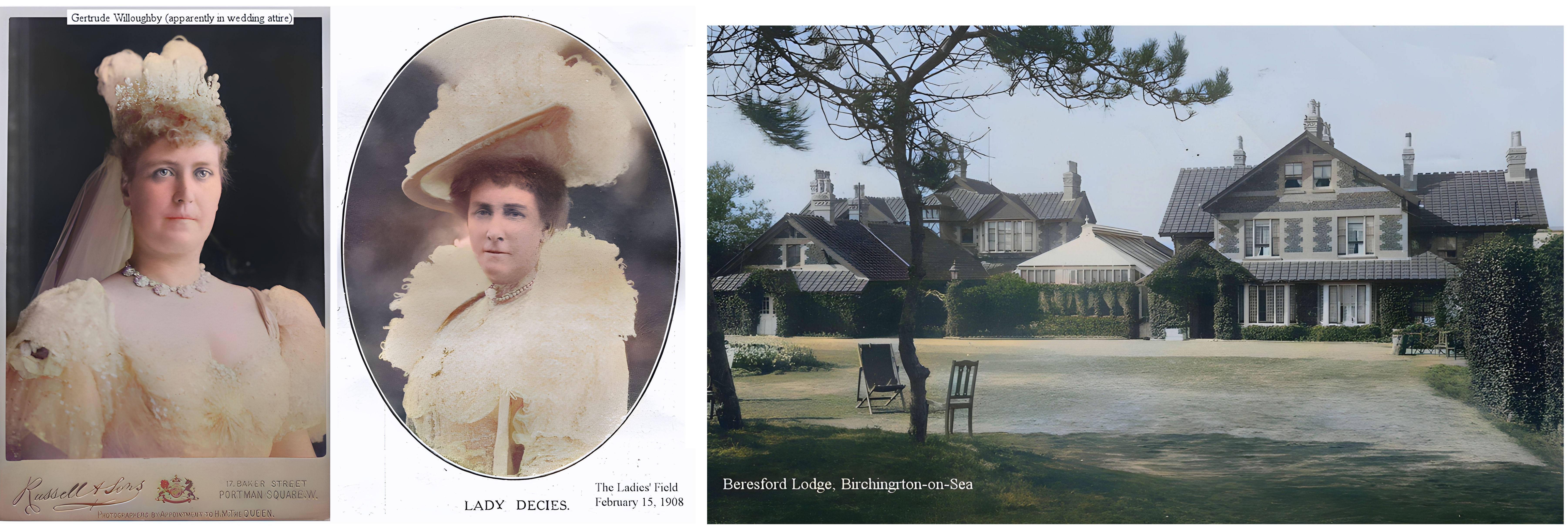
PROMINENT EARLY CAT FANCIERS - LADY DECIES (MISS GERTRUDE WILLOUGHBY)
Miss Gertrude Willoughby of Slough had already established herself as an important breeder (Fulmer prefix) before she married into a branch of the Beresford family and became Lady Decies (pronounced Dee-seez). Her married name became Maria Gertrude Horsley-Beresford. Early on, she established a significant cattery at Slough and had given one of her kittens to the Queen: Her Majesty [. . .] was pleased to accept a blue Persian kitten (which she kissed) from Miss Gertrude Willoughby. (The Times, July 20th, 1899).
She was the 2nd daughter of Sir John Pollard Willoughby, 4th Baronet, and his second wife Maria Elizabeth Hawkes. Their children included Maria Gertrude (1862 - 4 Apr 1939), Alice Anna (1856 - 1931) and John Christopher (1859 - 1918). Maria Gertrude was their last child and outlived her siblings and half-siblings. John Christopher Willoughby was to play a major role in his sister's bankruptcy. The family residence was Fulmer Hall, near Beaconsfield, Buckinghamshire, hence the Fulmer prefix used by his daughter.
Maria Gertrude Willoughby married William Marcus de la Poer Horsley-Beresford, 4th Baron Decies (1865 - 1910) , son of William Robert John Horsley-Beresford, 3rd Baron Decies and Catherine Anne Dent, on 12 March 1901. Nine years later she was a widow. Although they are usually reported as having no children, I found mention of a little son who died.
Her brother, Major Sir John Christopher Willoughby (born 1859), served in Royal Horse Guards. He was known for his interest in sports such as big game hunting in Africa, horse-racing and gambling and had been caricatured in Vanity Fair. He had paid the incredible sum of 8,600 guineas (over £1million in 2025) for the race-horse Harvester which dead-heated the 1883 Derby. It later turns out that he was relying on hand-outs from his sister who depleted her estate, and then took out loans, to pay off her brother's debts. In 1896, her brother appeared before the Queen's Bench for an offence under the Foreign Enlistment Act 1870 (Queen's Bench: R v Leander Starr Jameson, Sir John Christopher Willoughby Baronet, Henry Frederick White, Raleigh Grey and Charles John Coventry; preparation of a military expedition to South African Republic). Willoughby was sentenced to 10 months imprisonment, but was subsequently released and headed back to the Cape by steamer. John Christopher Willoughby - or rather his debts - played a major role in his sister's life later on.
Her relationship to the (in)famous Sir John was mentioned in various news articles in October 1900: "The National Cat Show, which recently closed at the Crystal palace, has been an event of interest to the women in London society. Miss Gertrude Willoughby took no fewer than ten first prizes. Miss Willoughby, who is the sister of the Sir John Willoughby who was connected with the famous raid, makes a hobby of her cats. Her 'catteries' at Fulmer are models of their kind." This was the botched Jameson Raid of December 1896 into the Transvaal where he was one of six defendants. In addition to cats, she was a very keen sportswoman and was among the number of women who ran their own horses.

An early report of her cats, and general involvement with breeding and training animals, comes from The Queen, dated 2nd June 1900, in their report of the National Bazaar in Kensington: Live Stock at the National Bazaar. No more interesting section of a bazaar can be found than the one devoted to livestock of all kinds, the pity being animals take up so much room that but few can be accommodated, and those of the smaller and more portable varieties. This was the case at the National Bazaar held last week in the grounds and buildings of the Royal Palace Hotel, Kensington, and owing to this lack of room sundry valuable offerings, including a couple of goats, a pony, a donkey or two, and a St Bernard dog had to be declined. The department had been suggested in the first instance by Miss Gertrude Willoughby and other prominent members of the National Cat Club. Then the president of the motion was the Duchess of Bedford, Miss Willoughby was the secretary, whilst as working vice-presidents there were Theresa Countess of Shrewsbury, Lady F. Gordon-Lennox, Viscountess Lady Julia Wombwell, Lady John Hay and the Hon. Mrs Harry Legge. All the animal., birds, and fowls were pinned by Spratt's, who not only did the whole of this work gratuitously, but sent one of their most trustworthy show officials to look after the stock and act as general assistant. The cats, which largely predominated, were well supplied with milk by the kindness of a Kensington dairyman; in fact, here, as in other parts of the bazaar, everyone who could render assistance even in a minor degree did so most willingly. During each day two handsome curly-coated poodles, Fulmer Nellie and Fulmer Via, owned and trained by Miss Willoughby, went through a clever performance, one playing the cymbals whilst the other skipped, and, as a small fee was charged to witness this interesting side show, a handsome sum was thereby realised. A chinchilla cat Fulmer Chang, a frequent winner at the leading shows, also appealed to the charitably disposed, and, on the opening day, when the tent was visited by the Princess of Wales , collected over 4 in aid of the fund, the appeal displayed on her pen being as follow: " Neither I nor my mistress are Irish or khaki colour, but we are deeply interested in the poor soldiers and sailors in Africa. Please give me something that I may add my mite to the fund." Few visitors failed to respond to the mute appeal . . . Mrs Inglefield (East Yorkshire Regt.) [sent] a very fine Persian cat, Mrs Balding several valuable kittens, whilst Miss Willoughby's personal gift to the stall included fan -tail pigeons, pedigree kittens, and Angora rabbits, all of which sold readily.. . . . In terminating a brief notice of one of the most interesting features of this great bazaar, mention may be made of those who readily assisted Miss Willoughby as salesmen and saleswomen. Among these were the Hon. Mrs Legge, Viscountess Coke, Lady John Hay, Miss Brenda Hay, Miss Dudley Ward, Lord Decies, the Rev. Read Davies, Capt du Maurier, Mr Powell Cotton, Mr Charles Dudley Ward, Mr Montague Elliott, Mr Robert Oppenheim, the Hon. Thos. Coke, and others.
Her future husband, Lord Decies is mentioned as one of those who assisted Miss Willoughby with the livestock at the bazaar. William Marcus de la Poer (Horsley-Beresford), Baron Decies was born in January 1865. He was a sporting man, kept racehorses, and was Master of the Thanet Harriers. He and his three brothers had all served in the South African War (the fund that the National Bazaar supported). Catty society wondered whether Lord Decies would indulge or even share this passionate interest of hers after the couple had married on 12th Mar 1901. It seems any fears were unfounded as Lady Decies managed two catteries, one at her usual residence at Beresford Lodge, and the other, formerly her Slough cattery, at her summer residence at Birchington-on-Sea. In 1903 (Our Cats, December 19th) they could breathe a sigh of relief upon learning that Lord Decies also had a warm interest in his wife's hobby of cats. Newspaper reports after his death referred to him as being devoted to his wife.
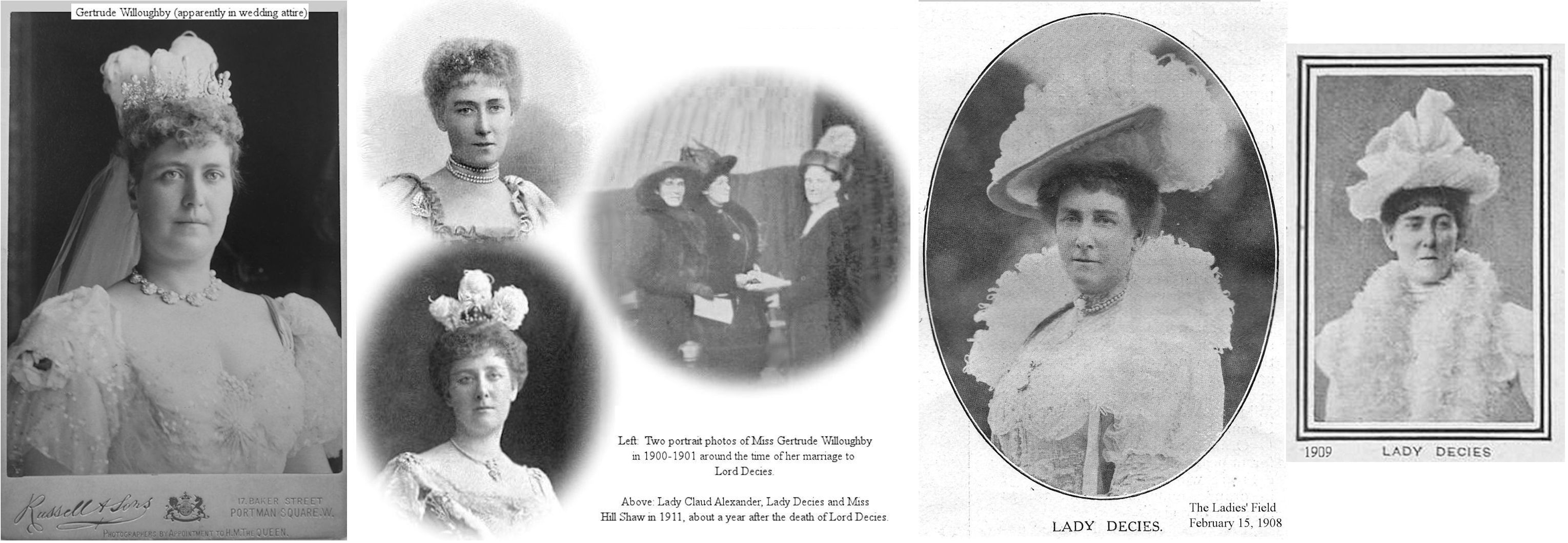
A Lavish Wedding
Maria Gertrude Willoughby, 2nd daughter of Sir John Pollard Willoughby, 4th Baronet, married William Marcus de la Poer Horsley-Beresford, 4th Baron Decies (1865 1910) , son of William Robert John Horsley-Beresford, 3rd Baron Decies and Catherine Anne Dent, on 12 March 1901. It was to be a tragically short marriage and though she is usually reported as having no children, I found mention of a little son who died. As Lady Decies, she was the chief organizer of The Ladies Field Club, based in London. The committee was formed almost entirely of titled women, of whom Lady Decies was the moving spirit.
Her wedding was a lavish society event, as the following description from the Herne Bay Press, Saturday 16th March, 1901, shows.
MARRIAGE of LORD DECIES MASTER OF THE THANET HARRIERS. On Tuesday afternoon at St. Michael's, Chester-square, took place the marriage of Lord Decies (fourth Baron) and Miss Maria Gertrude Willoughby, daughter of the late Sir John Pollard Willoughby, Bart., and of Lady Willoughby, of Fulmer Hall, Bucks. She was given away by her brother, Major Sir John C. Willoughby, present Baronet, and was followed by a train of bridesmaids, all children. They were Miss Marigold Forbes, Miss Honor Leigh and Miss Enid Ward, cousins of the bride, Miss Violet Barclay, niece of the bridegroom, Miss Irene Harvey and Miss Diana 13ukeel. The bride, who is tall and fair, looked very handsome in her beautiful bridal gown of ivory satin embroidered in pearls and silver, and trimmed with such exquisite old Honiton [lace] as is rarely seen nowadays. The transparent silver train was trimmed with chiffon and orange blossoms, and a coronet of the hymeneal flowers was worn in the hair under a tulle veil, fastened in with a diamond bird, one of the bridegroom's gifts. The little bridesmaid's dresses were all white, the frocks being Indian muslin over soft ivory satin. Silver sashes caught them in at the waist. They wore white chiffon hats trimmed with ostrich feathers and silver buckles. Each little maid carried a silver wand tied with clusters of lily of the valley, and wore a gold locket with diamond and turquoise centre, the gifts of the bridegroom.
The service was fully choral, and was conducted by the Rev. Canon Fleming, Vicar of St. Michael's, and the Rev. T. Bridges, and the Rev. Arthur Irwin, uncle of the bridegroom. Captain the Hon. Graham Beresford acted as best man. The church was beautifully decorated with palms and white flowers, and the bride carried a magnificent bouquet of rarest exotics, with long showers of blossoms, the bridegroom's gift. Among those present were the Duchess of Montrose and Lady Hermione Graham, the Duke and Duchess of Somerset, the Marquis and Marchioness of Breadalbane, the Marchioness of Hastings, the Marquis & Marchioness of Waterford, Lady Susan Beresford. Lord and Lady Robert Bruce, Lady Decies, Lord and Lady Frederick Bruce, Lord and Lady Lurgan, Lord and Lady St. Leonards, and the Hon. Hilda Sugden, Lord and Lady Coke, Lord & Lady Edward Spencer Churchill, and the Misses Churchill, Lord and Lady Walter Gordon-Lennox, Lady Annaly, Mr. George Forbes, Mr. Keith Fraser, Mr. George Bulteel, Sir George and Lady Macpherson-Grant, Lord and Lady Maitland, Lady Muriel Paget, Lady Arica Thynne. After the ceremony the guests adjourned to Grosvenor-gardens, where Maria, Lady Willoughby, held a reception. Here the presents were on view and much admired, the quaint-looking gong, made from a Mafeking shell, being specially commented on. It looks like a copper can, and has the words "Mafeking, 1899 - 1900," inscribed upon it. It is a present from the bride's brother, Sir John Willoughby. The other presents include Brussels and Honiton lace, gold fitted workbox, an elaborate statue, alai several richly jewelled rings and bracelets from the bride's mother; many handsome diamond ornaments, in addition to a piano and a brougham from the bridegroom; a diamond tiara from Sir John Willoughby, as well as a travelling bag with silver-gilt fittings; tea urn and jewellery from Lady Decies; presentations from the villagers, school-children, and servants at Fulmer Hall, Bucks, and Beresford Lodge, and a massive silver tray from the Thanet harriers, of which Lord Decies is Master. There are presents from the Duke and Duchess of Montrose, the Duke and Duchess of Somerset, the Marchioness of Breadalbane, the Marquis & Marchioness of Waterford, and Lord Greville, all of whom are relatives of the newly-married pair, who left in the afternoon for Dover, route for Paris. Lady Decies' going away dress was grey cloth and panne, trimmed with silver. Her bat was grey chiffon and ostrich feathers. She wore a long grey cloth coat embroidered in white.
The Gentlewoman, July 5th, 1902, also mentions her husband's status: LADY DECIES, who was so looked to for arranging the cafe chantant at the grand Coronation Bazaar at the Botanical Gardens on July 10th, is well known for the great interest she takes in all charitable functions. She was married last year to the fourth Lord Decies, and is a sister of Sir John Willoughby, formerly of the Blues, who has served with much distinction in many campaigns and commanded the unfortunate Jameson Raid in 1896. Lord Decies is the head of a younger branch of the Marquis of Waterford's family.
The Halifax Comet, June 21, 1902: It is seldom that anyone devoted to cats is fond of dogs, but Lady Decies, whose niece, Miss Evelyn Moreton, recently married Colonel Byng, is an exception to the rule. Lady Decies is a sister of Sir John Willoughby, and possesses some of the most valuable Chinchilla, Siamese and Persian cats in Europe. The catteries at Beresford Lodge are in fact no less elaborately appointed than the kennels, which is saying a good deal, seeing that Lord Decies is master of the Thanet Hunt, and is connected with the Beresford family. Each cat has a separate apartment, with cork carpet, and specially designed beds. Exercising ladders are also provided, and at least two or three attendants are kept to attend to the many wants of these animals.
Like many men of his class, Lord Decies was a keen dog fancier and sportsman. He was master of the harriers, and though greatly attached to his stables and kennels, he did not look upon the cat as an inferior animal. In fact, he had bred cats himself for 15 years, and had a number of other small pets, ranging from cage-birds to a mongoose! However, the couple favoured cats and displayed their many trophies and paintings around Beresford Lodge.
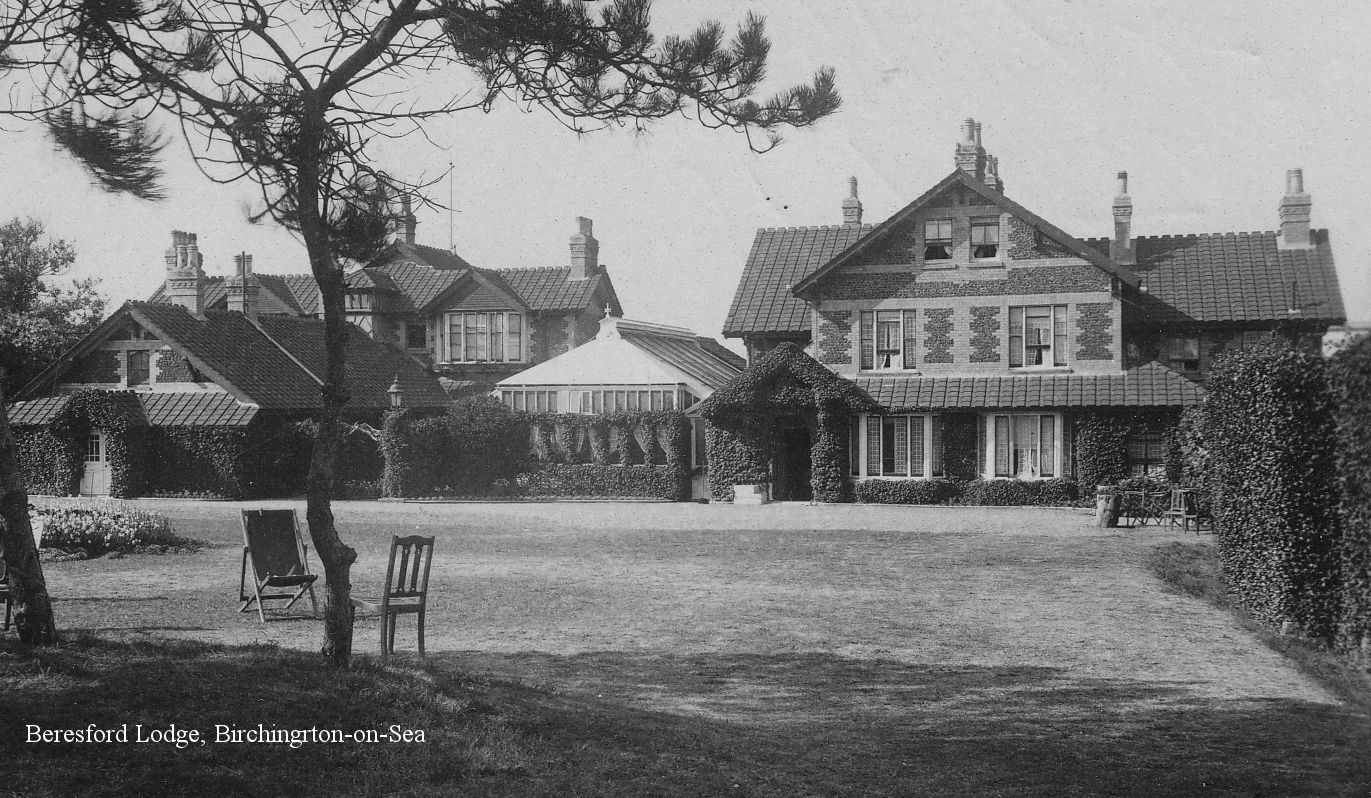
Lady Decies was the chief organizer of The Ladies Field Club, based in London. The committee was formed almost entirely of titled women, of whom Lady Decies was the moving spirit. On Monday 27th April, 1903, she opened the Ladies Field Club, described in the press as a promising new social institution for sportswomen, with a brilliant gathering of men and women well known in the field of sport. The club was situated at 32, Dover Street, Piccadilly (the old premises of the Empress Club) and opened with a reception attended by fashionable company. She received the many guests, assisted by Mrs. Kinglake (founder and club secretary). The committee members included the Countess of Aberdeen, the Countess of Limerick, the Countess of Stradbroke, the Countess De La Warr, Lady Helen Vincent, Lady Decies, Lady Fingall, Lady Hilda McNeill, Lady Adela Cochrane, and Lady Edith Villiers. Lady Decies had given some time to getting up an interesting entertainment for the opening ceremony. Guests at the opening reception included the Duke and Duchess of Somerset, the Duke and Duchess of Montrose, Lord and Lady Edward Churchill, Sir Evelyn Wood and the Hon. Mrs. Southwell FitzGerald. Popular favourites like Madame Belle Cole, Miss Helen Mar, Mr. Charles Capper, and little Clarisse Heney being among the artistes appearing. Mr. J. M. Morris, who assisted Lady Decies at the cafe chantant at the Coronation bazaar she so successfully organised, has acted as stage manager.
The rooms of the club were handsomely decorated, The members' dogs and other pets were catered for in snug basement kennels with their own attendants. There were special facilities for fencing, a members' four-in-hand coach, a houseboat for Henley Regatta week, a billiard room "with walls and furniture of dull green", a card room, a summer lounge, a hairdressing saloon, a smoking room and bedrooms for the use of members. The coach ran to Hurlingham and Ranelagh during the season and to other places of interest within driving distance. The newest and best inventions in the shape of motor-cars were also available. Great care was paid to the cuisine and choice of wines. The annual subscription was £4 4s (4 guineas) limited to a small number, and once that number was attained the fee was raised and an entrance fee charged. The fee for overseas members - who would only use the club facilities when they came to England - was £1 1s. (Belfast News-Letter, 27th April 1903, Morning Leader, 28th April 1903, The Tatler, 6th May 1903, South Wales Daily News, 6th December 1902 and numerous others.)
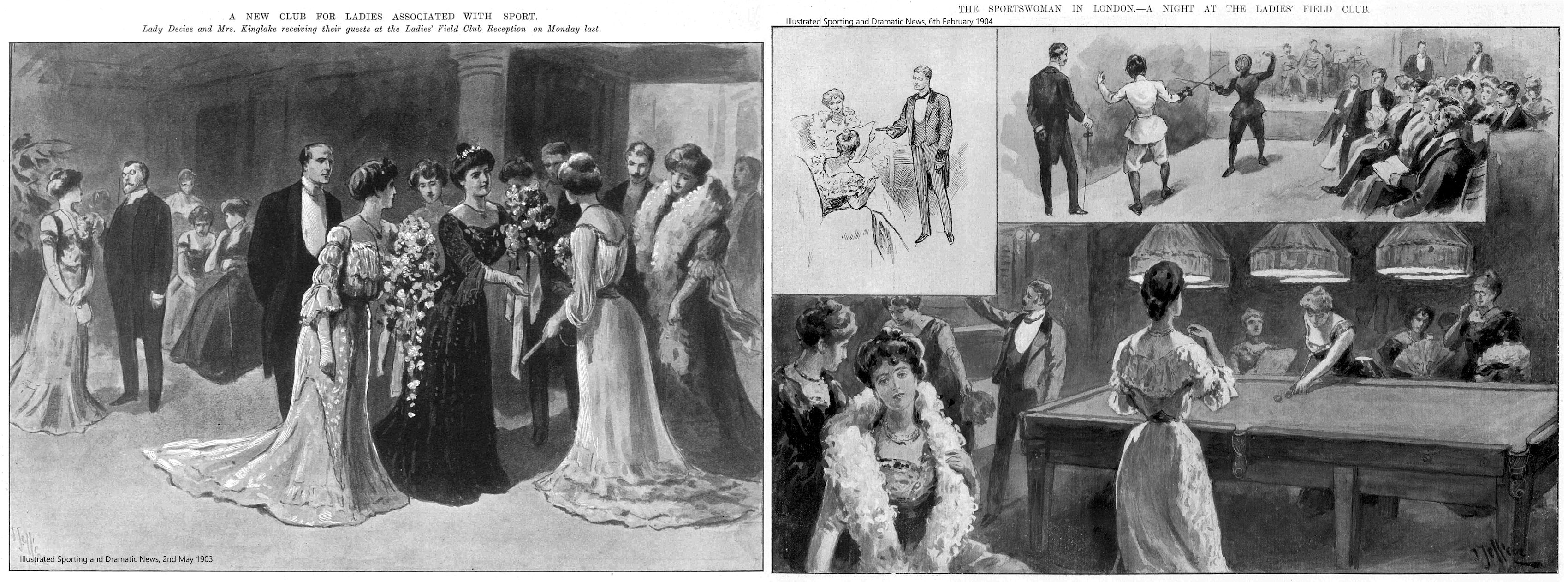
As members of the aristocracy, Lord and Lady Decies attended and hosted social events for their peers, for example this society ball: "The ball which takes place to-morrow night at Stoke Park, near Slough, promises to be most successful, and over three hundred tickets have been sold. Lord and Lady Decies will receive the guests in the name of the committee, and are bringing a large party with them from Sefton Park. Stoke Park had recently been acquired as a golf club, and the beautiful place is made into a delightful resort which promises to be very popular. Arrangements have been made for people coming down from London to attend the ball, and motor 'buses will await the guests at Slough Station, and a special train at three o'clock will bring them back again to London." (Daily Mirror, 11th November, 1909)
They also hosted garden parties, sometimes in aid of charitable causes, for example: "Lady Decies has issued invitations for a garden-party at Slough on Monday next to benefit the funds of the Church Army League of Friends of the Poor. Lady Decies, before she married, lived with her mother, Lady Willoughby, at Fulmer Park, where she had a famous kennel of dogs and cats. She and Lord Decies now live at Sefton Park, Slough." (Daily Mirror, 16th July, 1907)
Fetes and fairs were another favourite for the wealthier classes, for example a July Fair held in the Botanic Gardens, Regent's Park on the 13th and 14thJuly. Held for a charitable object, it was set up to resemble a gipsy encampment with caravans. The Marchioness of Donegal was in a caravan festooned with baskets, the Countess of Orford was a hawker of baskets, Lady Decies was a flower seller and Lord Decies was a "humane and attentive donkey-driver." Other well-known (i.e. society) ladies ran a cocoanut shy, boiled kettles and prepared meals for travellers. (Daily Mirror, 31st March 1906). All in all, the leisured participants got to dress up, play at gipsy travellers and feel good about it because they were raising money for a charity!
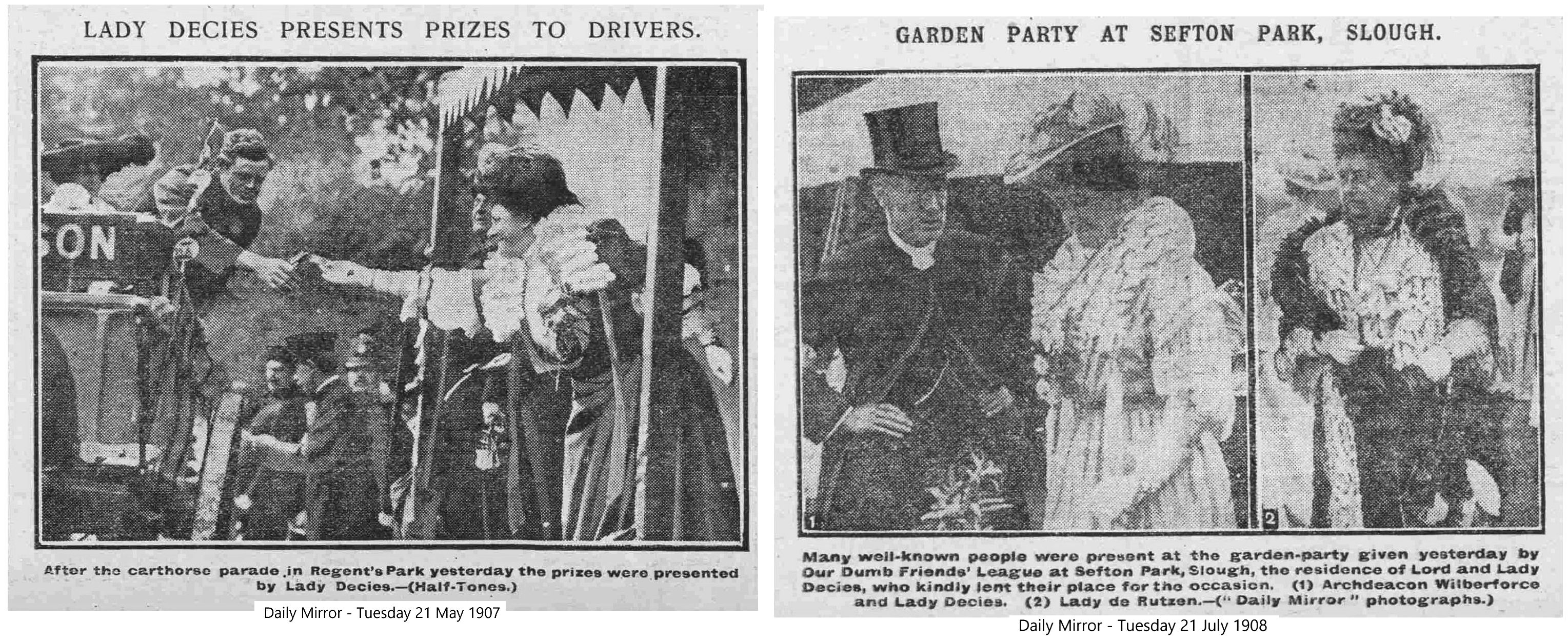
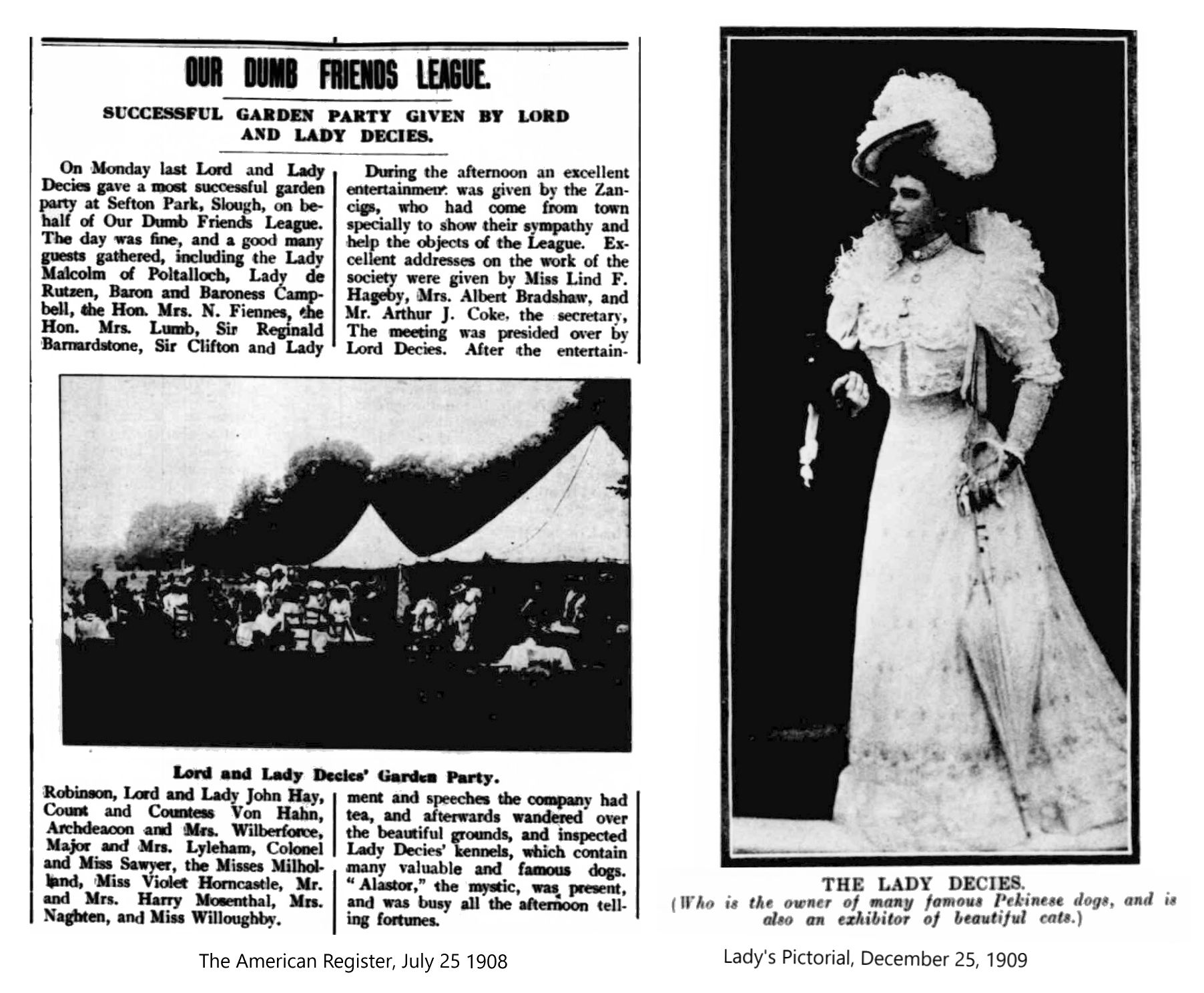
Opening buildings was another part of the social calendar and in February 1907, Lady Decies opened the Dumb Friends' League cat shelter at 906, Fulham-road, Whitechapel.
And in 1908, Lord and Lady Decies went to Biarritz for two or three months. They had both been laid up with sever attacks of influenza and hoped that the change of air would be beneficial (Daily Mirror, 20th November, 1908). Less than 20 years later, the widowed Lady Decies would be bankrupt and waiting on customers at her tea-shop as well as running a boarding kennels.
It seems that she had always had an affinity with all animals. According to the Daily Mirror (23 August, 1930) she was one of those people who possessed the gift of taming all animals and was at home with Dartmoor's wild ponies and with penned sheep in the market place. According to the report she told a story about a cat that she had tended for its broken leg. She didn't see the cat again until the end of its 20 year life, when it was dying, and it "raised its head and looked at her in token of acknowledgement."
Her life suffered a series of reversals after the death of Lord Decies, just nine years after their wedding, and her various ventures are described more fully in later sections. It was a riches-to-rags story. In brief, she had a good financial inheritance from her late husband, and though she didn't inherit the houses (which passed to the 5th Baron Decies), she was able to purchase a mansion house. Unfortunately, most of her money went as hand-outs to her ne-er do well brother and she had to take out loans. Her business ideas were not always in tune with public demand, probably due to her previously privileged life. Her Continental-style Hotel was aimed at wealthy clientele but was unable to get an alcohol licence. Her rabbit breeding scheme was in the wrong location. Her dog hotel was aimed at wealthier clients and also trained kennel maids, but was there really a great demand for expensive dog boarding and kennel maids? She also tried a hat shop, but the demand for hats was waning as more people travelled by motor vehicle. She ran a ladies' hairdressers from a small cottage. Bankrupted, she made a living running a tea-shop/village shop, although the tea-shop relied on the passing trade of cyclists, which died off in the colder months. Eventually she became a wartime nurse and few of her soldier patients knew that "Nurse Molly" was a titled lady. She was a good-hearted woman who (unlike her brother) didn't ask for hand-outs from richer relatives.
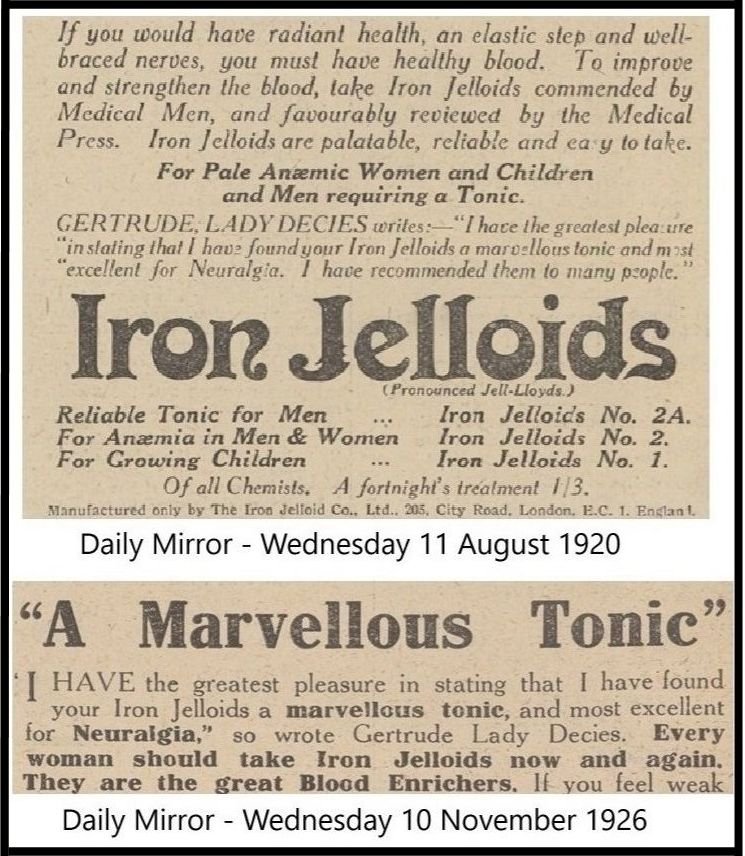
In the 1920s, she was also trading on her name. She endorsed Iron Jelloids, a blood enricher for "pale anaemic women and children and men requiring a tonic." These were a popular iron tonic with 3 formulations (No 2A also contained quinine and was recommended for soldiers).
By April 1925, according to the Daily Mirror (18th April, 1925) she had settled into a new home at Chiddingfold, Surrey and was preparing to train girls to be perfect kennel-maids. At the end of twelve months' training she hoped to give them certificates as to capability and to find each girl a situation. The Daily Mirror appeared sceptical, but thought that Lady Decies' recommendation should have weight. Twelve months seems a long time for training a kennel maid, but there was more to the story as the same newspaper wrote (11th December 1925) that it was Lady Decies who first thought of the possibilities of a dog's hotel where people could leave their pets while they went away on holiday. At the time of this later report she was incapacitated by the traffic accident in the fog in London and was unable to be at the dog's hotel in Chiddingfold in person, but it was fully equipped and efficiently staffed and would not suffer from her temporary absence.
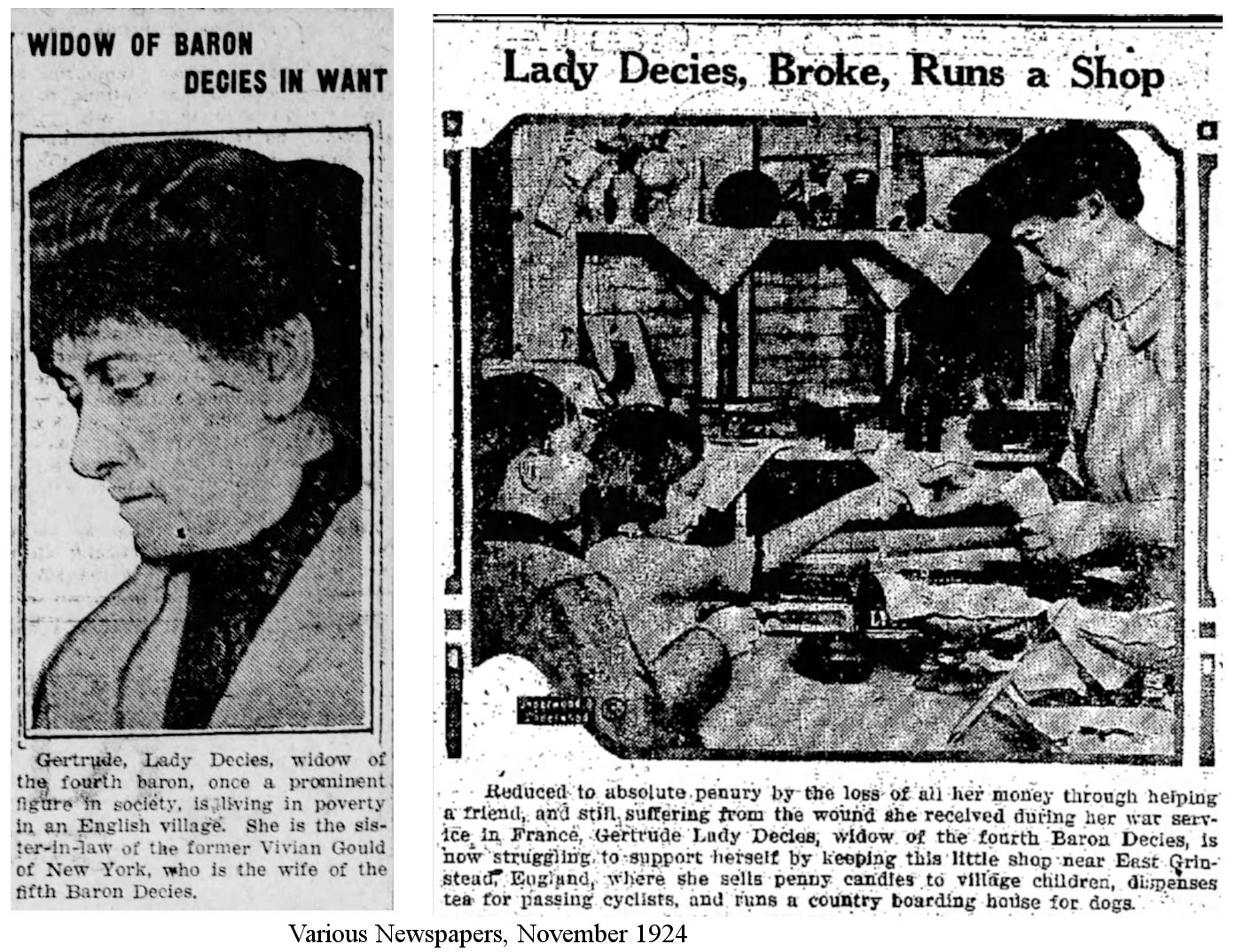
In early December 1925, thick fog descended on London, causing numerous traffic accidents and injuries. Seventeen buses and tramcars were involved in accidents in London and Lady Decies was one of those involved in a crash. The London Evening Standard (4th December, 1925) reported on many of the incidents, especially where members of high society were involved. "Gertrude Lady Decies was seriously injured in an accident involving her taxicab and four buses just outside the main door of the Crystal Palace today. Lady Decies was cut by flying glass from the windscreen of her taxicab, and had a wound in her scalp requiring six stitches. She was immediately conveyed to the Norwood Cottage Hospital where she was operated on by Dr. Scott Turner. Lady Decies was going to the Palace to attend the Ladies' Kennel Association Show, and was accompanied by several dogs and a maid.
Mr. W. Roberts, the driver of the cab, described to an Evening Standard representative how the accident occurred. 'I was going along pretty slowly on my right side of the road,' he said, 'when a No. 3 bus loomed out of the dense fog. The driver could not avoid hitting the cab. Then the bus skidded round and hit us n the back. The glass of the windscreen was smashed to atoms . . . two buses going towards Crystal palace station and another going in the opposite direction were unable to stop in time to avoid collision with the other bus.'
A medical man who was the only occupant of the bus which first crashed into the taxi and who was himself unhurt, rushed to the taxi, where he found Lady Decies in the cab. She ha been thrown by the impact across the lap of her maid, and was bleeding from a large gap [gash?] in the upper part of her forehead. In the cab were also three dogs which Lady Decies was taking to the show, but they were apparently unhurt. The maid also escaped injury. Lady Decies was taken into the office in the goods yard of the Crystal Palace and was there treated by Dr. Scott Turner, a local practitioner. After he had rendered first aid, lady Decies was removed on a hand ambulance [a wheeled stretcher] to Norwood Cottage Hospital. Late this afternoon Lady Decies, who will probably spend the night at the Norwood Cottage Hospital, was progressing favourably. Lady Decies' injuries are regarded as somewhat serious, although fortunately she did not lose consciousness and did not lose much blood." The crash involved 4 buses and the taxi, and almost completely blocked the road.
On 5th December, 1925, the Westminster Gazette reported "The Ladies' Kennel Association Show at the Crystal Palace. Gertrude Lady Decies, who had motored down with her maid and a store of dogs' jumpers for her stall at the [Dog] Show, was run into by a bus and cut across the face by broken glass, so that she had to be taken off then and there to Norwood Cottage Hospital."
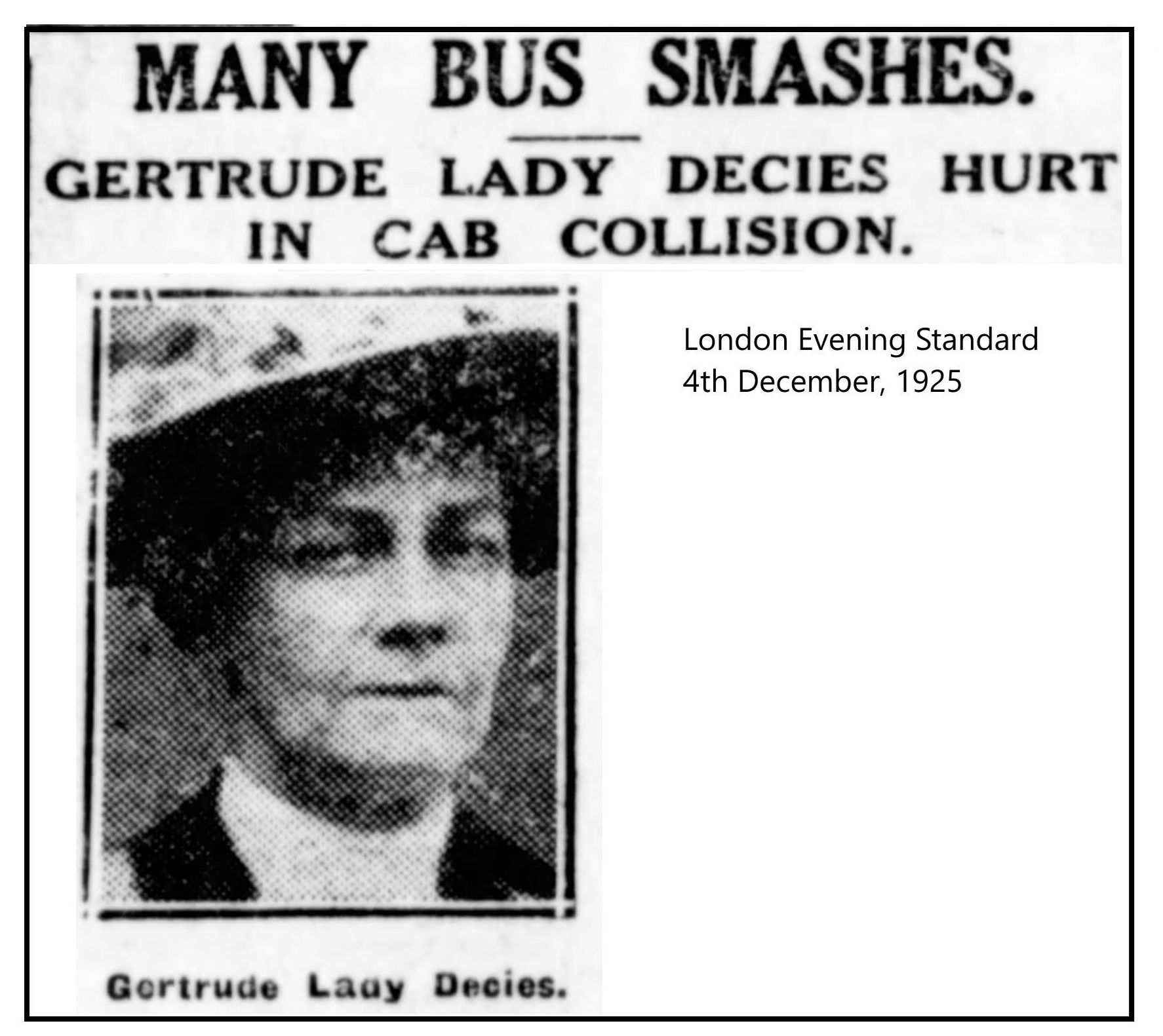
In January 1926, she was interviewed about women participating in sports. This was a rather new thing in society and it had been suggested that the modern English girl who indulged in sports and athletics would neglect her dress and personal appearance and generally become unladylike. Lady Decies replied that this was far from being a fact. "Watch girls playing games," she averred, "They are invariably neat and tidily turned out."
In September 1927, she was a witness of sorts to the infamous murder of police constable George Gutteridge at Stapleford Abbotts (a village between Ongar and Romford). This account is taken from the Western Daily Press (28th September, 1927): "Gertrude Lady Decies Heard Shots. A statement made by Gertrude Lady Decies to the effect that she was awakened from sleep by revolver shots shortly before 4 a.m. yesterday, and rose from her bed to see a car flash by her house, is being investigated by the police. She is the owner of the Beresford Tea Gardens, which are a short distance from the scene of the shooting. She is inclined to the view that more than one man is responsible for the death of Gutteridge. Gertrude Lady Decies, who is the widow of the fourth Lord Decies, and a daughter of the late Sir Pollard Willoughby, Bart., set up tea gardens on the Brighton road near East Grinstead, as long ago as the summer of 1924, and the extension of her business to an Essex roadway is a proof of the success of the venture. She was wounded when rendering war service in France, and had to flee from Russia when the revolution broke out . . . Gertrude Lady Decies paid a visit to the widow of P.C. Gutteridge yesterday afternoon and stayed with her some time"
In 1929, The Daily Mirror reported on Gertrude Lady Decies' pet goose, Jonathan. She had bought two geese, David and Jonathan, at Romford market in September 1928, intending to raise them for Christmas dinner. Johnny developed too much intelligence and, at two months old, he could be picked up and would wrap his neck around hers like a feather boa. He became a pet and could obey commands to dance, kiss, bow and speak, the speaking being grunts. He also followed her like dog and when she didn't notice him he pulled at her skirt until she patted him. (Daily Mirror, 1st May, 1929)
In 1930 she had two articles published in The Girl's Own Paper, Volume 51: Pity the Rough Diamond (pg 65) and Gestures the World Never Sees (pg 609).
It seemed that she was also a good cook. She cooked the cakes for her tea-shop and the Daily Mirror (21st July, 1930) reported her to have a light hand with pastry. The same publication (17th December, 1930) said she had invented a new dish for the fashionable luncheon parties then in vogue: cheese custard served in dainty cases of pastry topped with iced cream cheese shapes cut out in animal form. Another invention was a breakfast dish of ordinary kippers, mixed with rice and spiced, and served in the shape of ducks. The report omitted to say that this was kedgeree, minus the hard-boiled eggs! The cheese custard in pastry sounds like cheese quiche decorated with cream cheese icing.
In July 1932, 70 year old Lady Decies suffered a heavy fall at home and suffered a broken arm, shoulder blade and facial injuries. She had been entertaining some Boy Scouts at her flat in St. George's Square, Westminster and had gone to fetch some strawberries when she tripped over a stool. One of the Scouts rendered first aid while the other summoned a doctor. She required an operation. This was reported in numerous papers although several referred to Gertrude Lady Decies as the as the mother of the fourth Baron, rather than his widow.
In 1934, there was an interesting court case over the custody of her parrot. This report is from the Independent Press and Chronicle (Saffron Walden, Essex, 19th October, 1934).
TITLED LADY'S CLAIM. Parrot to be Returned to Her. STORTFORD DISPUTE.
A parrot which was stated to "talk beautifully" figured prominently in a case before his honour Judge H.G. Farrant at Bishop's Stortford County Court on Monday. James Cooper, Spellbrook Farm, Bishop's Stortford, claimed £17 6s 8d. for storage of goods and keeping a parrot from Lady Maria Gertrude Decies, 73 St. George's-quare, London, and there was a counter-claim for the return of goods (including the parrot). Mr. W.J. Gee was for the defendant and Mr. H.S. Tee for the plaintiff.
James Cooper said he took possession of the farm in 1930 when Lady Decies was there, and it was agreed that she should stay as a lodger. At the end of March, 1931, there was a conversation about Lady Decies leaving and discussions took place as to her furniture. She put some of the stuff in the spare room and asked him to keep it until it was convenient for her to take it away. There was plenty of room in the van for it but Lady Decies did not want them to be broken. No definite time was mentioned for her to take the things away. No fixed price was made. The goods ere still there and Lady Decies had never made an application for them. The arrangement was made in one sitting room and was generally talked over. Among the things left over was a parrot which he was asked to look after. The food cost 1s. a week and witness paid for it and Lady Decies settled up for it while she was there. He fed the parrot because it bit Lady Decies' fingers. Once his wife asked Lady Decies if she would give her the parrot and she said she would not for any consideration as it was the property of the late Lord Decies. The water lilies referred to died years ago.
In April Lady Decies came down and said she would take the things away when it was convenient. In August, 1931, he saw her in London and he had written to her. Later in 1933 when he saw her she was going to India, he wrote again and had a reply from India saying she would come down and fetch the things. He told her it would cost 1s. a week for feeding the parrot and 1s. a week for storage.
He has various offers to settle but would not accept. He had never kept the goods back; they were free for Lady Decies to fetch at any time. Then he had a letter from the solicitors stating that he had not looked after the goods properly; there was no truth in that statement.
Cross-examined, witness said the goods were not left because there was no room in the van. The water lilies were alive when she left but died afterwards. Until September 1931, Lady Decies kept dogs at the farm and 30s. a week was paid for them. He did not say to Lady Decies "Will you give the parrot to me" and she did not say "No, it belonged to Sir John Willoughby, my brother, who is dead." They got attached to the parrot, but Lady Decies did not say "If you will pay for the keep I will leave the parrot."
Sidney Cooper, son of the plaintiff, said he heard the discussions about the parrot and agreed with his father's evidence about them. Lady Decies asked them to look after the parrot. Plaintiff's daughter-in-law corroborated and said Lady Decies begged her to look after it.
Lady Maria Gertrude Decies, 73, St. George's-square, London, said that in March, 1931, she was lodging at the farm and then left to look after her sister. There was no room in the van for the articles mentioned in the claim but Mr. Cooper volunteered to look after them, and when she asked him what he would charge he said they would settle that later. She had had the parrot about 20 years, and it talked beautifully. Mrs, Cooper and her daughter-in-law asked her to leave the parrot as they were all so fond of it. Then Mr. Cooper came in and asked her to give it to him but she refused. She was loath to leave the parrot. She asked who would pay for the food, and Mr. Cooper said, "Of course we will." For six months after she left there was a rent paid for the dogs but there was never any suggestion that she should pay for the parrot. Mr. Cooper wrote to her in India demanding payment, but she tore the letter up in anger. She had made enquiries and found the value of the parrot was £30.
Cross-examined, witness said she did not expect to pay for the storage but was going to give Cooper a present. With regard to the parrot, Cooper, Sidney Cooper and his wife were all mistaken. She did not expect to leave the parrot for long.
Mr. Tee: Did you expect them to go on looking after this parrot year after year without any payment and then go down and take it?
His Honour: You are not taking into consideration the amenities of life which would be added by the society of the parrot.
Lady Decies: I never thought at all. I have had nothing but trouble for the last three years. Three years ago my sister [Alice Anna] died; then I collapsed and was laid up for a long time. Then I started treating people for nerve trouble and while I was doing that a maniac hit me breaking my shoulder. Then I fell down, and nearly broke my leg.
Mr. Tee: Although you liked the parrot you left it behind for 3 and a half years.
Witness: Yes, by misadventure.
His Honour said he found for the plaintiff on the claim for £6 18s., for three years storage of furniture,
With regard to the parrot the probabilities, in his view, were in favour of Lady Decies of what actually took place and he found that the parrot was left with the Coopers for their delectation and Lady Decies was never under any obligation to pay Mr. Cooper in respect of its maintenance. With regard to the counter claim he would make a formal order for the return of the goods as there had been a technical retention. He made that order without costs. "I am satisfied that the water lilies died from natural causes," added His Honour.
Mr. Gee: The return of the goods includes the parrot?
His Honour: Oh yes.
Lady Decies' Cats
Both as Gertrude Willoughby and as Gertrude Lady Decies she was famous for her "Fulmer" prefix Persians. As Gertrude Willoughby, she established a significant and successful cattery at Slough. She bred many prize-winners and had given one of her kittens to the Queen: Her Majesty [. . .] was pleased to accept a blue Persian kitten (which she kissed) from Miss Gertrude Willoughby. (The Times, July 20th, 1899).
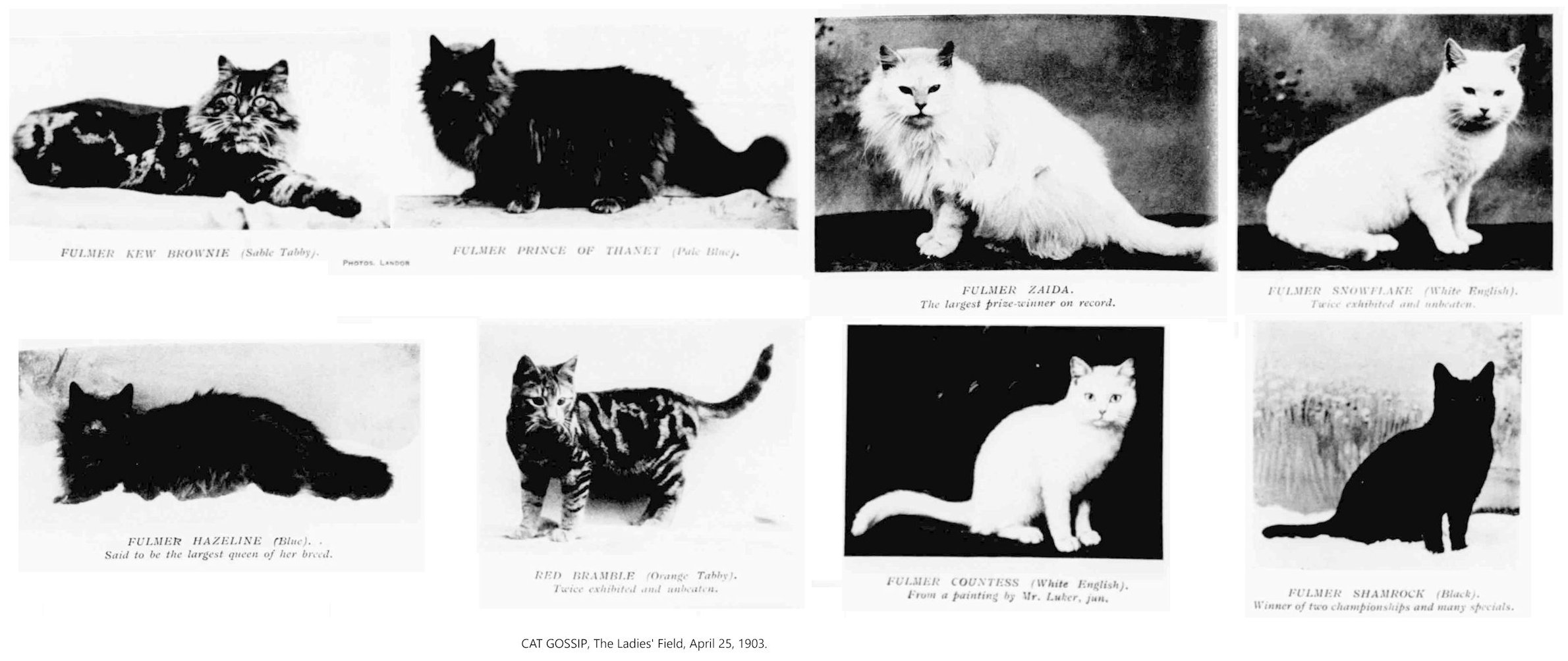

Luckily Lord Decies was also an animal lover and did not discourage her. One of her most famous cats was the beautiful female chinchilla, Champion Fulmer Zaida who was valued at £2,000 at the 1906 Crystal Palace show. The Fulmer prefix came from the Willoughby family home at Fulmer Hall, Buckinghamshire. Later she established a magnificent cattery at Lord Decies' seat at Beresford Lodge, Buckinghamshire. As far as possible, she fed for the cats personally and they were fed succulent meat and milk puddings that would make a human's mouth water. If one of the cats became ill it went to a hospital area until it either recovered or died. A cat attendant washed the cats' faces in the morning and brushed and combed them. The cats also had access to a verandah and shaded exercise grounds, and were not allowed to walk in the sun as that would cause their coats to fade or become discoloured. Her catteries were featured in Frances Simpson's "Book of the Cat" and various cat fancy publications.
The Leavenworth Times of October 8th, 1902 provides more information on Lord and Lady Decies' animals: "DEVOTED TO ANIMAL PETS. English Woman of Title Cares for Cats, Dogs and Bullfinches. Lady Decies, one of England's most popular women of rank, who only last year became a bride, is a noted cat fancier. She is an energetic lady, who does nothing by halves, and her Chinchilla and Siamese pets are housed and taken care of in the most luxurious way. The catteries at Beresford lodge, Birchington, Lord and Lady Decies seaside place, are novel features, which were designed by Lady Decies herself, who has a large share of the inventive and creative faculty, in which the average woman is supposed to be so deficient. Each room hae a fireplace and cork carpet and ladders by which the fortunate animals mount to their beds. Their toilets and menus are attended to by domestics specially told off for that purpose. Lady Decies, who is a sister of Sir John Willoughby, has a clever performing dog, and she also possesses a large aviary, where some bullfinches have been taught to perform a number of tricks. As a debutante Lady Decies distinguished herself by making some ingenious toys and puzzles, which had a great success and brought her in a good deal of pin money. Now she devotes herself to an outdoor life and the care of her small menagerie, and is only seen in London occasionally, though she finds time to carry out much unobtrusive philanthropy."
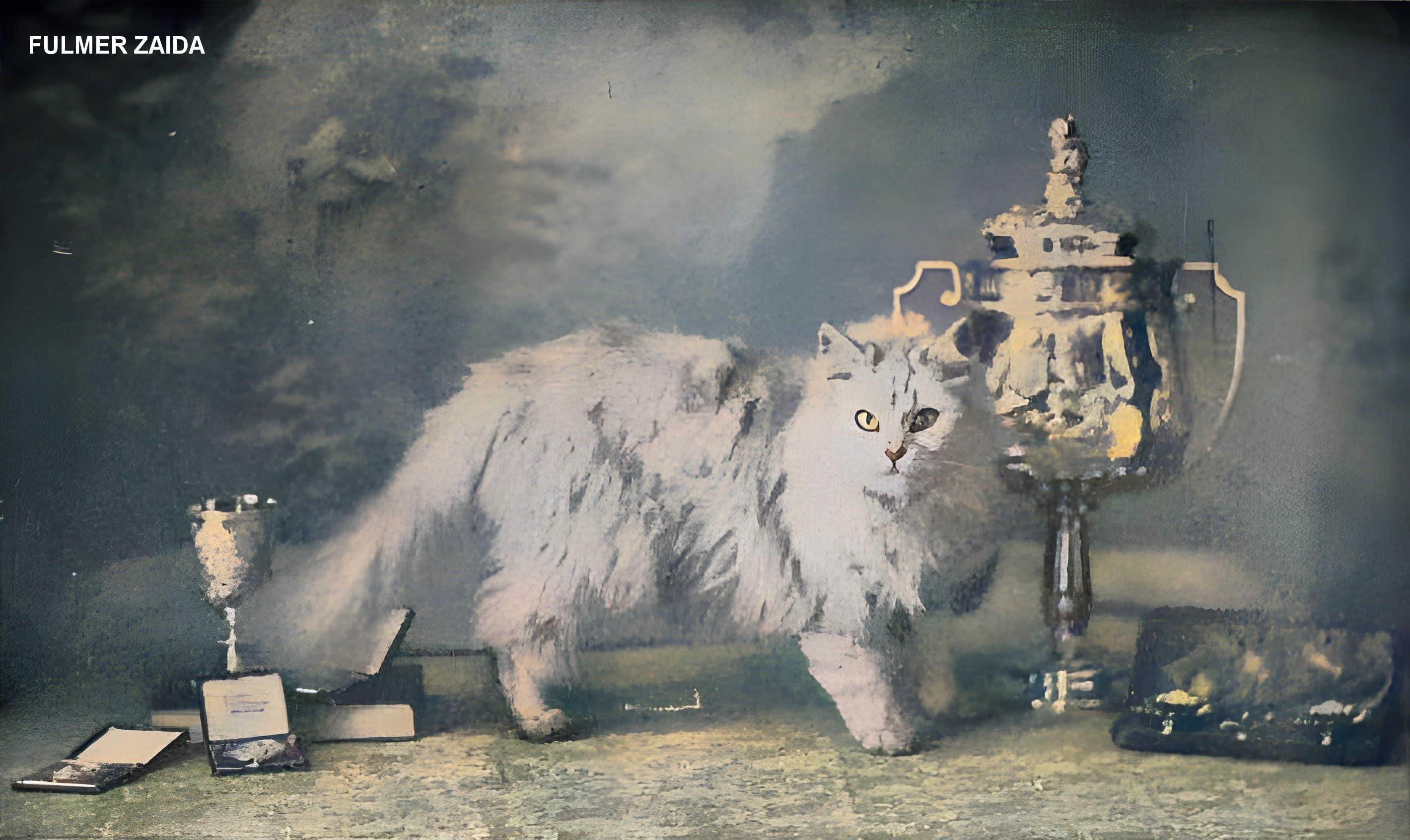
LADY DECIES' CATS - The Saint Paul Globe, May 26, 1903: Lucky is the cat who falls into the hands of Lady Decies, considered by many to be the most successful exhibitor of long haired cats in England. Lady Decies has built a six-room cottage adjoining Beresford Lodge, her house, and here most of her cat colony is housed in winter, while there are outbuildings, with large runs attached, for the others. Each cat sleeps alone, and her sleeping apartment is a box, to insure safety against draughts. In winter the bedding is straw; in summer a piece of carpet. The cats have an attendant of their own, and she has a lad to assist her. There is a good deal of grooming and titivating to be done for the cats, for, although there are only about fourteen of them, each little person must be well combed each morning, while its nose and eyes are well sponged with warm water, or, frequently, with boracic acid. For fear of fading their coats, none of the cats are allowed out in the sun in hot weather. They are either shut up in the house or let loose in one of the shaded runs, the roof of which is painted green, to throw a cool light. For wet weather there is a large conservatory, which is used as an exercise ground. Some people would say that is was wicked to lavish so much care on a parcel of cats, where so many Christians are neglected. But, of course, any cat lover would retort that a nice cat is a Christian. At all events, the cats, dogs and parrots at Beresford Lodge are the best of friends, and the parrots would be pleased to let the cats share their cages if the cats cared to do so.
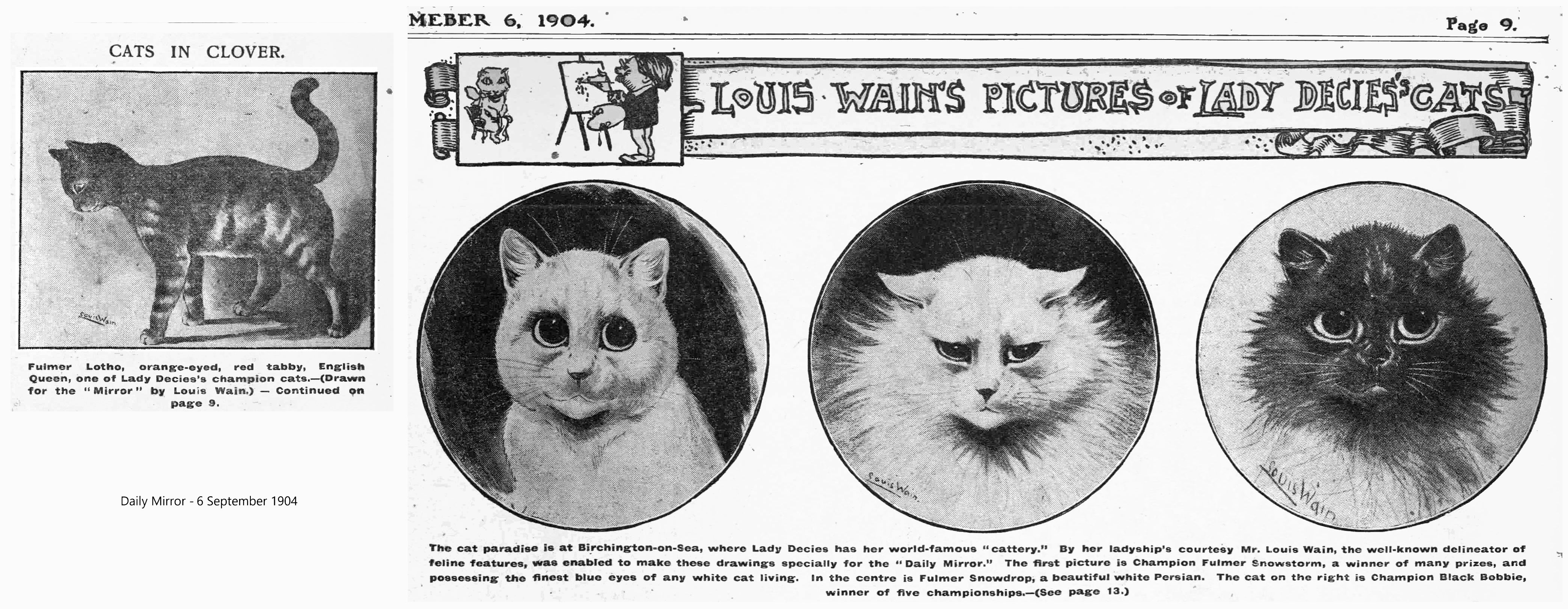
PARADISE FOR CATS. Where High Bred Pets Live in Luxury. (Daily Mirror, 6th September 1904) At Beresford Lodge, Birchington-on-Sea, Lady Decies has established a veritable paradise for cats. Lovers of the feline race are sometimes admitted to see the aristocratic residents of the charming garden, where they disport themselves from day to day. One coal-black giant, with a bushy tail, of which even a fox would be proud, is Fulmer Bobbie, three times a champion, and, though fierce in appearance, is in reality as gentle as a kitten. Snowstorm is the name of another soft and dainty cat, coiled up in a corner like a ball of snow. 'She bears the distinction of having the finest blue eyes of any white cat living. Of slow and stately mien is Aida, the Sultana of Catland. Silver grey, without a blemish, and a long, silky, sweeping tail, she seems impressed with she memory of hundreds of prizes which she has won in past shows. Not by the fireside are these dainty residents of a cats' paradise fed and protected. In a shady corner of the walled-in garden they sleep in straw-filled boxes fixed in specially-constructed wooden houses, while outside rooms with ladders and balls provide them with diversion during the day. Meat and fish, with an occasional sparrow, and pure water are served in white enamel pans for the older pussies, while milk only is provided for kittens and invalids. Mr. Louis Wain has drawn pictures of four of the most beautiful of Lady Decies's pets and prize-winners for the Daily Mirror.
Lady Decies had a cat that always rushed to the dining room as soon as the gong sounded. If it failed to arrive before the door was closed it seized the rug outside, which was held down by a weight, and did a double knock by lifting the edge of the rug with its teeth so that the weighted end dropped on the ground (Various, November 1907).
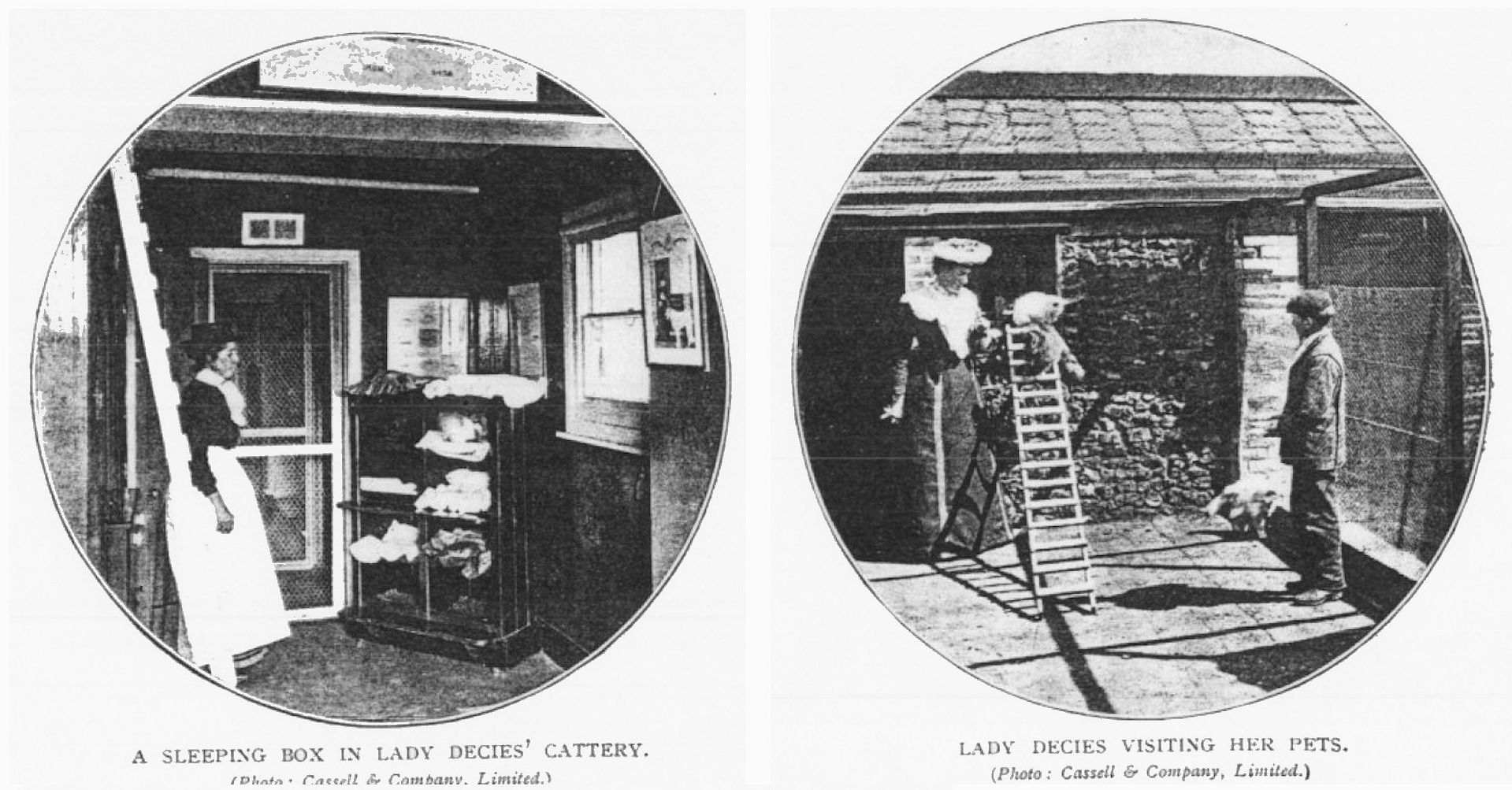
In 1907, she was called as a witness in a case where the cat judge Mr. Mason was accused of making a libellous remark about a chinchilla cat's tail (Daily Mirror, 24th January, 1907): TAIL OF A CAT. The "Ideal Chinchilla" Absorbs a Learned Judge's Attention.
The usher almost said ''Miau!" instead of "Silence in court!" when the cat case was resumed yesterday. For King's Bench Court VIII. has abandoned itself to, and become engrossed in, cats. Mr. Justice Kennedy now knows nearly as much about the points of a Persian as he does about "equity of redemption," and such-like matters. He displayed the greatest interest in the "ideal Chinchilla," a goal striven after by cat fanciers and described by a great expert. The ''ideal"' is of a silver colour, devoid of markings from nose to tail. "I suppose it is unattainable," his Lordship sighed, thinking of other ideals. An even greater sensation was caused by the production in the witness-box of a tail that once belonged to a real live cat.
Mr. Mason, the defendant, who is accused of making libellous remarks about a Chinchilla's tail, gave a little anatomical lecture on the "exhibit." He pointed out that a Chinchilla tail should taper gracefully to a point. That is the ideal. Lady Decies was one of the witnesses for the defence. She once exhibited a cat named Zaida that was defeated at a show by another cat called Sceptre. But the defeat was to be explained by the fact that Zaida on the morning of the competition deranged her coat by a roll in some gravel. The hearing was adjourned.
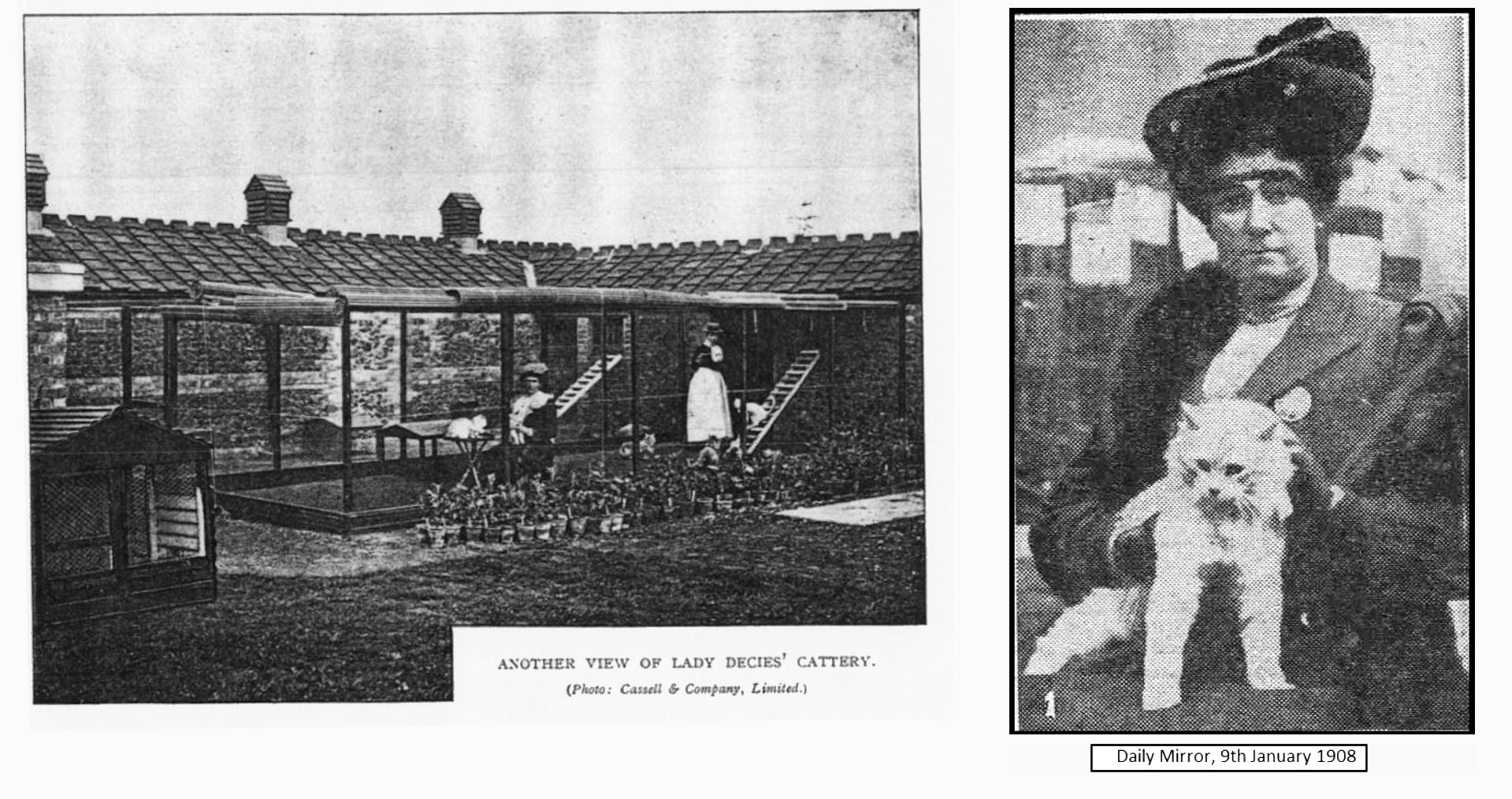
The Sphere, 17th April, 1909 LADY DECIES Owner of many prize-winning cats and Pekinese spaniels [ . . .] among other enthusiasts is Lady Decies, who in her beautiful home, Sefton Park, near Slough, has several fine specimens. She has also extensive catteries, though nothing like so large as when she lived at her Birchington bungalow, where amongst her treasured cats was one valued at 1,000 and which had taken every possible prize at the leading cat shows.
A Lady Cat Fancier (Western Evening Herald, 21st October 1909) - "Lady Decies, who has been issuing an appeal for First Aid for Cats, does so with authority, for there is not greater cat-fancier or more successful cat breeder than this lady, who has taken six prizes at the National Cat Club Show, and whose short-haired Love-in-the-Mist connoisseurs have pronounced to be the most beautiful cat that has ever existed on earth."
Lady Decies and Her Cats (The Queen, 25 December 1909) - "There is probably no name more familiar to cat fanciers than that of Lady Decies (Maria Gertrude, the younger daughter of the late Sir John Pollard, Willoughby Bart.). She exhibited a good many years before her marriage in 1901, and calls her cats the Fulmer strain. She has had a great deal to do with the establishment of several prominent cat shows, and also exhibits dogs, being one of the oldest members of the Pekingese Club. Her kennels at Sefton Park, Slough, contain some handsome Pekingese, all fit to win at the largest championship shows, and during the last four years Lady Decies has secured many a brilliant victory. It will thus be seen that she is as successful in the dog as in the cat world, and many a time these columns have recorded the victorious career of her feline pets. Lord Decies, too, is well known in the Bedlington terrier world, and from 1900 to 1905 was Master of the Thanet Harriers, while it may be added that in 1904 he became a member of the Kennel Club and Lady Decies of the Ladies' Branch." As is mentioned in another column Lady Decies was a prominent exhibitor at the Crystal Palace shows.
Lady Decies and Pekinese Dogs.
DOGS OF HIGH DEGREE: THE LADY DECIES' PEKINESE KENNEL. (Lady's Pictorial, December 25, 1909) - "THERE is no more fashionable pet at the present time than the Pekinese [. . .] It is not very many years since Lord and Lady Decies took up the breed, but their kennel has prospered exceedingly, and is now famous wherever the Pekinese is known. Mr. Strick, a notable judge of dogs, persuaded Lady Decies to start her kennel, and the first member of it was purchased fom Major Mac Ewen. This was Champion Manchu Cheng-tu, one of the finest specimens in the world. The Sefton Park kennel has been the most successful on record, no less than nine Pekinese in it having won challenge certificates at the largest shows, while there are now five full champions to be found there. To obtain the full title, a dog must win three challenge certificates under different judges, so Lord and Lady Decies can congratulate themselves on truly wonderful success with the fascinating Chinees. They are both devoted to animals as well as to sport; they are prominent in their efforts for the welfare of the dumb creation, as Our Dumb Friends' League can testify; and, in addition to owning so many splendid Pekinese and a famous lot of prize-winning cats, both Lord Decies and his wife are keen racegoers. [. . .] Lady Decies is as well known as a cat-owner as she is among Pekinese fanciers. She has some of the very best long-haired white cat with blue eyes, and also owns short-hairs, Manx cats, and Siamese. One of her finest animals is the short-haired tabby, Jack Flash."
The Lady's Pictorial, February 24, 1906: A new exhibitor in this breed [bloodhounds] was found in Lord Decies, whose pretty wife was showing a remarkably fine string of the still fashionable Pekinese.
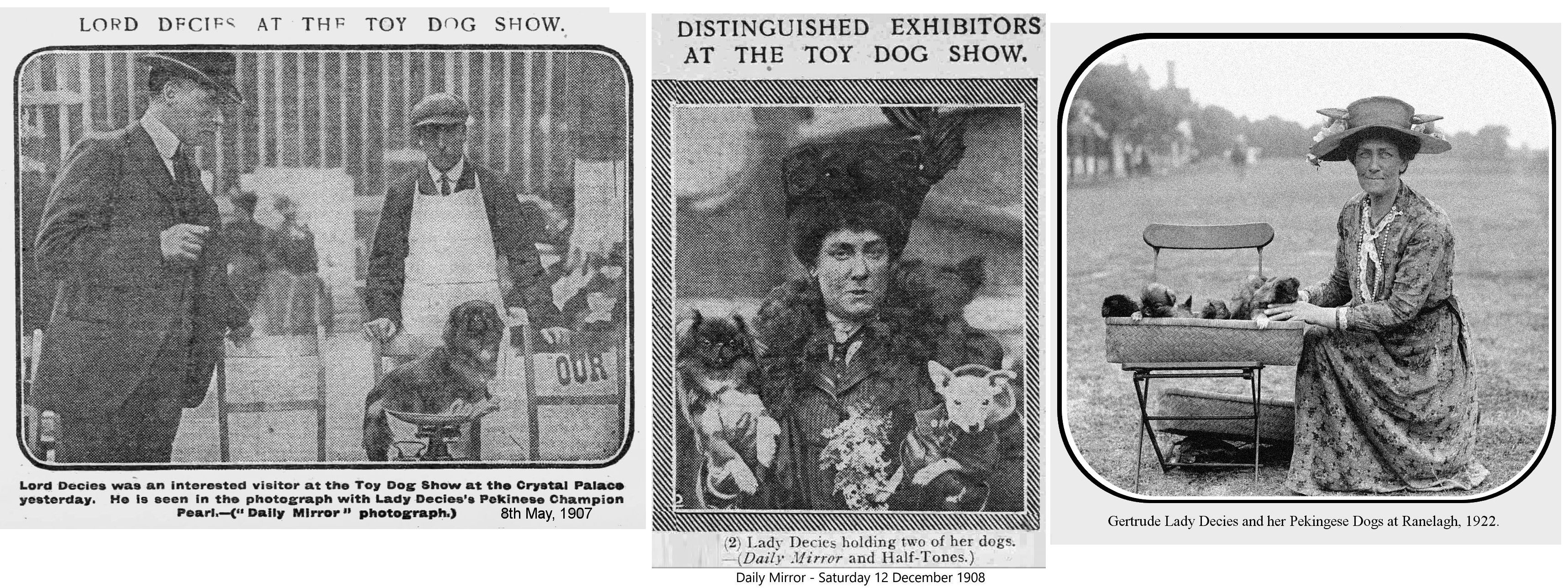
On November 20, 1919, The [London] Times reported that Lady Decies was fined for giving rice to her dogs. As part of the war effort, food fit for human consumption wasn t allowed to be fed to animals. At Ascot Police Court yesterday, Gertrude Lady Decies was charge under the Cereals Order with using rice as food for dogs. She was ordered to pay a fine of 2 and costs. Police-inspector Simmonds said that on October 8 he went to Scotswood, Sunningdale, and he saw two dogs in a kennel eating rice pudding from a plate. A person standing near was holding a tray on which there were seven other plates of rice pudding. He did not see Gertrude Lady Decies at that time, but a few days later, when he called again, her ladyship told him that as soon as she knew it was wrong she stopped feeding the dogs with rice. She also said that a mistake had been made, as she had ordered chicken rice for the dogs, but best rice had been forwarded instead. It was also stated that Gertrude Lady Decies kept 14 dogs. In defence it was submitted that the defendant was ignorant of the Order.
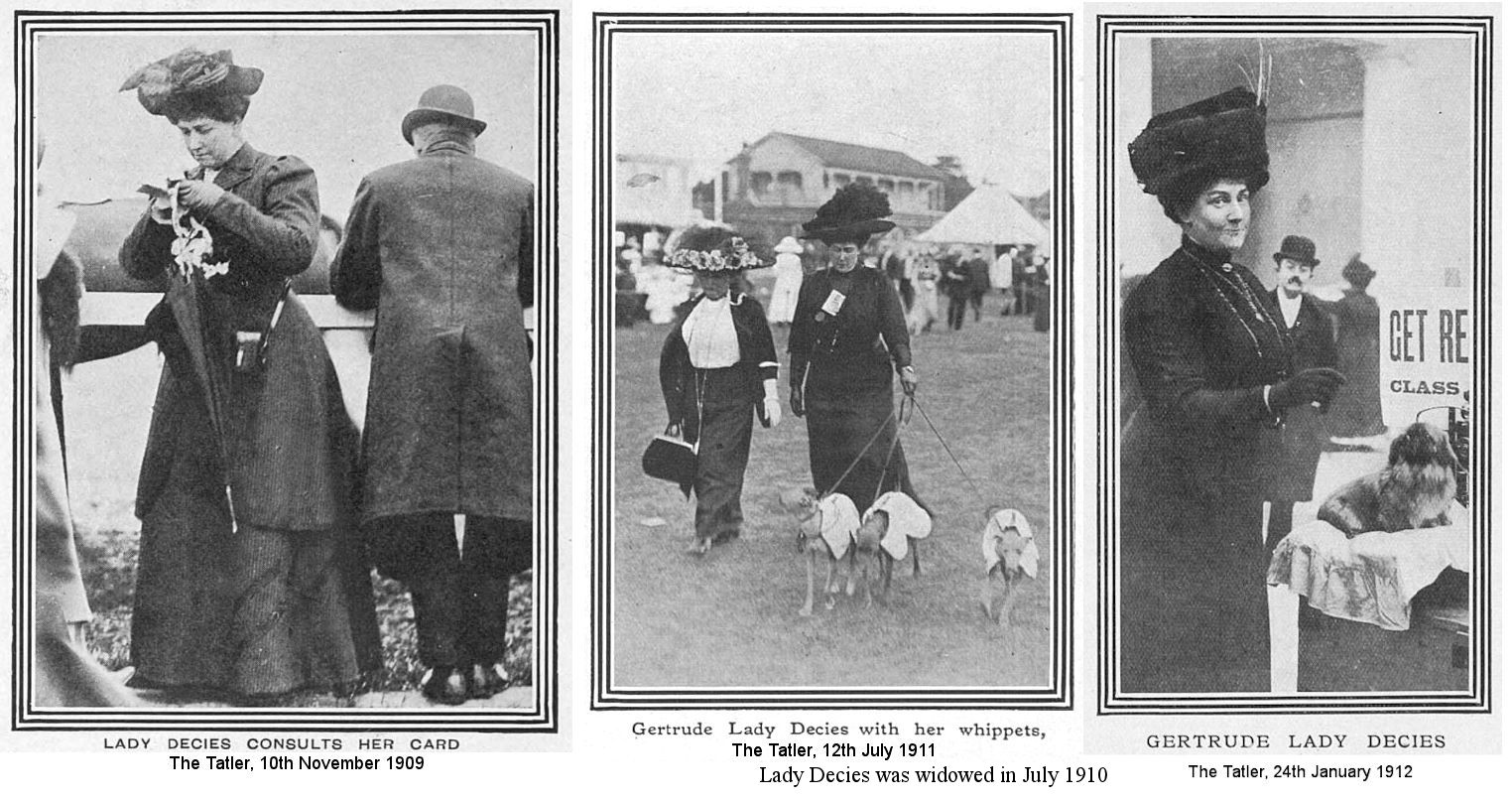
On 19th February 1924, the Associated Press gives us: "Dogs Need Dresses Declares lady Gertrude. Knitted jumpers for dogs - "to keep them warm when motoring, she said - were sold by Gertrude Lady Decies, at the winter show of the Pekingese Club, at Tattersall's. The tiny jumpers, knitted by Lady Decies herself, in wools and silks of various colors, were designed by her to take the place of the old dog's coat, which was usually a plain square piece of material wrapped around the animal's body. The new-fashioned jumper is properly shaped with leg holes, and draws up around the neck." Unfortunately she was producing luxury items aimed at an aristocratic set that was also impoverished.
"SILK JUMPERS FOR FIDO. Dolls and Hair-Curlers Designed by Gertrude Lady Decies. Gertrude Lady Decies, who founded a luxurious dogs' hotel in Surrey, yesterday, at the French Bulldog Show, at the Royal Horticultural Hall, showed The Daily Mirror some of her latest inventions for Fido's comfort. These include a hair curler which imparts a fine wave to the straightest canine hair, anti-distemper cushions, filled with cedar wood, anti-splash 'garters' and rubber dolls. Lady Decies has lately been designing silk 'jumpers' of every colour for dogs of all sizes. She told The Daily Mirror that these were in great demand with people who fly to the Continent with their dogs." (Daily Mirror, 31st March 1926) These were properly-shaped jumpers with four "sleeves" and were first designed for her valuable Pekinese dogs to protect them from the cold. It seemed she knitted them herself.
According to the Daily Mirror (18th July, 1935) she invented a new competition at a garden party dog show where people were invited to guess the number of spots on a Dalmatian dog!
. . . and Mice
According to the Daily Mirror, 30th August 1930, Lady Decies, when she was Miss Gertrude Willoughby, owner of the chinchilla cat Champion Zaida, was challenged to breed a chinchilla mouse. "A well-known judge said she could not breed a mouse the colour of Zaida. Lady Decies replied that in three months she would accomplish this. The judge promised her a silver cup if se succeeded and in ten weeks Lady Decies produced a perfect specimen, a replica in colour of Zaida. She received many congratulations as well as the silver cup. This colour is now seen at most shows." Presumably she already had suitable foundation stock and, since mice can breed at 6 weeks old, she had time to perfect the colour.
In April 1905, The Inter-Ocean (a Chicago paper) reported "Lady Decies, the daughter of the late Sir John Willoughby, whose interests in animals is well known, has taken up the latest craze - pet mice - with considerable zest, and has some fine specimens of the crack breeds in her 'mousery'."
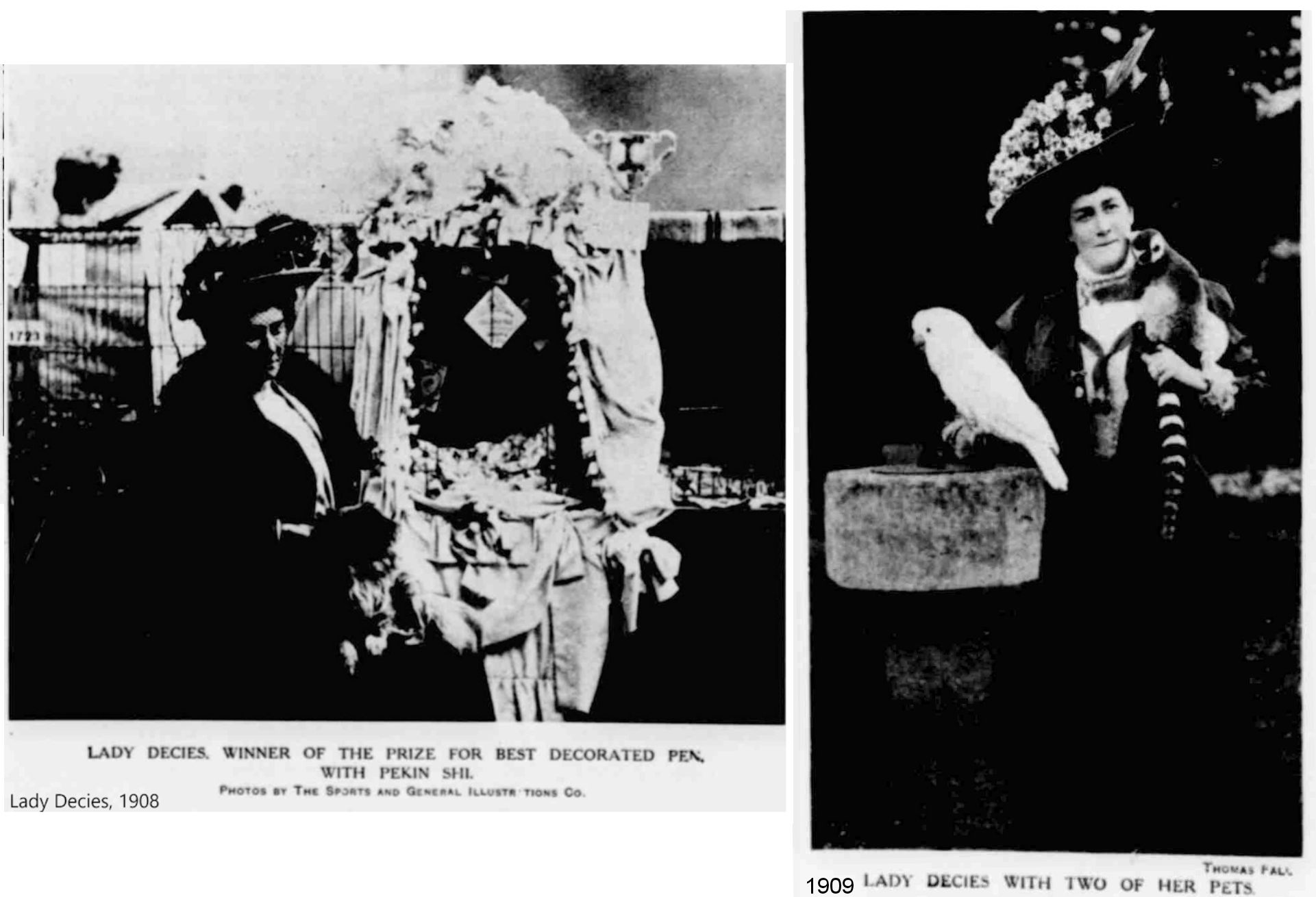
Anti Cruelty Activities
The late 1800s and early 1900s attitudes to animals involved double standards. Men and women of the wealthy classes may have campaigned against animal cruelty, but most also enjoyed fox-hunting and thought little of drowning the excess puppies and kittens that they bred so that the pick of the litter could be raised for exhibition. Very often the puppies and kittens were given to a foster mother whose own offspring were drowned (or, if luckier, were chloroformed).
In the Daily Mirror in September, 1933, we can read that Gertrude Lady Decies, The Duchess of Portland, the Countess of Warwick, and other titled personages signed a letter campaigning against steel-toothed rabbit traps. The R.S.P.C.A. was endeavouring to stop the use of these traps, which caused lingering and agonising death to the rabbits thus trapped. "Moreover, many other animal for which these traps are not intended are inadvertently caught in them, and are very often seriously mangled." Animal fanciers' publications of the time often reported the death or injury of pedigree cats and dogs (which were often allowed to roam outdoors) due to these traps, so whether the signatories' interest was purely anti-cruelty or was partly driven by the injury caused to valuable pets, is open to speculation.
Also in 1933 (Daily Mirror, 1st Sepember, 1933) we have THE BIRCH FOR TORTURERS. Readers Censure the Oxford Magistrates. "PALTRY COSTS"
The Oxford boys who burned, blinded and thrashed the ten-weeks-old kitten were unpunishable (with the rod) by law for two reasons. They were over fourteen, and their offence was not in the indictable category. . . "There are some of us," said the speaker, who regard birching as more harmful than good." [The kitten had suffered for two days.]
[. . .] LADY DECIES'S VIEW. Lady Decies, writing from St. George's-square, S.W., asks: "Did not the magistrates realise that these boys of fourteen and fifteen years were old enough to know that they were inflicting torture on the helpless kitten? "I consider no punishment is too severe for such cruelty. They need a flogging and should be humiliated before their school-fellows. They would then have something to remember. How long are they likely to remember the few words of the magistrate?"
As an Inventor.
Gertrude Willougby was an intelligent young woman and had an interest in small engineering projects that continued after her marriage. She was luckier than most such women who would have been too busy caring for a husband and children; being born into the upper class she had the benefits of a good education and time in which to pursue her interests. She was also lucky that her husband did not dissuade her from these projects.
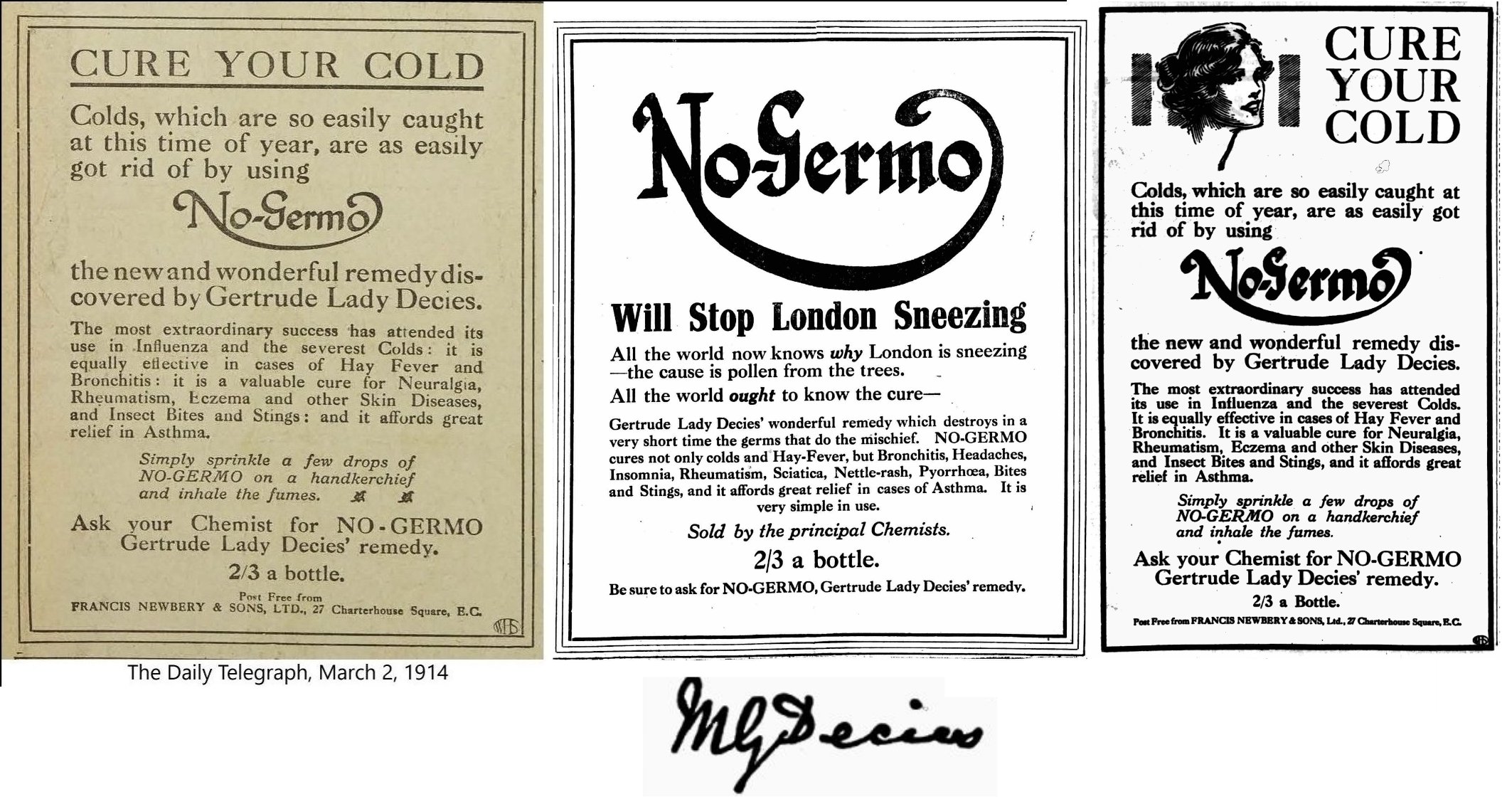
NO-GERMO. A TALK - BY ITS DISCOVERER. LADY GERTRUDE DECIES.
For many years I was engaged with my late husband in carrying out experimental work and research in our laboratory at Sefton Park in another connection. It was as a result of these experiments that I eventually discovered NO-GERMO, which contains five of the strongest germicides known, not one of which, as far as I know, is included in any of the best disinfecting compounds now regularly on the market. By the use of these five ingredients in the proper proportions, and by a special secret method of mixing, I claim to have produced the most powerful germ-killer and antiseptic yet discovered. The results which have followed the use of NO-GERMO, both in my own case and in the instances personally known to me of its use by my own friends, I can only describe as marvellous. Moreover, I have received countless testimonials from all parts of the United Kingdom and from abroad, both from doctors and private individuals, recording the unvaried success of NO-GERMO in the following instances:-
As a Prevention and Cure of Colds, Hay Fever, Bronchitis, Asthma, headaches, Insomnia, Rheumatism, Neuritis, Chilblains, Arthritis, Lumbago, Sciatica, Eczema, Nettle Rash, Pyorrhoea, Sores, Wounds, Wasp and Mosquito Stings etc.
All my life I have suffered from hay fever; by inhaling NO-GERMO I cured myself within 48 hours, and have since had no recurrence of this distressing malady. To my certain knowledge hundreds of people have already been cured, like myself, of Colds. It will stop any Cold at its commencement within two or three hours, and it will get rid of Colds, even on long standing, within 24 to 48 hours, and in the meantime give great relief. I have myself cured by the use of NO-GERMO three cases of Nettle Rash, one of three years' standing, and several cases of Eczema, one of which was a very bad case of five years' duration, also bad cases of Rheumatism, Neuritis, Arthritis, Sciatica, and Lumbago. In cases of Insomnia, NO-GERMO acts as a soporific; it will relieve and cure the most acute Headaches; and it affords great relief in the case of Asthma. It has also been proved to be a most effective remedy for Pyorrhoea. For Stings of wasps, mosquitos, midges and other insects, NO-GERMO is and instantaneous and certain cure; indeed, so great is its proved success in these cases that tests are now being made to ascertain its powers as an antidote to Tsetse Fly and other tropical insect pests.
NO-GERMO is a powerful antiseptic and styptic for wounds, which it heals rapidly and completely; and it forms a most soothing lotion for use after shaving, removing as it does all roughness and soreness of the skin. The West London and other London hospitals have already recognised its value, and use it largely. Though it is intended for inhalation and external application only, NO-GERMO is absolutely harmless, and its odour is pleasing. If used in the form of a fine spray, it acts as an excellent air purifier, and it absorbs and removes noxious fumes and tobacco smoke most effectually from close rooms. In this connection it is being used with great success at the Victoria Palace Music Hall, in the Holz patent Electric Air Spray.
The method of using NO-GERMO is exceedingly simple, and full directions accompany each bottle. Messrs. F. Newbery & Sons, London, E.C., are the sole agents, and the preparation can be obtained from the principal chemists everywhere at 2/3 [2s. 3d] the 2 oz. bottle.
Be sure to ask for my remedy, NO-GERMO.
M.G. Decies. [Various 1914]
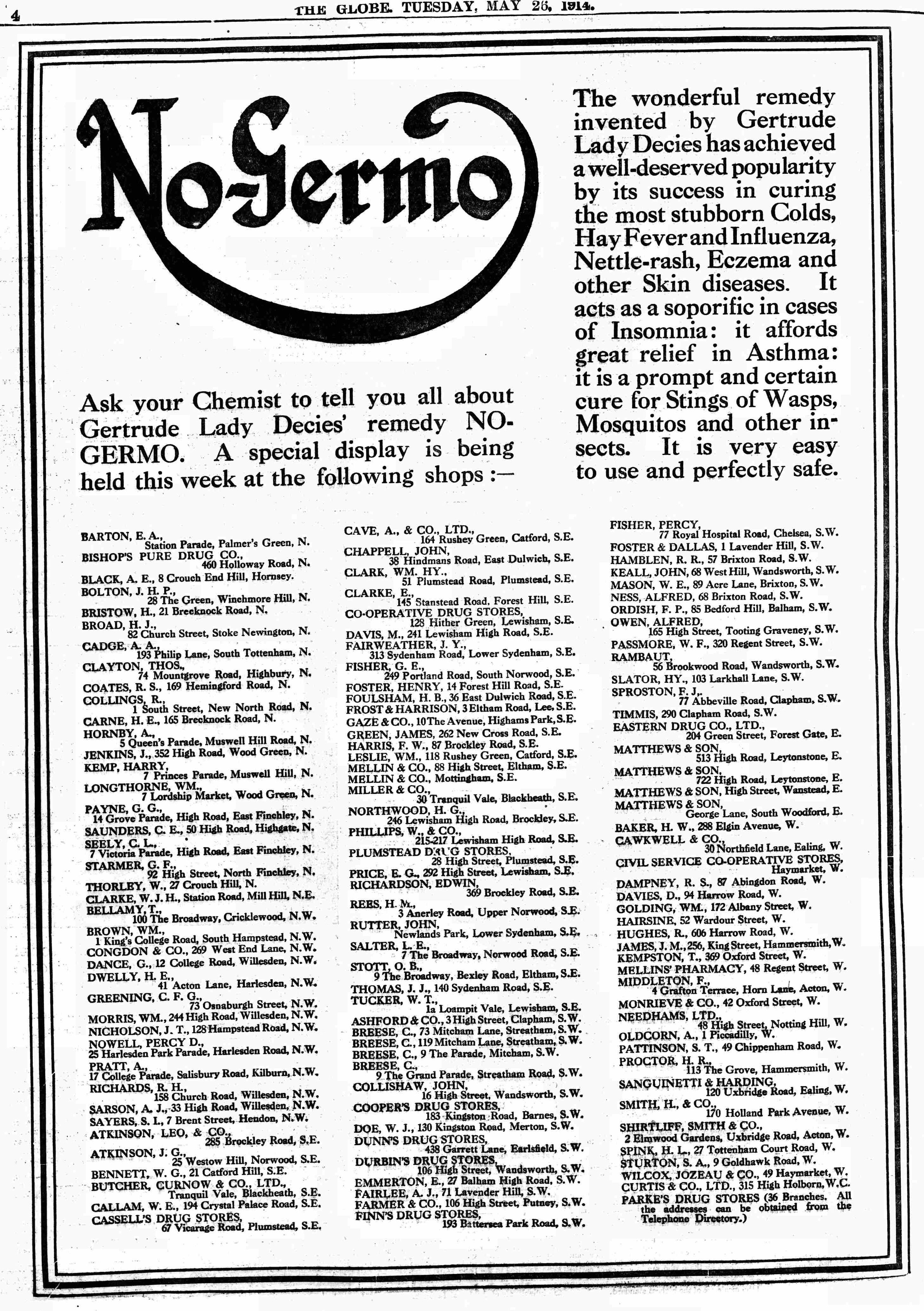
According to the "Cat Gossip" column in The Ladies' Field, 1st March 1913, Lady Decies had discovered a wonderful disinfectant and preventative for show fever in cats and dogs, also good for distemper and influenza. She had soe delicate three-month old chinchilla kittens at three of the big shows and although kittens on either side of them died of show fever, nearly all of hers escaped. She had named it "Nogermo" and was patenting it, after which it would be put on the market. She had apparently discovered part of the recipe in an ancient book belonging to the late Lord Decies' family, and the other ingredients were her own idea. According to the Sussex Daily News, 17th October, 1916, No-Germo was demonstrated at a stall at the Home Life Exhibition at the Brighton Aquarium.
Several accounts describe her as having an inventive and ingenious turn of mind and a flair for mechanics. Before her marriage she had invented games and puzzles that proved both clever and profitable when she sold the designs, although accounts differ as to whether these made her a considerable sum or merely "pin money." In December 1906, she filed a patent for a mechanical recorder for golf scores. The invention resembled a fob-watch, having a circular case with dials and milled edges that could be rotated to record points for each stroke. The patent was issued in September 1907.
As well as the mechanical puzzles, she also studied chemistry and had a laboratory at Scotswood where she developed several antiseptic and insect-repellent remedies against bites of flies and mosquitoes, one of which was called "No Germo." (The Leavenworth Times, 8th October, 1902, The Washington Post, 26th September, 1920)
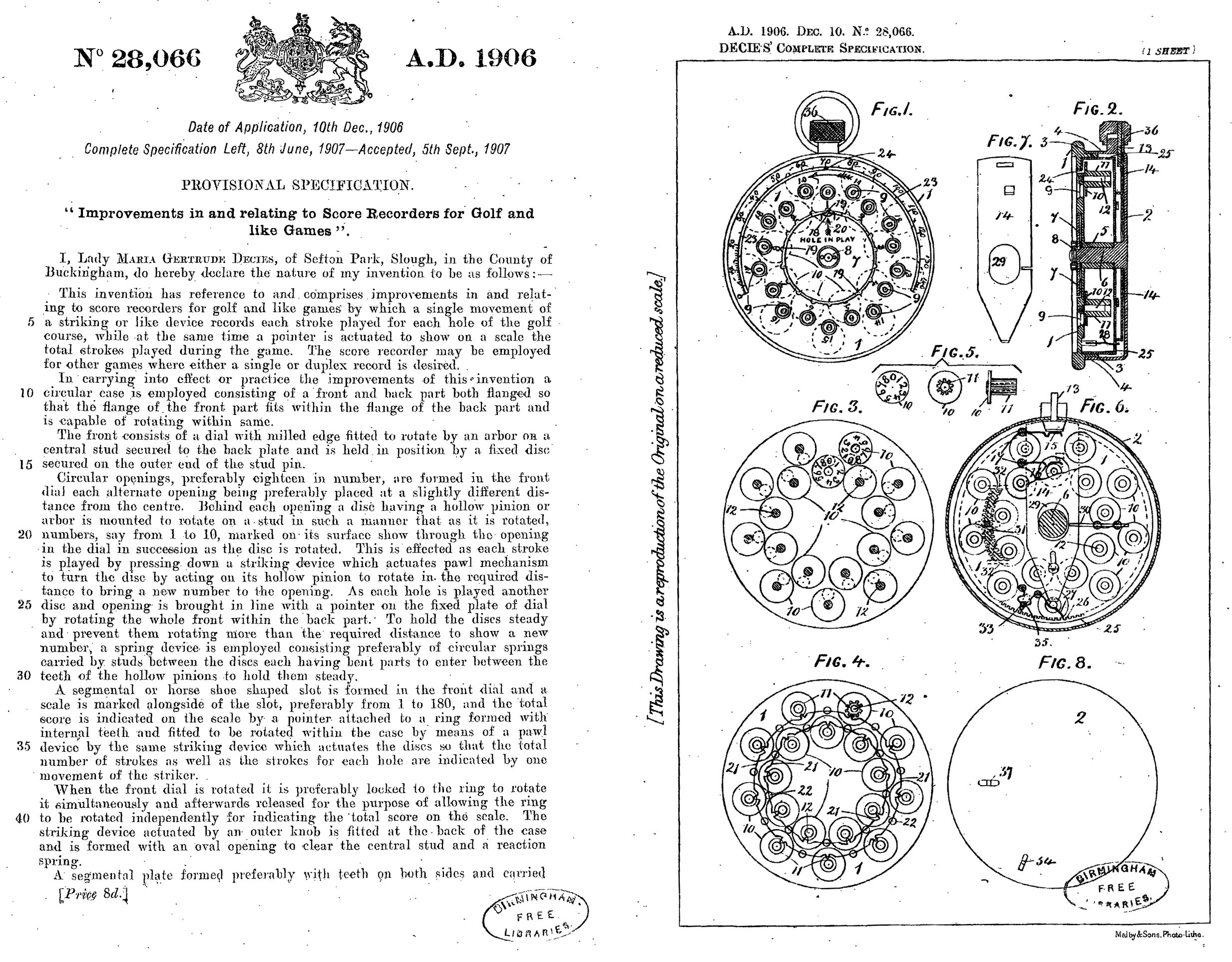
The Beresford Lodge Court Case and Death of Lord Decies.
An interesting chapter in the couple's life occurred on July 2nd, 1910, before Mr Justice and a Special Jury of the King's Bench Division. The case is recorded as 'Lyons v. "The Financial News (limited)" and Others' and involved an allegation of libel. Mr. Maurice Barnett held a watching brief on behalf of Lord Decies, whose property, Beresford Lodge, was at the centre of the case. The action had been brought by a Mr Lyons (plaintiff) to recover damages for libel from the proprietors and printers of the The Financial News. Lyons, had arranged to buy Beresford Lodge, Birchington-on-Sea from Lord Decies. Lyons proposed to float a company on the Stock Exchange and to sell the property to this company at a considerable profit; the company would convert Beresford Lodge into a hotel, with Lyons as managing director on a salary of 600 a year. Lyons issued a prospectus for the proposed company, but the Financial News published two articles that criticized his estimated profits, and warned the public to have nothing to do with the scheme. The articles criticised the prospectus of Lyons company known as the Cliff Palace Hotel (Limited). As a result, Lyons failed to attract investors and had lost the expected profits (the material damages required for a libel case), while the Financial News claimed the articles to be truthful and fair comment on a matter of public interest.
Birchington was not on the motorists road to anywhere and existing hotels in the area already did very badly. Lyons had a good knowledge of catering, but hoped to make more money by promoting a company. In a previous scheme, Lyons had failed to find partners for a Limited Company, so he created the Premier Catering Syndicate. Using his own name, Lyons, he allowed people to think he was connected to the well-respected company, Messrs. Lyons. The shareholders lost their money and the syndicate's creditors were never paid. Lyons had wasted 17,000 of the public money in his Premier Catering Syndicate. The Financial News considered it their duty to warn the public of Lyons previous schemes and dishonesty.
Lyons had acquired a lease with an option of purchase of Beresford Lodge at Birchington-on-Sea from Lord Decies. The fact that £10,000 out of the £12,000 purchase money was to be allowed to remain on mortgage showed just how anxious Lord Decies was to get rid of Beresford Lodge, and how impossible it had been to obtain its suggested value. A Mr. Cousins, deceased at the date of the case, had valued the property at £20,000, but there was doubt as to his credentials, especially as Lyons seemed to be looking for a dodgy valuer who would to over-value the property! Evidence was given by an estate agent that Beresford Lodge was only worth £12,000. Leaving aside the libel case, this meant that Lord Decies hadn't been able to sell Beresford Lodge and was probably under a lot of stress which may have contributed to his sudden death a few weeks later.
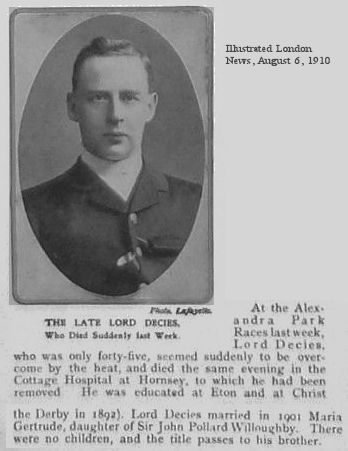
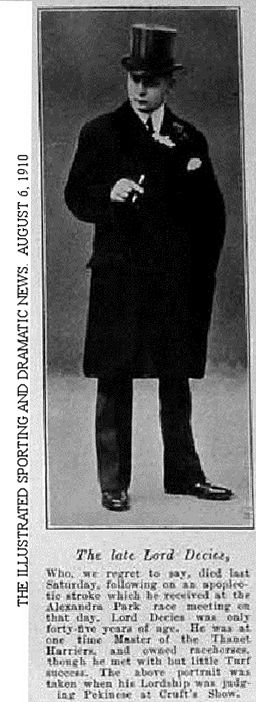
Lord Decies died, aged 45, suddenly, at the Cottage Hospital, Hornsey, having apparently been overcome by the heat, but actually having suffered an "apoplectic stroke," when attending the Races at Alexandra Park that same day (30th July, 1910) and was buried Stoke Poges, Buckinghamshire. He left £97,484 (gross; £82,499 net). Because the couple had no living children, he was succeeded in his title by his brother John Graham Hope de la Poer Beresford (who was married to the American Helen Vivien Gould). Probate was granted to Sir John C Willoughy (Gertrude's brother). From then on there were two Lady Decies â€" Gertrude Lady Decies, widow of the 4th Baron, and Vivien Lady Decies, who did not like being confused with the cat loving Gertrude.
The 5th Baron Decies (the new Lord Decies) inherited Sefton Park, a pretty place near Slough, on the death of his brother, the late Lord Decies, but the contents were left to his widowed sister-in-law, Gertrude Lady Decies, who transferred them to Scotswood, a small property she has bought near Sunningdale. Scotswood had been the residence of the late Mr Albert Mott, K.C. The new Lord Decies inherited Beresford Lodge, Birchington-on-Sea and in 1915 allowed it to be used as a convalescent home for officers. It was 3 miles outside of Margate and had its own private stairs to the sands. All that remains today is Beresford Gap, a slipway. Beresford Lodge became a hotel in the 1920s and survived in that form into the early 1970s. In 1975, the hotel was demolished and the site cleared to make way for housing.
Wartime - 1914-1918
The Pantagraph of August 3rd, 1914 reprinted this piece from the Woman's National Weekly: Trade has lost its stigma in England since land taxes and death dues bore down on the H upper classes. Society women keep shops nowadays almost as a matter of course. All the world says [. . .] that Gertrude Lady Decies (mother-in-law [sic] of George Gould's daughter) is marketing her patented remedy No Germo, a preventive of influenza. (she was sister-in-law, of course) On the morning of December 4th, 1914, London suffered one of its pea-souper fogs that caused traffic chaos and the Associate Press reported Gertrude Lady Decies, widow of the fourth baron and sister-in-law of Vivien Lady Decies, nee Gould, was badly injured in a collision involving four busses and her taxicab near the Crystal palace. She was taken to a hospital with a bad wound in the face.
During the Great War, many ancestral homes opened as hospitals for soldiers that were invalided home. Lady Decies did her bit, both at home and overseas. In May 1916, many papers reported that she did frequent duty as a kitchenmaid in cap and apron at the Alexandra hospital for officers, but we get a more detailed picture of her work from an article entitled An American Girl's Picture Of War Horrors, which contained an account told by her to her sister-in-law, the former Vivien Gould and current Lady Decies. It appeared in The Saturday Evening Post (22nd May, 1915): That night in my hotel after dinner, Gertrude, Lady Decies, told [Vivien] the following story: I Had only twelve hours notice to start for the front. I am not a hospital nurse, but I have taken for several years three months each summer of special training. So I felt that I would be useful if I could get over. It was November and very cold. When I got to Calais there was not a room to be had anywhere. But at the Hotel Central they told me I might have a bathroom to sleep in. At the last moment a gentleman volunteered to exchange with me. But the next day he left, so that night I slept in a bathtub with a mattress in it!
The following day I got a train for Dunkirk. On the way the train was wrecked. Several coaches left the track, and there was nothing to do but to wait until they were put back on. I went to the British consul at Dunkirk and asked him where I could be most useful, he said to go to the railroad station at once. I went to the station. The situation there was horrible. Three doctors and seven dressers were working on four-hour shifts. As the wounded came in only at night, that was when we were needed. I worked all night from that time on. My first night we had eleven hundred men. Some of them were dead when they were lifted out onto the stone floor of the station shed. One boy flung himself out of the door. I caught him as he fell and he died in my arms. He had diphtheria, as well as being wounded. The station was frightfully cold, and the men had to be laid on the stone floors with just room for moving about between them. There was no heat of any sort. The dead were laid in rows, one on top of another, on cattle trucks. As fast as a man died they took his body away and brought in another wounded man.
Every now and then the electric lights would go out and leave us there in black darkness. Finally we got candles and lamps for emergencies. We had no surgical dressings, but we had some iodine. The odors were fearful. Some of the men had not had their clothes off for five weeks. Their garments were like boards. It was almost impossible to cut through them. And underneath they were coated with vermin. Their bodies were black with them frequently. In many cases the wounds were green through lack of attention. One man, I remember, had fifteen. The first two nights I was there we had no water, which made it terrible. There was a pump outside, but the water was bad. At last we had a little stove set up, and I got some kettles and jugs and boiled the water.
We were obliged to throw the bandages in a heap on the floor, and night after night we walked about in blood. My clothing and stockings were stained with blood to my knees. After the first five nights I kept no record of the number of wounded; but the first right we had eleven hundred; the second night, nine hundred; the third night, seven hundred and fifty; the fourth night, two thousand, the fifth night, fifteen hundred. The men who were working at the station were English Quakers [i.e. conscientious objectors]. They were splendid men. I have never known more heroic work than they did, and the cure was a splendid fellow. There was nothing too menial for him to do. He was everywhere.
An injury, to which Lady Gertrude Decies made only passing reference in her letters home, was dismissed by her as a mere scratch on the arm. It happened at the beginning of December 1914 and by December 10 she had already returned to her hospital duties, this time near Boulogne.
Our progress on the journey was terribly slow, the train crawled and, although we left Boulogne shortly after twelve, we did not arrive at our hotel in Paris until long after ten. The station looked deserted and dreary, few porters were to be seen, and none yielded to our blandishments, so that at last resourceful Gertrude, Lady Decies, finding an empty trolley, wheeled it up to our carriage, and we prepared to load it ourselves. (Notes of a Nomad, by Lady Jephson in the section War Time Journal Germany. 1914 ). And more from another source: "The Transport hospital, which used to be at the main station, in Dunkirk itself, but which has now been done away with, was under the charge of Gertrude, Lady Decies. Sometimes they had as many as two thousand men in a night, all sorts, French, Belgians, Turcos and a small sprinkling of Tommies." ( (France In War Time 1914-1915 by Maud Fortescue Sutton-Pickhard). And more: "Gertrude, Lady Decies has turned up here, and works at the station with us. She is rather a ludicrous spectacle, but is frightfully kind." A World War I Journal, Rosabelle Brand's Diary, October November 1914, entry for November 6th)
She took part in the Roumanian retreat, was wounded by shrapnel and blown up by a shell. Later on, she had terrible experiences in Russia under the Bolshevist regime. In November 1915, she was an exhibitor at the Daily Express's "Women and Their Work Exhibition" at the Prince's Skating Rink, Knightsbridge. The exhibition covered the usual domestic arts, horticulture, and, importantly, featured their wartime work which freed up men for service.
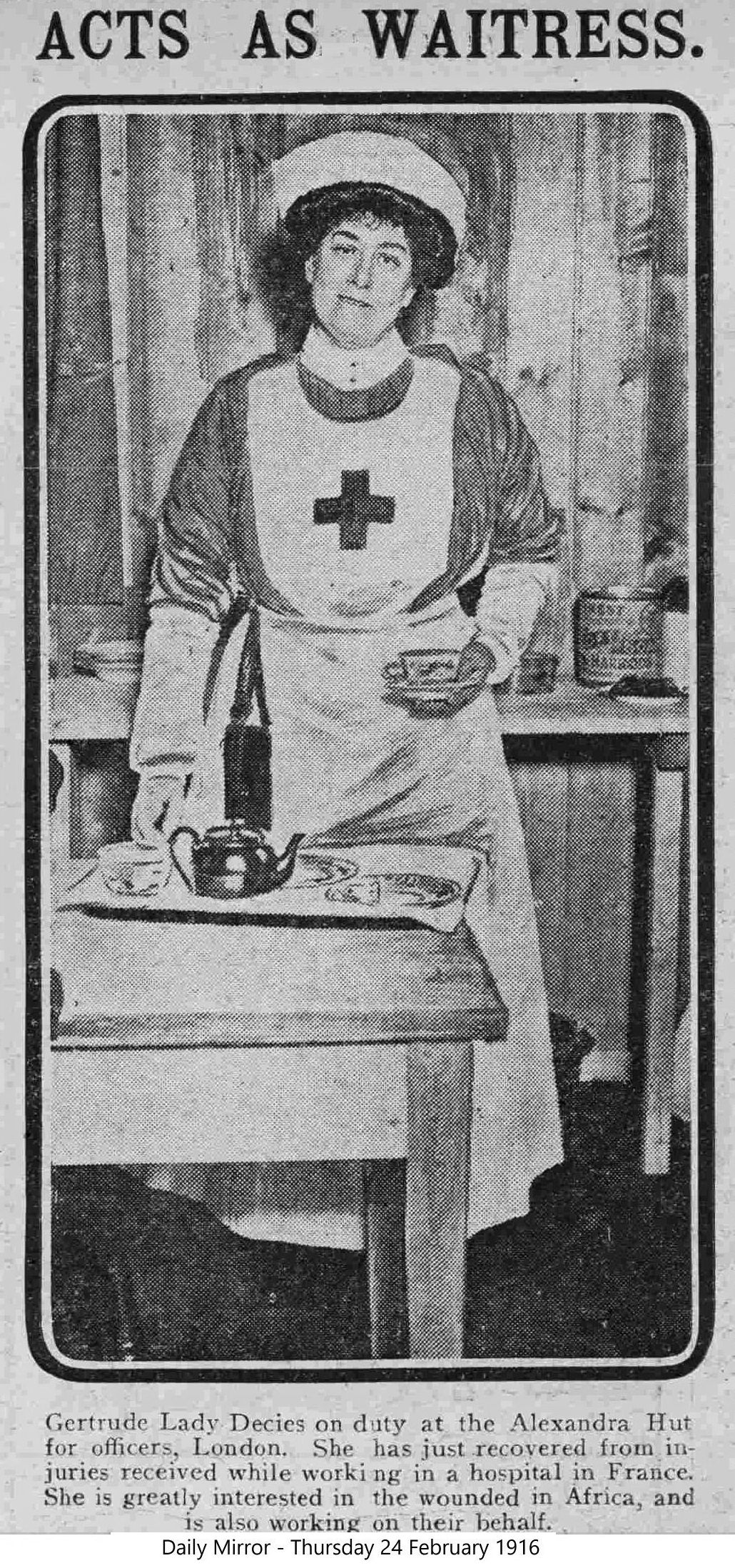
During 1916 she continued her wartime fundraising efforts, although the administration was carried out by others while Lady Decies was on the continent. According to The Tatler (23rd August 1916) Gertrude Lady Decies has just added a cat section" to her "Four-footed Forces," and any members owning cats can obtain full particulars, with collecting cards, from the honorary secretary, Mrs. Carew-Cox, 71, Clyde Road, East Croydon. The dogs have already collected nearly £500 in six months, and it is hoped the cats will do equally well.
Upon her return from the continent, she spent some time recuperating at the Cavell Home at Westcliff-on-Sea (now part of Southend-on-Sea). This letter, written from there, appeared in The Spectator, 31 March 1917, Page 12: [To The Editor] Sir - May I, through the medium of your most valuable paper, appeal for the Cavell Memorial Holiday Home at Westcliff-on-Sea? The Home has existed for nine years for working gentle-women, but in December, 1915, it was renamed in honour of Edith Cavell, and specially helps our splendid body of nurses to take a well-earned rest by the sea. The Home is always full, but the fees paid by the visitors are so small that the Home is obliged to rely upon the generosity of the public for its maintenance. Subscriptions and donations are very urgently needed, and may be sent to the Secretary at the Home, or the bankers, Messrs. Barclay and Co., 1 Pall Mall East, London,'s.W. I am, Sir, &c., M Gertrude Decies, First Avenue, Westcliff-on-Sea, Essex.
According to The Tatler (20th February, 1918) Gertrude Lady Decies is once more in England for a short spell of much-needed rest. Ever since the outbreak of war this noble woman has worked in the forefront of the battle, and only her most intimate friends know the terrible hardships and privations she has undergone, for Sister Mollie, as she prefers to be known, is one of those who work silently and unselfishly, without any thought of fame or reward. The [Ladies Kennel Association] does, indeed, feel proud of owning her as a member, and offers her a hearty welcome back to Blighty. And the 10th July 1918 issue of the same periodical tells us "Gertrude Lady Decies is numbered amongst those who 'are never wearied in well doing.' Only recently' she was obliged to return from her strenuous hospital labours in Serbia as her medical advisers said a complete rest was absolutely necessary for her; but no sooner had she settled in England than she set in motion a scheme which she had formulated for the benefit of disabled soldiers in the first place and secondarily for the increase of the food supply. Depots are to be started in London and other places, where all instructions on the rearing, food, etc., of pedigree rabbits will be given, showing how these may be kept at a profit in towns as well as in the country. The first of these depots, The Hutch, 57, Lower Belgrave Street, is managed by Lady Decies and her sister, Miss [Alice Anna] Willoughby, and was opened on June 4."
The Milwaukee Journal, September 19, 1920 tells us another of her wartime initiatives. Early in the war, Lady Decies decided that prize dogs should become war workers. She therefore enrolled canine recruits for her collecting corps on behalf of the British Red Cross society. She conscripted her own prize Pekingese and such aristocrats as Lady Londonderry's bloodhounds and the Duchess of Newcastle's fox terriers. This specially conscripted "army" was not as successful as her optimistic ideas had hoped. Despite being generous and good-hearted, the initiative was probably seen as posh ladies playing at fundraising. The Windsor Magazine (1916) describes the canine army thus Gertrude Lady Decies enrolled quite a canine army on behalf of the Westminster section of the Red Cross. The headquarters of this movement was the Ladies Kennel Association. Each recruit was, of course, a private to begin with, but multiples of five pounds brought him promotion. Thus the first live pounds makes the dog-collector a corporal, and the second a sergeant. The attainment, of twenty pounds confers on him officer rank and a decoration. Members of the pioneer battalion, with really remarkable collecting cards, include Lady Decies own Pekingese, the Duchess of Newcastle's terriers, and those bloodhounds for which the Marchioness of Londonderry's kennels are so well known.
I found two other mentions. One in The Cambrian Daily Leader, 3rd March 1916, War work for dogs on novel lines has been initiated by Gertrude lady Decies, who is now enrolling canine recruits to a collecting corps on behalf of the Westminster division of the British Red Cross Society. Each collecting dog joins Lady Decies's battalion the headquarters of which is at the offices of the Ladies Kennel Association as a private [. . .] collecting of 20 carries with it the rank of full lieutenant and a gold medal. The other was in The Tatler, Sporting and Country House Supplement, Ladies Kennel Association Notes (August 1916): Gertrude, Lady Decies has just added a cat section to her Four-footed Forces, and any members owning cats can obtain full particulars, with collecting cards, from the honorary secretary, Mrs. Carew Cox, 71 Clyde Road, East Croydon. The dogs have already collected nearly £500 in six months, and it is hoped the cats will do equally well.
The Sketch, 23rd February, 1916, details some of her war work: Gertrude Lady Decies has taken to heart the case of the wounded in East Africa, and is throwing over many smaller interests in order to be free to give herself for their service. She is selling of her Pekingese; the cats are, so to speak, going to the dogs; and her horses, even, are to be banished from her thoughts for the time being. It was she who appealed a few years ago, for First Aid for Cats, took six prizes at a single National Cat Club Show, and was always busy with her animals and collections with bullfinches, chow-chows, her husband's orchids, blue-and-white china, her golf-sticks or with the puzzles that she had a very pretty knack of inventing. And when she was not busy with one or the other of these things, she had her race-card. Gertrude Lady Decies has stood in other words for a type of woman who had a thousand-and-one things to do, some considerable, some inconsiderable, but none of them, according to our new standards, of the first importance. She had no children. Now she has her wounded. Her practical knowledge of the world in detail will stand her, and them, in good stead. She has been full of war-work of other sorts, but her African enterprise is the real, big thing. It reminds one irresistibly of that tale of transformations in the breast of a Grosvenor Square lady, Aunt Sarah and the War.
In June 1915, The Washington Times tried to explain to its readers the difference between the two Lady Decies (the eldest Lady Decies had died a few years earlier) Lady Decies, Vivien Gould that was, stamped her foot very emphatically the other morning and said she would not be associated with cats in any circumstances. Now the fact is since the arrival of the little heir she has been very much to the fore in the society papers, the writers in some of which [. . .] have been mixing up the present Lady Decies with the wife of the late peer, Gertrude Lady Decies, who is a tremendous cat fancier. The new American peeress [. . .] dislikes cats almost as much as the late Lord Roberts himself, and hence her rage at having been described as a cat fancier.
The Scotswood Golf Hotel
In latter years the feminine section of the nobility have often indicated an inclination to take to business. Now Gertrude Lady Decies, daughter of the late Sir John Willoughby and widow of the fourth Lord Decies is about to start a golf hotel. She will convert her house, Scots wood, near Ascot, into such an establishment, and will manage it herself on the lines of a continental hotel. It will be called the Scotswood Golf Hotel, is near to the Sunningdale and other courses, and will be opened before these lines are in print. Within the 40 acres of ground will be a clock golf course and tennis and croquet courts. Lady Decies has many occupations and interests. Her breeds of cats and Pekingese dogs are famous. She invented an antiseptic lotion and ointment which she used in severe cases of frostbite when she was nursing in France in the early stages of the war. - The American Golfer, Foreign Notes, August 1919
The Daily Mirror (12 July, 1919) announced the imminent opening of her hotel venture: "The Scotswood Golf Hotel is to come into being by the enterprise of Gertrude Lady Decies, who has decided to convert her residence at Sunningdale, close to Ascot and adjoining the golf course, into a residential hotel. She has decided to run it personally and on the lines of a first-class Continental hotel. Scotswood, with its forty acres of grounds, lends itself particularly for a residential home, and Lady Decies has decided that the cuisine shall be excellent, while a speciality will be golfers' luncheons and dainty teas. The hotel will be opened on August 1, so that rooms may be booked, is particularly suitable for town business men, Sunningdale Station being but ten minutes' walk."
This was followed up in the Daily Mirror on 31st July, 1919 with a longer press release. 'HOME NOW HOTEL. Gertrude Lady Decies Transforms Her Sunningdale Mansion.
Gertrude Lady Decies, widow of the fourth Lord Decies, has turned her lovely country home in Sunningdale, near Ascot, into a Continental Hotel. The Scotswood Golf Hotel, twenty-seven miles from London, standing in it own grounds of forty-five acres, is a building of red stone in imitation of the Tudor period, and was built some twenty years ago.
"It is for a purely patriotic reason that I am turning my home into a hotel," said Lady Decies to The Daily Mirror. "The nation is short of houses, and it seemed to me a pity that my beautiful house should remain idle. With the aid of a capable manageress and a chef I am going to be my own hotelkeeper. There are seventeen bedrooms in all, verandahs for open-air meals, varieties and attractions of many kinds, based on reasonable hotel charges, a station within ten minutes' walk, and I am sure all such will appeal to the business man. I am already booked up for a time, and am afraid I shall have to disappoint many people. The terms on pension are:
One person per week -£4 14s. 6d. to £7 7s.
Two persons in one room per week - £9 9s. to £14 14s.
One person per day - £1.
Two persons in one room, per day - £2.
Private sitting-rooms - 10s. 6d. per day, or £3 3s. per week.
Week-ends, golfers' lunches, dainty teas, according to terms.
The hotel is within walking distance of Sunningdale, Windlesham tournament, the golf links, hunting with four packs and the different racecourses. Attractions include clock-golf, a tennis and a croquet court, a Japanese garden with beautiful and picturesque wood at the back of the house. Vegetables, fruit, eggs, milk, cream, butter and poultry are produced within the grounds. Accommodation for thirty guests, motor cars, etc. I am hoping soon to build more houses on my estate so that I can take in more people."
If any reasonable project can be made a success, Lady Decies' should be the one.'
The major flaw in this was that she was unable to get a licence to serve alcohol and the sort of guests such a hotel would attract were the sort that enjoyed glasses of port or brandy.
Her philanthropy had not prevented her from making a person on her estate homeless. It isn't clear if Mr Brown was a tenant or a squatter in a cottage on her Scotswood estate, and according to "Lady Decies' Action Against Tenant on Sunningdale Estate." (Daily Mirror, 11th August 1919): Lady Decies, of Scotswood, Sunningdale, made an application at Windsor on Saturday for an ejectment order against Ernest Brown, who lives in a cottage. Mr. Reynolds, for Lady Decies, stated that she, in a spirit of patriotism, had opened her house as an hotel for people who were unable to find houses. The cottage occupied by Brown was required for her gardener, and it was absolutely necessary that she should have a man on the estate. Mr. Brown, who was not in her employment, was anxious to get out of the cottage as soon as he could find another. An order for possession in twenty-one days was made.
Brown: Does it mean that if I cannot find a place she can turn my wife and child into the street?
The Magistrate: You will have to be out by then.
In August 1919, many newspapers carried this report on her hotel venture: Lady Decies Opens Hotel Without Drink Provision. ASCOT, Eng., - Prohibition added a temporary recruit to its ranks here when Lady Gertrude Decies, widow of the late Baron, embarked in the hotel business with a dry bar. The hotel was formerly the country residence of the Decies and will be known as The Scotswood Golf hotel. Guests will be welcomed at a daily price of $5 per head, but with the understanding no liquor will be served. In its place the perspiring golfer or race goers can have lemon pop, ginger ale, ice cream, milk and many other soft concoctions. There are however, several oasis. Not far from the hotel is the aristocratic and fashionable Swinley Forest club, where those fortunate enough to have a friend for a member, may get hard liquor. Local pubs are looking forward to ja landoffice business. But it is not because Lady Decies is a prohibitionist that she is running a temperance hotel. Licenses are hard things to get these days and it won t be until next February that one will be available. It is expected then that one will be available. It is expected then that one will be sought unless the Prohibitionists can persuade the aristocratic proprietress to a permanent dryness.
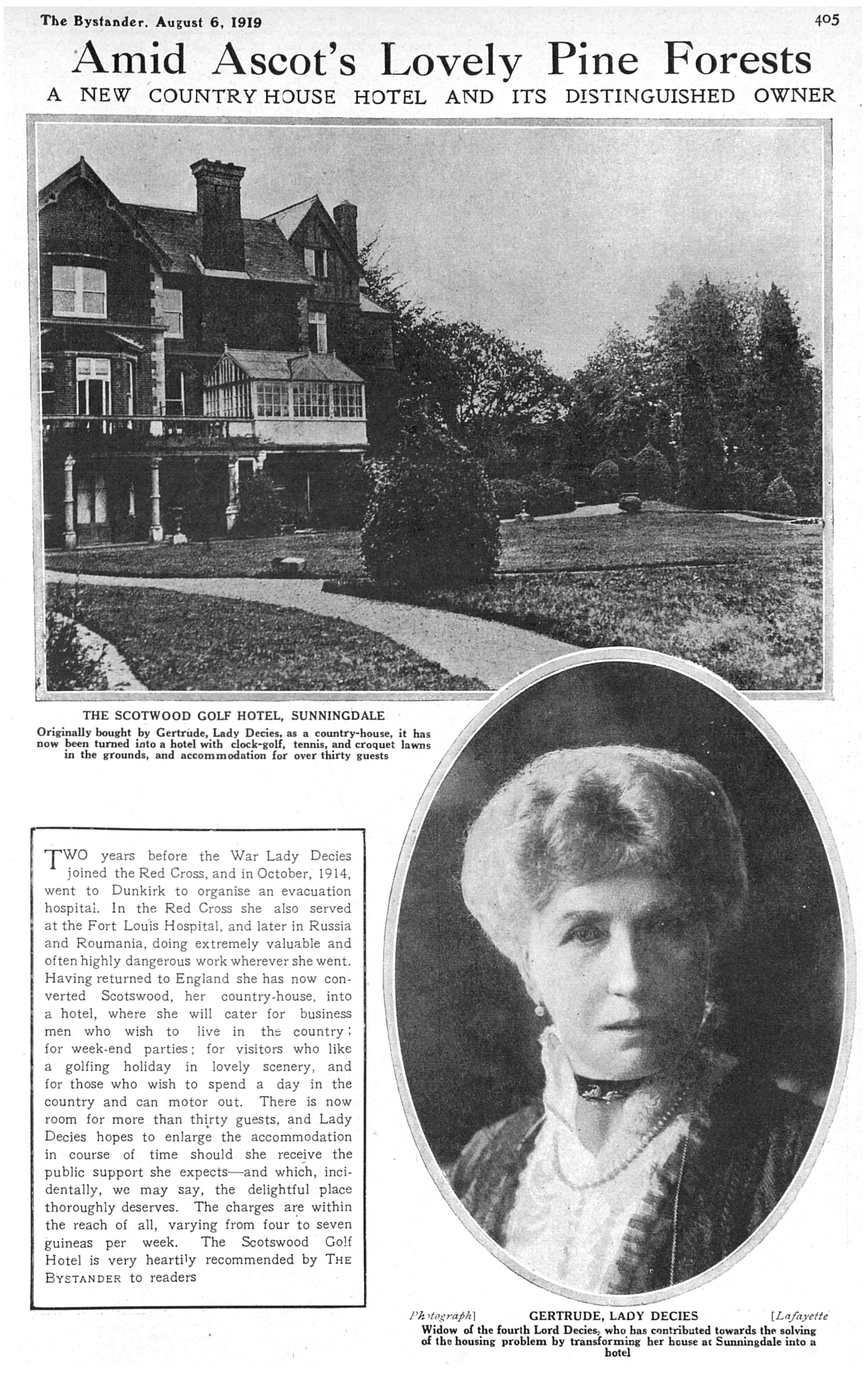
Washington Post, August 15, 1919: Decies Home Now a Hotel. Differing from most of the peers and peeresses of the British realm, who are engaged in selling their ancestral estates and their homes to the highest bidder with a view to escaping the additional taxation on real estate, rendered necessary by the war, Gertrude Lady Decies, widow of the fourth Lord Decies, has turned Scotswood, her country seat at Sunningdale, near Ascot, into a residential hotel, and, opened on the first day of this month, it is already in running order, under her personal direction and management, with a full complement of guests . Within easy motoring distance of London, of Windsor and of the Ascot, Hurst Park and Kempton race courses, standing in about 100 acres of park and garden, it ought to prove a decided success. She has retained for her hotel the former name of her home - that is to say, Scotswood - and she is running it on the lines of a first-class continental hostelry, managing by dint of tact and cleverness, to keep away the vulgar, noisy, new rich element, who through their entire absence of consideration for others do so much to poison life nowadays. This was one of her big mistakes. The new rich may have been brash and lacking in class, but they were now the ones who had the money. The Washington Times on August 1, 1919 quoted her as saying This idea is partly a patriotic effort to assist in solving the housing problem. I have an excellent chef and a good manageress, but I'll supervise everything myself. The price was reported to be what wealthy Americans were prepared to pay.
A description of her character, connections and interests was given in The Washington Post, August 15th, 1919: "Lady Decies Noted for Tact. Gertrude Lady Decies is an extremely clever broad-shouldered, slim-waisted little woman, only sister of the late Sir John Willoughby, renowned in his day as the smallest officer and as the finest boxer in the British army, in which he held a commission of captain of the Royal Horse Guards until his love of adventure led him to participate In the Transvaal raid. She has, like her kinswoman, Lady Marcus Beresford, specialized in tact, and has won for the catteries, which she formerly maintained at Beresford Lodge, Birchington, a seaside resort in Kent, something akin to European fame in connection with her success in breeding prize winners at the various national and international cat shows. She has also gone in for raising Pekingese, and has done a considerable amount of racing, her registered colors being white and primrose. Lady Decies has likewise been a bird fancier, and seems to have a marvelous influence over these feathered creatures, which she is able to teach all sorts of tricks.
Of a very inventive and ingenious turn of mind, and with a pronounced taste for mechanics, she has invented all sorts of toy games and puzzles, which, taken up by the trade, have brought her a considerable amount of money. Then, too, she has studied chemistry, has maintained a laboratory at Scotswood, and has discovered several patent remedies of an antiseptic character, against bites of flies and mosquitoes. - Marquise de Fontenoy.
So in 1920 she again applied from a liquor licence and this was described in the Daily Mirror (9th February, 1920): STATELY HOME AS AN HOTEL. Gertrude Lady Decies Refused Liquor Licence for Hotel. Gertrude Lady Decies applied to the Windsor county magistrates yesterday for a liquor licence for her hotel at Scotswood, Sunningdale. Mr. E. L, Reynolds in making the application said one of the greatest problems at the present time was how to house the people, and in order to render some assistance to the community in that respect Lady Decies had converted her house into a private hotel. There was, however, no intention of having a bar or of supplying drink to persons who casually dropped into the hotel. There was considerable opposition to the application from neighbouring hotel-keepers. Gertrude Lady Decies, giving evidence, said she had owned Scotswood about nine years and opened it as an hotel because of the shortage of accommodation. She herself lived in a cottage, having her meals at the hotel. She had had many invalids at the hotel, and the object of applying for a licence was because she could not give them what they required if taken ill. The hotel was full up in August, September and October. Something like 200 or 300 people could not be accommodated, and she intended to build as soon as she could.
Mr. Harold McKenna (for the opposition): Is your object in running this, place business or philanthropy? - It is to help the housing question, but I cannot, afford to run it at a loss. If there was a little profit attached to it I should not object. I don't suppose anyone would. I should not give it away, should I?
Mr. McKenna: I don't know. That is what I want to ascertain. (Laughter.)
Questioned about the outside public, Lady Decies replied: "I shall not ask them to come, but I cannot refuse them, can I?"
Do you stand to the figures of 200 or 300 people turned away? - We were simply bombarded with letters from August to October.
The application was refused.
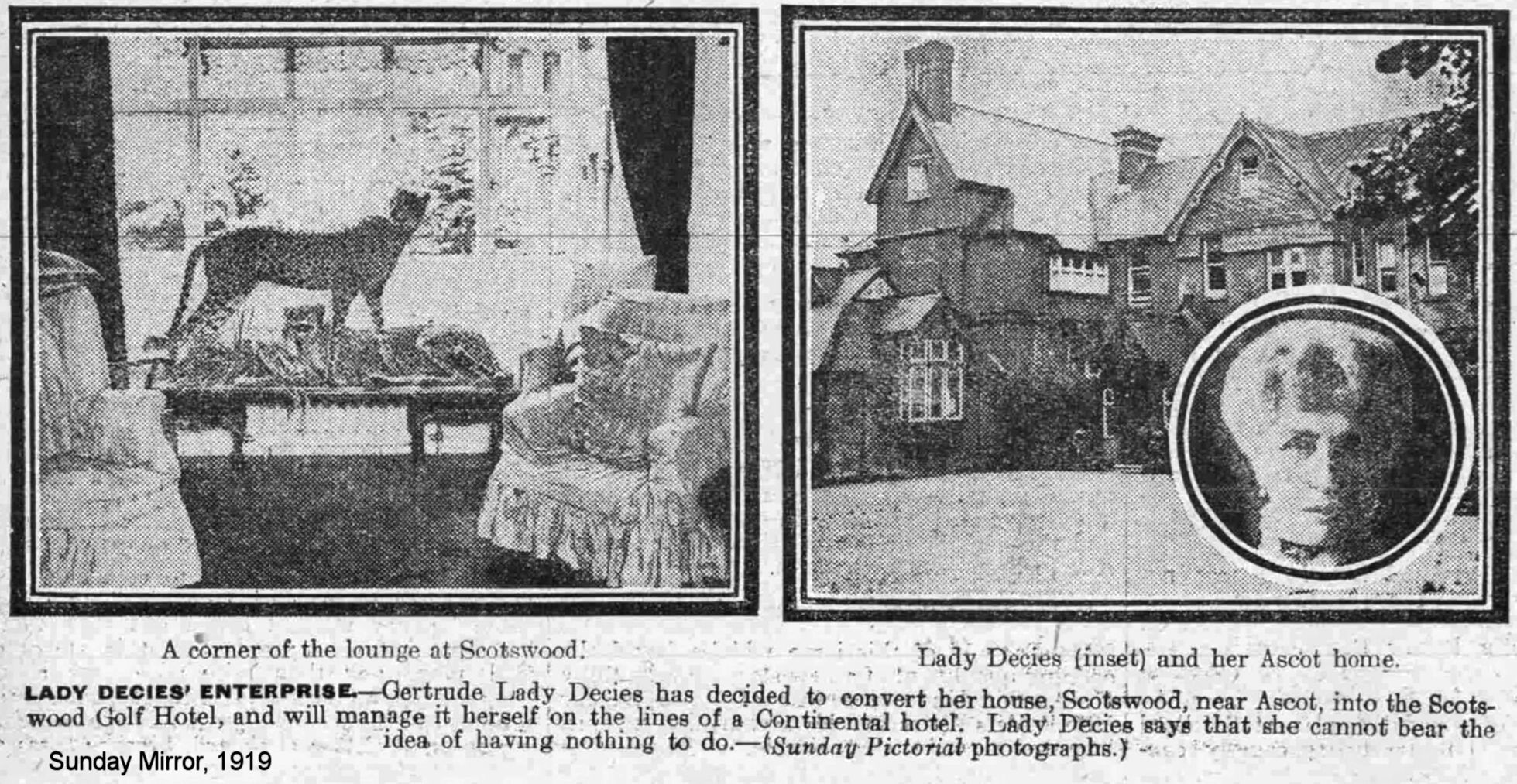
The same author expanded on that report in The Washington Post, August 23rd, 1920: Women's Hotel Venture Costly. If Gertrude Lady Decies, widow of the fourth Lord Decies and sister-in-law of the present peer and of his American wife, eldest daughter of George Gould, has been gazetted in London as a bankrupt, it is as the result of her venture in hotel keeping. Less fortunate than Lady Honywood, who, beginning in a very small way, now owns and managed with rare success a whole string of so-called family hotels in London and in the provinces, Lady Decies, fired by her example to embark in a similar enterprise, has come to grief.
A little more than a year ago Lady Decies determined that instead of joining the ever-growing company of peers and peeresses of the British realm who are engaged in selling outright their ancestral estates and their homes to the highest bidder with a view to escaping the terribly extortionate taxation on real estate rendered by the war, she would convert Scotswood, her beautiful country place at Sunningdale, near Ascot, into a residential hotel. She resolved to manage it herself, convinced that she was a clever business woman and that she was possessed of quite as much capacity in that line as Lady Honywood.
She retained for her hotel its former name - that is to say, Scotswood. She ran it on the lines of a first-class continental hostelry and devoted all her tact and savoir faire to keeping away the vulgar, noisy and new rich element, who in Europe, as in America, do so much to poison life nowadays through their entire absence of consideration for others. Unfortunately it is the new rich nowadays who have the money, and while Lady Decies rendered her hotel very popular among those of relatively moderate means, she failed to make it pay, and it has come to grief. Her bankruptcy, however, will prove a blessing in disguise, for it will relieve her to a great extent of her recent worries and embarrassments and will enable her to return to those means of livelihood in which she formerly made quite a hit. Like her kinswoman. Lady Marcus Beresford, she, even during the lifetime of her husband, specialized in cats [etc]
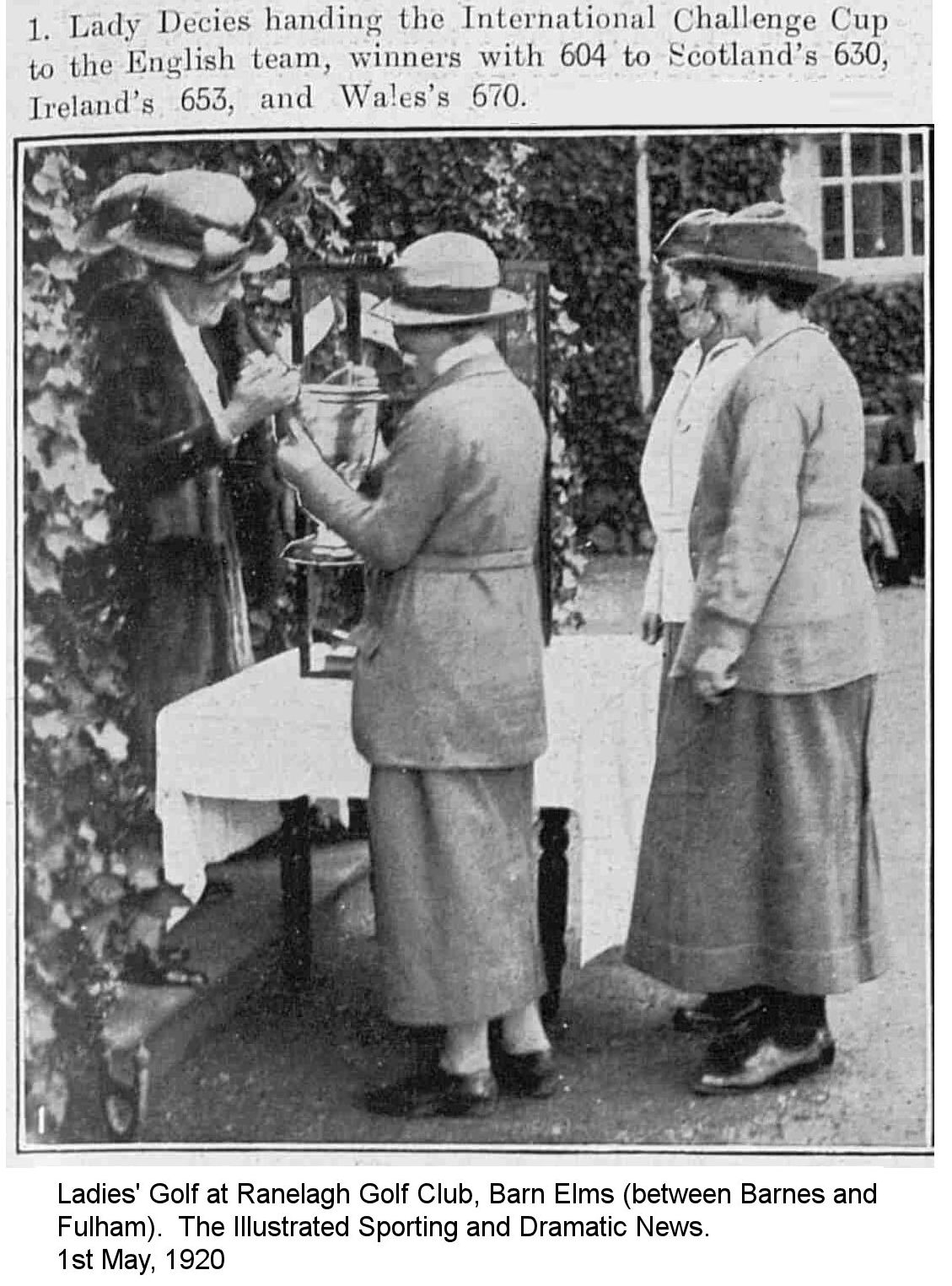
The Milwaukee Journal, September 19, 1920 gives us a bit more information [Her] original ideas which have more than once landed her in rather a conspicuous position. Last year, for instance, she converted her beautiful home near Ascot race course into the Scots wood Golf hotel. She did this because she felt that many of the large country houses in the vicinity should be used to meet the present needs for housing accommodation. Her hotel, however, was not a conspicuous success, chiefly because she was rather arbitrary in her methods, and also because she had modelled the establishment on continental lines which did not appeal to the fancy of her clients.
By August 1920, both her Hotel and Rabbit-breeding ventures were failing and led to a bankruptcy hearing.
The "Hutch"
In January, 1918, Lady Decies returned from Romania and was aware of a food shortage in Britain, especially as troops were returning. She and her sister took an empty shop at 37, Lower Belgrave-street, and started a rabbit-rearing business called "The Hutch." Their idea had been to breed fancy rabbits to provide food and fur, something quite normal in the rabbit fancy at the time, and to capture the German trade, but the business was unsuccessful and was closed in July, 1919. The bright little green shop with its windows full of sleek rabbits was an object of interest to passers-by, and Lady Decies was on hand in a purple overall to give advice. The street is a gentrified area and large number of rabbits on the premises, and their waste products, probably did not find favour with the neighbours. The venture would have been more suited to a rural area. Lady Decies had good ideas, but the implementation of them could have been better. She appears to hve been financially naive, and her experience of organising fundraising garden parties had not equipped her for ventures selling to the general public.
According to The Tatler (20th February, 1918) "Gertrude Lady Decies . . . set in motion a scheme which she had formulated for the benefit of disabled soldiers in the first place and secondarily for the increase of the food supply. Depots are to be started in London and other places, where all instructions on the rearing, food, etc., of pedigree rabbits will be given, showing how these may be kept at a profit in towns as well as in the country. The first of these depots, The Hutch, 57, Lower Belgrave Street, is managed by Lady Decies and her sister, Miss Willoughby, and was opened on June 4." The Daily Mirror (5th June 1918) reported "Gertrude Lady Decies, newly back from Rumania, opened a sort of 'Rabbit Welfare Centre' in Lower Belgrave-street, where one may buy rabbits and learn the best way to rear and market them, though no cookery hints are included." Though a flippant remark, the rabbits were intended for human welfare in the way of food.
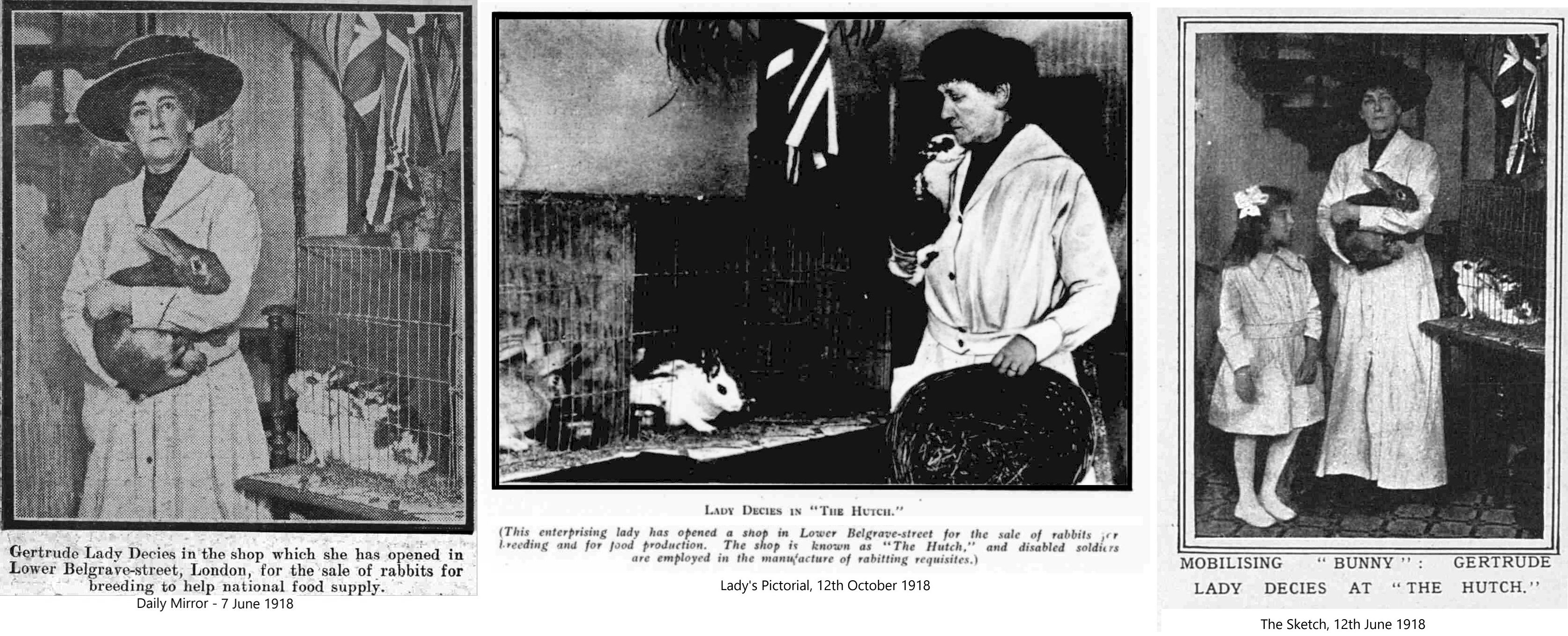
RABBIT KEEPING FOR EVERYONE: GERTRUDE LADY DECIES' NEW ENTERPRISE. Lady's Pictorial, 12th October, 1918
THERE would seem to be no limit to the energy, the adaptability, and the many-sidedness of some women, and Gertrude Lady Decies, upon whom I recently called to hear some particulars of her latest utilitarian scheme, is a case in point. Always a keen lover of animals, before the war she was well known as an exhibitor of Pekingese dogs and bull-terriers, her kennels holding as many as eight champions at one time. But the risk valuable dogs run from certain diseases and from infection at shows was always an anxiety to her, and she determined to find out a remedy, little dreaming that her investigations would one day prove of the greatest value to humans as well. A daughter of the late Sir John Willoughby, whose crusade against infanticide and Suttee in Bombay won him such fame and distinction, she had from childhood been devoted to the study of chemistry, her marriage with the late Lord Decies, himself a clever chemist, still further increasing this taste. For many years she was engaged with him in carrying out experimental and research work in their laboratory at Sefton Park, and as a result of these experiments she eventually discovered five of the strongest germicides known, by the use of which in their proper proportions, and by a secret method of mixing, she managed to produce what has proved to be the most powerful germ-killer and antiseptic yet discovered. This she tried upon one of her dogs, who was supposed to be dying from distemper, and the result was remarkable, for the pain was allayed, and he soon recovered. She found, too, that she could take puppies and kittens of only two months old to the shows with perfect impunity even when cases of distemper had occurred only a few pens away.
But this preparation, which is extensively used now in the majority of kennels, was to attain to a still wider and nobler use. Some six years ago, soon after the painfully sudden death of her husband, Ladv Decies joined the Red Cross, working whole-heartedly and learning all she could, little thinking under what terrible circumstances her knowledge would one day be used. There was no suspicion of war then, but on its outbreak she entered the Marylebone Infirmary, staying there until she had gained four certificates and the St. John's Medal. Then, feeling himself qualified to be of real practical use, she offered her services, which were immediately accepted, and she proceeded to Dunkirk, with the permission of the Commandant, to help in the organising of hospital transport work at the station, in conjunction with the Friends' Ambulance Unit. Conditions were most terrible and difficult in those early days, but with the whole-hearted help of the French officials, and the assistance of Lady Bagot, who arranged for some St. John's Ambulance nurses to come out, order was at last evolved out of chaos, and the organisation was complete.
Soon after this Lady Decies was wounded in the shoulder from a bomb, but she refused to give up, bravely continuing at her work, until she was finally knocked out by the last shell that was fired during the bombardment of Dunkirk. She had left the cellars where all the wounded were placed in order to help the refugees who were pouring into the town, and had remained unscathed until this last day. when the shell burst directly over the heads of herself and a woman and child whom she was befriending. They were practically blown to pieces, and she was so injured that she had to return immediately to England, with the drum of her left ear permanently destroyed, and her nerves in such a state that she was compelled to leave London and live in the country away from all noise for a time to recuperate.
But it was while she was in Dunkirk that she found what an immense comfort her germicide could be to the men. An experiment made, with the permission of the surgeon, on a man who had come in in agony with his feet black with frostbite showed that in a few minutes it brought back circulation, and he was able to sleep in comfort. She relieved many cases of frostbite with it, and proved its value for chilblains, hay-fever, bronchitis, asthma, neuritis, nettle-rash, lumbago, colds, stings, and other troubles of a like nature. It is regularly used now in the trenches and hospitals.
Collecting funds for the Red Cross next attracted her attention, and she devised a clever scheme for utilising the services of dogs and cats by pressing them into the service of the Westminster Red Cross Detachment, giving them service rank and promotion according to the amounts they collected. Two years' labour by these faithful four-footed friends resulted in close upon £1,000 for the Westminster Red Cross. But, strong once again, she yearned for more active work, this time going out to assist in Red Cross work in Russia and Serbia. She went through two Russian Revolutions, and learnt very thoroughly what hardship and danger meant before finally returning to England.
Now she is endeavouring, both by precept and example, to further the crusade for starting centres of rabbit-breeding all over the country, as she sees no reason why, at the close of the war, this country should not be able to supply its own rabbits entirely without having to go to Ostend for the tame variety. To this end she has taken 37 Lower Belgrave-street, and given it the appropriate name of "The Hutch," and here rabbits of all kinds can be seen and bought. She herself is there every day from 10 am. to 6 p.m., Saturday till 1 p.m., to give advice and help, and she has already had success beyond her expectations. She looks upon it as a hobby that is both interesting and remunerative, as, besides the question of food and breeding, the fur of good rabbits is of very real value. In her hutches she has beaver, chinchilla, blue and white fox, stone-marten, silver and black fox, and opossum, and many furriers have already called and expressed their delight. She is starting a fur syndicate, and hopes to get the skins cured and put on the market. She has a scheme whereby wounded soldiers can start rabbit-keeping, and so give them a hobby; both interesting and remunerative, and she has men in Surrey who are already making hutches for her and being trained to manage rabbit farms. One man who is suffering from shell-shock has already a post in view at 30s. a week.
Everything necessary can be bought at "The Hutch," from the hutches, which should be sufficiently large to give their occupants plenty of room, to the necessary bedding and food; the last, to people with even the smallest of gardens, being quite simple, as they can grow so much that is wanted. Absolute cleanliness is a requisite for success, and, given this, a good breed of rabbit, and care taken in the way of regular meals and the right kind of food, there is no reason, Lady Decies says, why people with even the smallest of backyards or gardens should not be able to make a substantial sum, and even a living. But it is necessary to spend a little money on the initial outfit, as very good breeds are needed if the fur - a most important item - is to take its right money-making place in the enterprise.
ALICE C. ROYLE.
This included dealing in fancy rabbit skins.
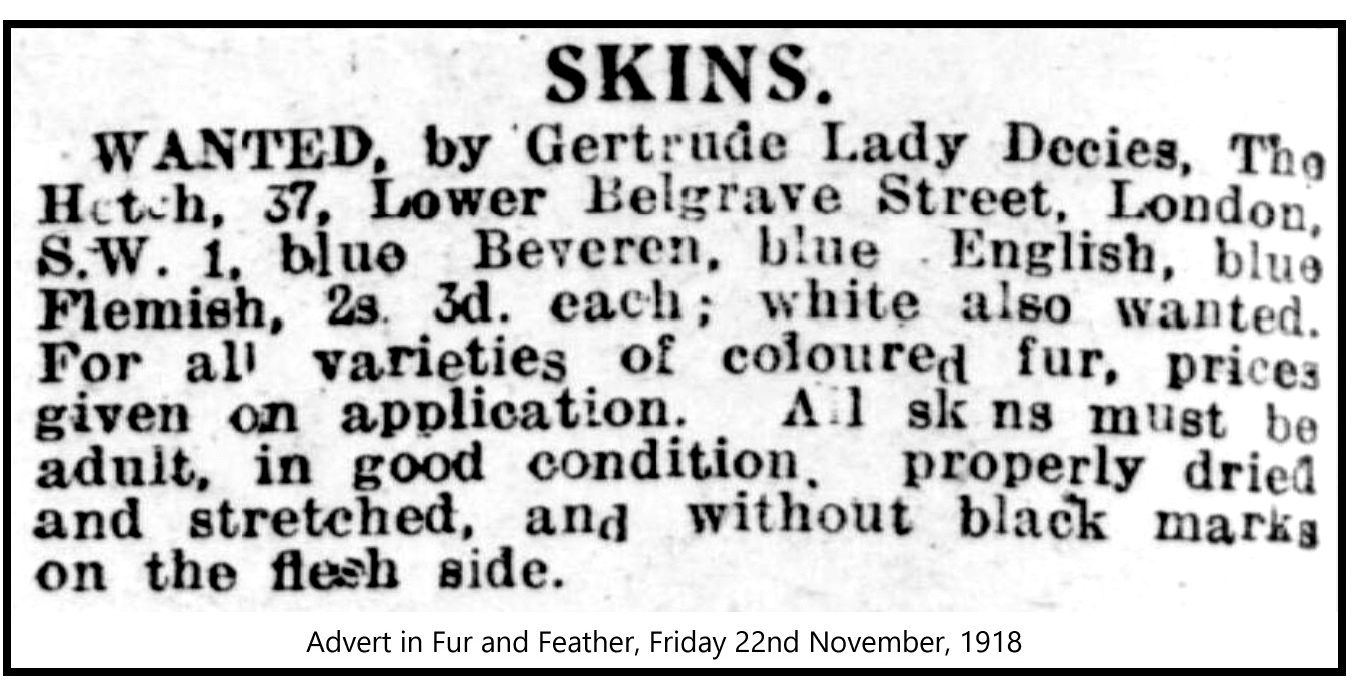
THE LADY AND THE RABBITS. Barnsley Chronicle, 22nd June 1918
You need not despise taking up rabbit breeding as war service because it involves a lot of menial work. Lady Decies does not, she glories in the fact that her rabbits, which she keeps partly at her country seat and partly at a garage in aristocratic Grosvenor Gardens, in London, involve her in a lot of hard work. "Just now," she says, "work in London is rather difficult, as I cannot get a man to help me with the cleaning. A small boy comes in an hour before he goes to school and another hour when he comes home which means that my sister and I get to the rabbitry at six in the morning and remain till eight or nine, and we do the cleaning and the feeding of the rabbits, and serve the customers as well." Lady Decies once used to specialise in Pekinese and cats; she took up rabbits because the Government urged people to breed rabbits; and she sells her breeding rabbits at all manner of prices, from 7s. 6d. to 37s. 6d., and her table rabbits at a figure which returns a good profit.
Many other people had heeded the Government's call to breed rabbits and set up rabbit clubs, and the rabbits obligingly bred, resulting in a slump in their value. Maria Gertrude Baroness Decies's financial woes were investigated at a sitting of the Bankruptcy Court on Wednesday 22nd June, 1921. She seems to have been naïve regarding the loans she took out. On her return from wartime nursing overseas, she had set up a rabbit shop, but soon afterwards there was a slump in rabbits, and the venture resulted in a loss of £300. "I believe." said the Official Receiver, "you were also taken to money-lenders?" "I was," Lady Decies replied. "But at that time I did not know they were money-lenders; I thought they were financiers." She had been in the hands of money-lenders ever since, Lady Decies added. (Aberdeen Press and Journal, 24th June, 1921.)
Gertrude, Lady Decies, who, it will be recalled, opened "The Hutch" at 43, Lower Belgrave Street, S.W., on her return from Siberia, to do her bit when the food crisis was at its worst, has decided to dispose of all her stock, &c., and to bring this excellent venture to an end. Since June 4th, 1918, Lady Decies has sold hundreds of rabbits, one week's takings amounting to £95, and she and her sister, Miss Willoughby, fitted up themselves the whole of the premises at Lower Belgrave Street, and managed it most successfully up to the present time. In addition, disabled soldiers have been trained in rabbit keeping and rearing, and several rabbit farms have been started in Scotland. Some 300 rabbits of every variety remain on hand to be disposed of, and for this purpose application should be made to Gertrude, Lady Decies, at 41, Lower Belgrave Street, London, S.W. (Gentlewoman, 26th July 1919)
The Washington Times, July 19, 1920: "Gertrude Lady Decies is operating the Hutch in lower Belgrade street for the sale of well-bred rabbits. She advocates rabbit growing to help out the meat shortage. She has been operating her town houses for some time as hotels, while her beautiful country residence, Scotswood House, has been turned into Scotswood Golf Hotel. These ventures are run on business lines." The Milwaukee Journal, September 19, 1920 gives us a bit more information "[After her canine collecting corp was unsuccessful] she started a shop called The Hutch in lower Belgrave-st. where she sold rabbits in order to popularize rabbit-breeding as a means of increasing the country's food supply. She also declared that through this means she intended to deprive Germany of a profitable industry, but alas! Lady Decies bunny boom ' went the same way as her conscript army of dogs. She lives over that shop which she called "The Hutch" In lower Belgrave-st, and I am told that there has recently been a good deal of trouble concerning the number of animals she keeps on the premises."
One problem with keeping a large number of rabbits is the soiled bedding and waste products which wouldn't have been an issue in a rural area, but in the gentrified Belgrave Street would have become a nuisance.
BARONESS" RABBIT HUTCH. (Daily Mirror, 24th August 1920): "Lady Decies' Story of Unsuccessful Ventures at Creditors' Meeting. When the creditors of Maria Gertrude Baroness Decies met yesterday under a receiving order made on the petition of money-lender, the Official Receiver said that the estimated liabilities were £27,000. Lady Decies had stated that in July, 1918, she and her sister had opened a rabbit breeding business called "The Hutch" in Lower Belgrave-street, the idea being to provide food and fur and to capture the German trade, but the venture was unsuccessful. [Scotswood Golf Hotel also being wound up] A trustee was appointed to administer the estate in bankruptcy."
Bankruptcy
The Washington Post of 26 September, 1920 gives a detailed account of her bankruptcy a decade after her husband's death.
BARONESS FAILS WITH HER HOTEL. Lady Decies Admits She Is Bankrupt When Hostelry for Golfers Is Not a Success.
London, Sept. 25. Probably all America already has heard of the unhappy fate of Maria Gertrude, Baroness Decies, whose affairs are now engaging the attention of the official receiver. It fills the press and keeps the gossips busy here. Lady Decies attributes her failure to the non-success of a rabbit breeding business and later of a hotel for golfers into which she converted her private residence at Sunningdale in the latter part of last year. She estimates her liabilities at the hefty sum of $135,000, whereas her assets are represented by an inconsiderable and at present largely problematical amount. Considering that after her husband's death, in 1910, she inherited an estate worth about $425,000, she has contrived to do rather badly, but it is undeniable that, as the saying goes, she has had a run for her money.
There happen to be no less than three fair bearers of this title in England at the moment. One of them is the former Vivien Gould, daughter of George Jay Gould, of New York, who married the present Baron Decies, the fifth of his line, in 1911. Another Lady Decies is the widow of the third baron, while the picturesque subject, of this article is the widow of the fourth. She is thus a sister-in-law of the American baroness, but remains very different. Previous to her marriage, in 1900, she was Miss Maria Gertrude Willoughby, daughter of the late Sir John Willoughby.
Lady Decies claims that the latest of her many business ventures - her hotel for golfers - would have been successful save for the fact that in July last the mortgagees appointed a receiver, who took possession and sold the property. She adds that her failure was due to the fact that for many years she had advanced large sums to her late brother, Sir John Willoughby. In this way she exhausted her own ready money and went to money lenders. Since then, she states, here securities have been realized little by little until there was nothing left. Her claim against Sir John Willoughby's estate has been admitted for £125,000, but this claim, it is stated, can only realize something like five-pence in the pound. The recent receiving order against Lady Decies was made on the petition of a money lender.
Her talents are many, her energy and resourcefulness boundless. Before her marriage she had invented games and puzzles that proved both clever and profitable. A few years ago she devised a new remedy called "No Germo, which was designed as a preventive against the bites of flies and mosquitoes and also as a safeguard against influenza. It is, however, as an animal lover and breeder that Lady Decies is best known. She has run the gamut of horses to rabbits, taking in cats, poodles, pekingeses and even bullfinches on the way, and a pretty penny they must have cost her, from first to last. She was long in the first rank of cat fanciers, and one of the most active members of the National Cat Club committee. Her aristocratic pussies were almost invariably prize winners.
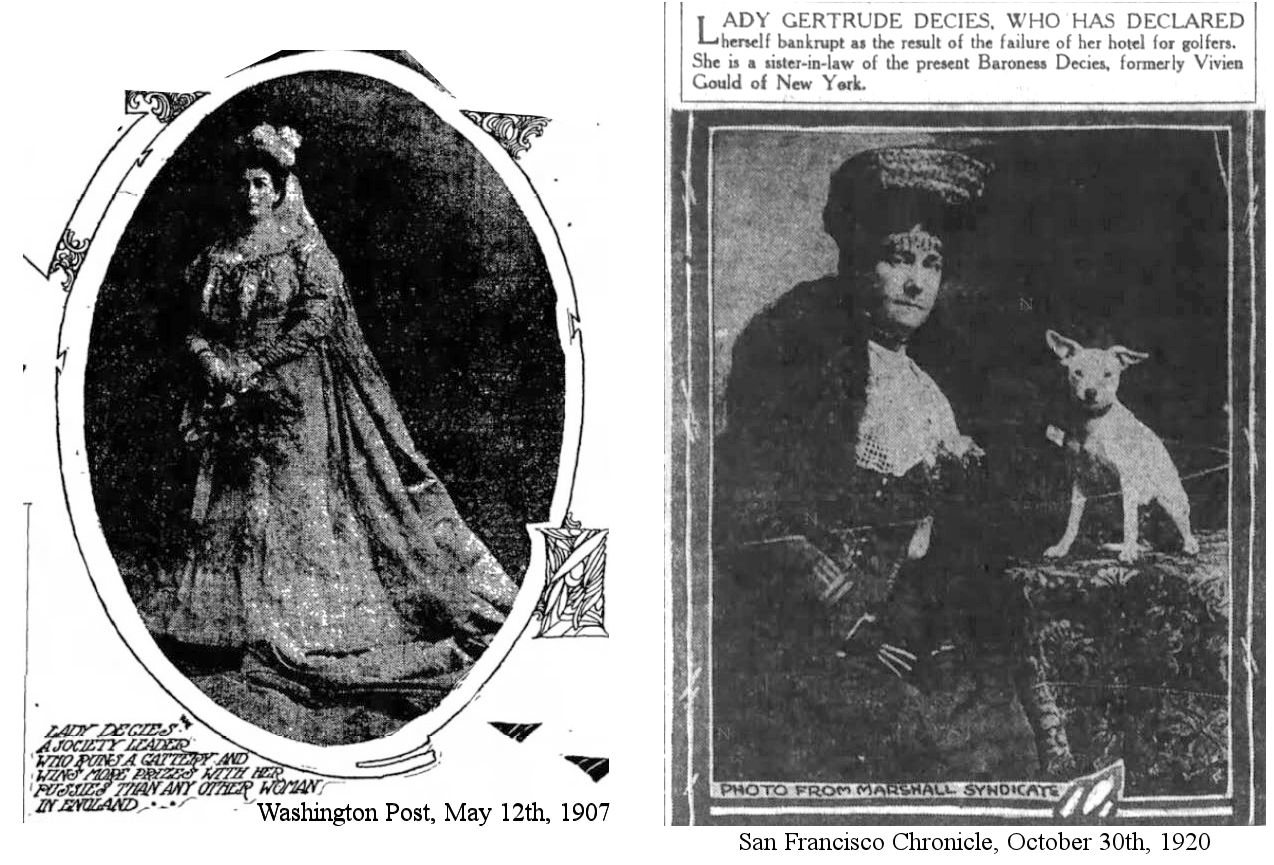
She had given her brother £125,000 in handouts (equivalent to £7million in 2025), but she would be lucky to get £625 (equivalent to £35,700 in 2025) from his estate. Had she not bankrolled her brother - who, in 1883, had paid the equivalent of £1.4 million for a racehorse - she would have remained a very wealthy woman. (Class and money don't go hand-in-hand in Britain - being a member of the nobility and having a hereditary title does not necessarily mean having wealth and there have always been impoverished aristocrats, who remain aristocrats regardless of their reduced circumstances.)
These are some of the notices that were published in the USA as a result of her bankruptcy: "Gertrude Lady Decies, recently declared a bankrupt in England, is a sister-in-law of the present Baroness Decies, formerly Vivian Gould, of New York, Lady Decies spent a fortune on pets which us said to account for her present financial difficulties." (November, 1920) and "British Peeress In Bankrupt Suit. Sister-in-Law of Gould's Daughter on Financial Rocks. LONDON, Aug. 14. A receiving order in bankruptcy has been made in court against Lady Mary Gertrude Decies, widow of the fourth Baron Decies and sister-in-law of the present peer, whose wife was Vivien Gould, of New York. She was the daughter of Sir John Pollard Willoughby and married the late Baron Decies in 1901. He died nine years later."
The same report (with minor additions) appeared in the San Francisco Chronicle, October 3rd, 1920, accompanied by a photo of Lady Decies. The [London] Times of March 17, 1921 tells us "A sitting had been appointed to be held in the Bankruptcy Court yesterday for the public examination of Maria Gertrude Lady Decies, who was adjudged bankrupt on August 18. A statement of her affairs showed gross liabilities of £56,280, expected to rank for £26,650, against assets valued at £3,648. Mr. E Parke, Assistant Official Receiver, said that he had received a medical certificate that the debtor was too ill to be present. He understood that the trustee in bankruptcy had begun an action against moneylenders, in which be expected to recover a large sum, so that in any case it was undesirable that the examination should proceed. The sitting was adjourned to June 22."
The sitting took place and was reported in The Times of August 24th, 1920: "The Affairs of Gertrude, Lady Decies. Rabbit Rearing and a Golf Hotel. The first meeting of creditors was held yesterday at Bankruptcy-buildings under a receiving order made on August 9 against Maria Gertrude Lady Decies, of Lower Belgrave-street, W.. The order was obtained on the petition of a West-end moneylender. Mr. E. Parke, Assistant Official Receiver, who presided, said that the debtor had attended for preliminary examination, and had stated that when her husband died in July, 1910, she inherited his property, worth about £85,000. In 1911 she bought for £8,500 a house and an estate at Sunningdale known as Scotswood, on which she spent nearly £16,000. When war broke out she volunteered to serve as a nurse, and afterwards went to France. She returned wounded in May, 1915, and after she recovered she served in a military hospital in England until May, 1917, when she went as a nurse to Russia and Rumania. In January, 1918, she and her sister took an empty shop at 37, Lower Belgrave-street, and started a rabbit-rearing business under the style of "The Hutch." Their idea was to provide food and fur and to capture the German trade, but the business was unsuccessful and was closed in July, 1919. In that month she converted her private home at Sunningdale into an hotel under the name of the Scotswood Golf Hotel. She contended that this venture would have succeeded, but in July last the mortgagees appointed a receiver, who sold the property.
The debtor attributed her position to the fact that she had advanced large sums of money to her brother, the late Sir John Willoughby. These advances, which were spread over a number of years, exhausted all her ready money and led her to resort to moneylenders. In November last the moneylenders began to press, and since then she had gradually realized all her securities until there was nothing left. She estimated her liabilities at £27,000. The Assistant Official Receiver added that he could make no reliable estimate of the debtor's assets. The estate of Sir John Willoughby was being wound up in Chancery, and he understood that the debtor's claim against it for £40,000 had been admitted for £25,000. The other assets included two annuities and a number of shares. All the shares, however, were charged to creditors.
Mr. Coote (H.'s. J. Woodhouse and Co.), for the debtor, said that his client's financial troubles arose from the fact that Sir John Willoughby died hopelessly insolvent in answer to the Assistant Official Receiver, he said that the debtor's claim against Sir John Willoughby's estate might realize something like 4 and a half pence in the pound. The debtor had been adjudged bankrupt, and the creditors appointed Mr. David Hart, accountant, as trustee of the estate.
The Tea-Garden and the Village Shop
Then in the Bridgeport Telegram of October 14th, 1924 comes this: "Lady Decies, Once Wealthy, Reduced to Earning Living. London, Oct 13 [1924] - Lady Maria Gertrude Decies, widow of the fourth Baron Decies and sister-in-law of the present Baron, who married Helen Vivian Gould, is said by the Daily Mirror to be living in poverty, making an insufficient livelihood by keeping: a small village Store near East Grinstead. Her ladyship is quoted as saying that she has not a penny except what she makes in her shop and that she is sometimes hungry owing to the smallness of her income. She declares she lost all her money in helping another and that she would be grateful to any one providing her with remunerative employment."
November 22 1925 (various): Lady Decies, Broke, Runs a Shop. Reduced to absolute penury by the loss of all her money through helping a friend and still suffering from the wound she received during her war service in France, Gertrude lady Decies, widow of the fourth Baron Decies, is now struggling to support herself by keeping this little shop near East Grinstead, England, where she sell penny candles to village children, dispenses tea for passing cyclists, and runs a country boarding house for dogs.
Milton Bronner, NEA Service Writer interviewed Lady Decies and his article was published in American newspapers in March 1925: "BARONESS NOW SELLING TEA AT ROADSIDE. Tuppeny Tip More Useful Than Medals to Lady Decies. Dane Hill, England.
Gertrude Dowager Baroness Decies - and thus connected by marriage with one of the oldest families of the British Nobility and with the purse-proud [ostentatious], millionaire Gould family of America - serves hot tea to thirsty motorists and is thankful for a tuppenny tip. She told me so herself. And judging by her looks, the appearance of the house, and every-thing connected with it, there was no faking about it.
The woman, who once presided over a castle, is now very glad to have shelter in an old house - and once didn't even have that. When her husband, the fourth Baron Decies died, as their little son was also dead, the title and estates passed to her husband's brother, the present and fifth Baron Decies. The latter a year later married Helen Vivien Gould, daughter of George Jay Gould of New York. Decies and his American bride are in high society. Their sister-in-law is buried in this isolated little place in the Sussex hills, nine miles from the nearest railway. The Decieses regale themselves with opera in the season. Their sister-in-law, when she has time, listens to the music of an old phonograph. Lady Decies, one helper says her rich relatives have done nothing for her. But she is mistaken. They once sent Lady Decies a picture of the pretty Gould girl who became the fifth baroness!
As I entered the poor little parlor I saw the photograph on the center table in a silver frame set with brilliants. That parlor itself told the whole story of the tenant of the house. Carpet - old and faded. Wall paper - stained. Chairs - sagging. But here and there were the relics of the owner's former prosperity. A rich gilt-framed mirror, a tabouret inlaid with mother of pearl, costly miniatures of Cecil Rhodes and other famous men and women she had known years ago. And medals, lots of them, that she had won when she exhibited her prize Pekinese dogs in the days of her affluence.
There's no use grousing, said Lady Decies, a sad smile wrestling with the wrinkles of care in her face; I am broke and alone and have to do just the best I can. Everything has gone wrong since I lost my husband. I had a small fortune, but lost it helping a friend. [Note: too tactful to mention it was her brother who bled her funds dry] I know a great deal about dogs, so I started a London shop for the sale of Pekinese. That failed. I opened a hat shop and that failed.
Then came the war and I went to France as a nurse and was wounded in the shoulder by shrapnel. When I recovered I went with the London Scottish into Russia and was with then in their retreat. That got me some aches, some wounds and some war medals, but no pension. And you can t live off of your medals. I started a hotel and that failed. Then I was really down and out. I lived for six months in a hut in the corner of a field and had to sleep with a raincoat on when the rain poured through the roof. Then I came here and took this place. We sell hot tea to motorists and cyclists, candy to the neighborhood children, and take care of valuable dogs of London people who want them out in the country for a bit. They know I know all about dogs and love them.
Things go quite well in summer, but in winter when there are not many people traveling the roads, it's hard. I would like a job if possible this winter. I could be a companion chaperon to some young girl whose people want her to travel a little. Here Lady Decies - who often makes the tea, butters the toast, washes the dishes, and waits on table - was called away to see what a cyclist wanted. He wanted tea, and lots of it. And plenty of water, he added peremptorily. When he finished, he complimented her: You're an energetic sort of body. Hope you get along all right. Here's tuppence tip and good luck to you.
'I need it,' said Lady Decies fervently as she pocketed the pennies."
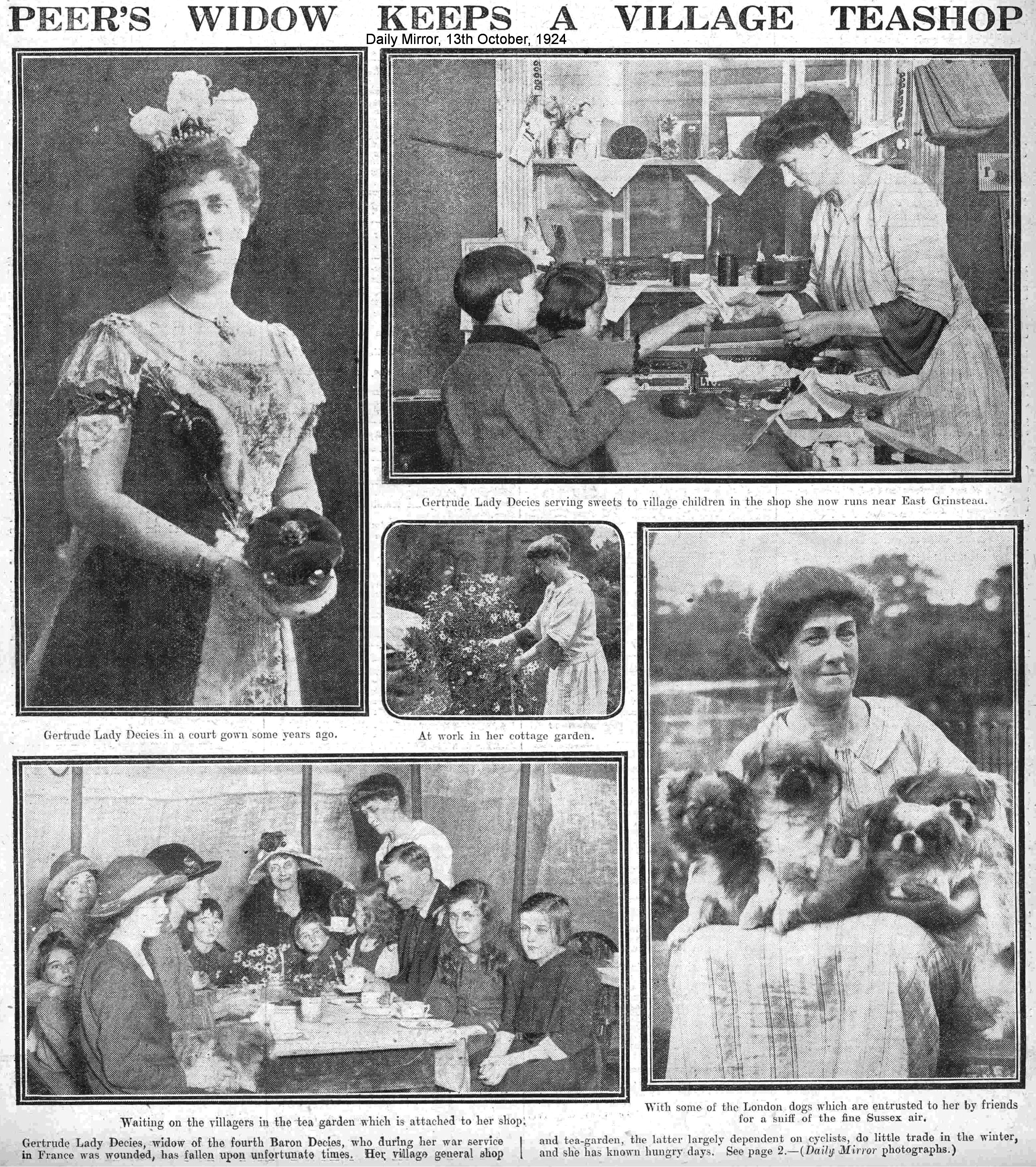
TITLED KEEPER OF TEA-GARDEN. (Daily Mirror, October 13, 1924)
Without a penny in the world - to use her own phrase - Gertrude Lady Decies, who was wounded during war service in France, keeps the Dane Hill Tea-Gardens near East Grinstead. The gardens include a general shop and a home for dogs. Business is not good in the winter, and Lady Decies knows the hardship of hungry days. She lost all her money through helping a relative. Her tea-garden profits are small, and when no cyclists are on the road, nil.
"The best luck I could have is to find a job," she told The Daily Mirror. She would like to be chaperon to a young girl.
A few miles from [East Grinstead] along the Brighton road, Gertrude Lady Decies keeps Dane Hill Tea Gardens, which include an all-sorts, shop and a country home for London dogs in need of a sniff of fresh air. Her customers are cyclists and the village children, and her guests, the dogs, belong to friends who are trying to help her in her great distress. I have described her position in this manner, because Lady Decies is not ashamed of her poverty.
"I do not possess a penny in the world," she said, ''except the small profits which I make out of selling tea and sweets and packets of cigarettes. Very often there are no profits at all. During the winter months the cyclists do not come, and I have known some rather hungry days."
Nevertheless, she insisted that I shared her frugal lunch, of cold mutton and salad, which she had prepared herself, and during the meal told me of her fortunes and misfortunes since she was wounded in France and escaped from the revolution in Russia.
"I lost all my money through helping a relative," she said, ''and since then I have tried to keep going without asking any relatives to help me. I started an hotel, but it failed. Then I lived for six months in a hut in the corner of a field, and had to sleep with a mackintosh on when the rain poured through the roof. After that I came here, and, although Scott - an old servant of mine, who refuses to leave me whatever happens - and the people in the village have helped me splendidly, I cannot say that I have made a fortune out of it."
When lunch was over she showed me the neat kitchen garden and the tables set for tea. Some village children were there eating quantities of home-made cakes and jam made by Lady Decies. There were no cyclists there, and the proprietress of Dane Hill Tea Gardens seemed to miss them.
"They make the place seem so busy," she said, "when they shout to me, 'Hi, miss, when are them cakes coming along?' or 'Buck up, missie; I've been waitin' 'arf an hour for some 'ot water.' One of them paid me a compliment when he had finished his one-and-fourpenny tea of bread and butter, cakes, jam and cress. 'You're an energetic sort of body,' he said. 'You ought to get on.' I replied that I was trying hard. 'Well, here's twopence for you,' he said. 'And good luck.' "
Before I left Lady Decies gave me a bunch of Michaelmas daisies, and I wished her good luck, too.
"The best luck I could have," she replied, '"would be to find a job. "I don't care what it is, but I would like to be a chaperon to a girl who wants to learn a few things. I could introduce her to several people and help her along in many ways. Do you think there is anybody who would give employment to an out-of-work ex-Service woman?"
The Gossip Column and an Imposter
During the early 1920s she became a special correspondent to The Washington Post (who syndicated her work to other papers) and wrote regular articles on English high society, society events and what the fashionable were wearing. Knowing her audience, she frequently mentioned American and Anglo-American society.
Time Magazine, 1st September, 1924 wrote "Gertrude, Lady Decies, is the name of that journalist wife of the fourth Baron. Last week, she said in the Daily Mirror, Manhattan gum-chewers sheetlet: 'From a friend actually at Court, I learn that the former Emperor of Germany has been making personal overtures to resume friendly relations with King George and Queen Mary. He has personally written to King George, but no return gesture is likely to be forthcoming. The ex-Kaiser has recently bought all the available pictures of the Prince of Wales, in whose doings he affects a genuine interest. '" (I have not been able to find the article it refers to.)
Because she was a regular news correspondent, American newspapers picked up many snippets about her. On September 29th, 1927, American newspapers reported Gertrude, Lady Decies, figured tonight as one of the principal witnesses in a sensational crime in an eastern suburb of London which cost the life of a policeman. Lady Decies was awakened in the early hours of the morning by the sound of revolver fire. She was able to testify that there had been a shooting, but could not identify the supposed assailants. The policeman was shot to death by supposed automobile thieves whom he intercepted as they were trying to escape with a stolen machine. Gertrude, Lady Decies, is a regular contributor to the Sunday News-Tribune, writing of London society events.
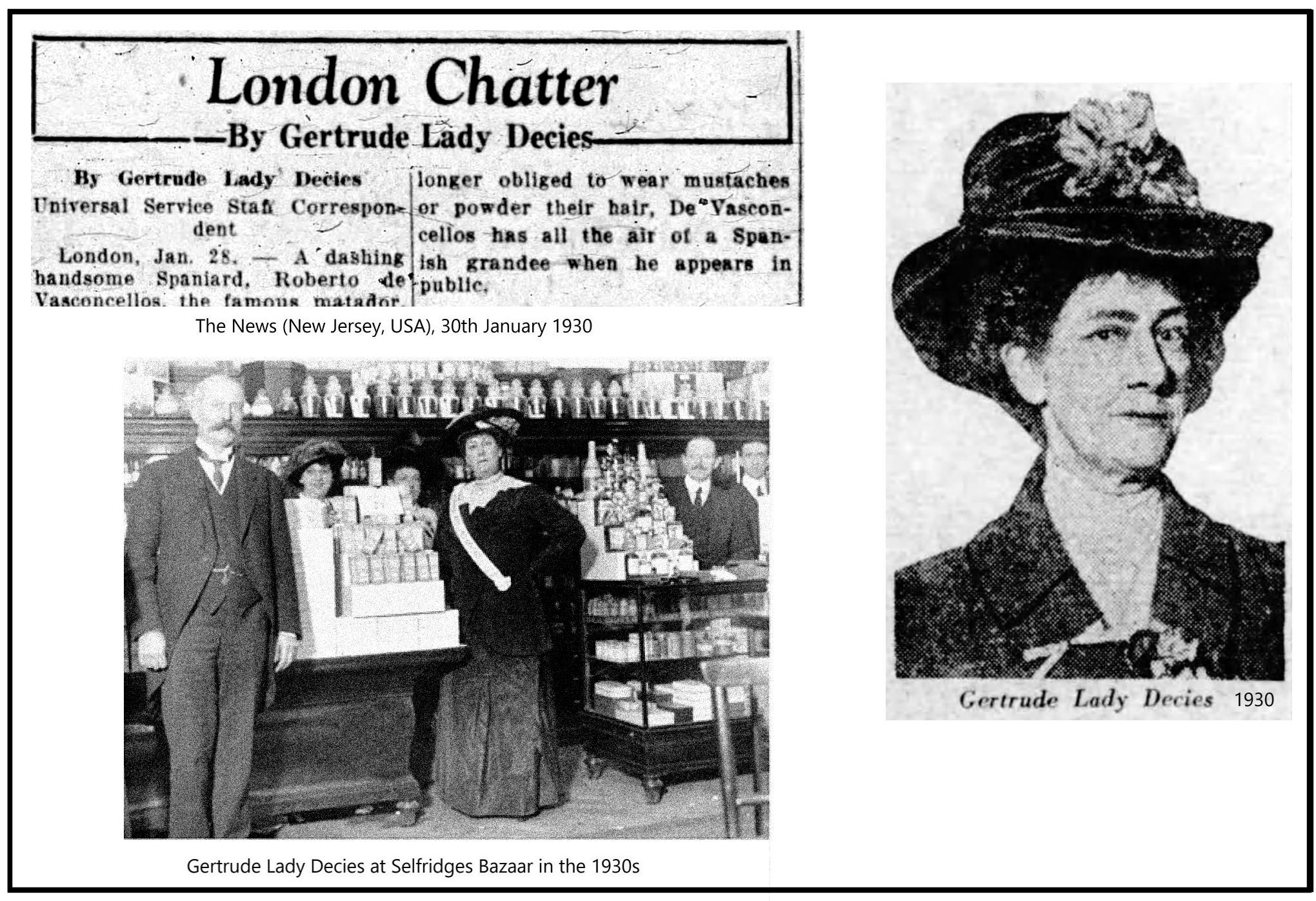
During the 1930s she wrote a "London Chatter Column" that appeared in a number of American and Australian papers. This was a society gossip column about who was visiting London and the fashions of the season. She emphatically denied authorship of a Royal gossip article that appeared under her name and, considering the apparently tasteless content compared to her refined London Chatter Columns, it certainly seems that someone had used her name.
In the column attributed to her and published in The New York American (September 1930) and reprinted in (among others) The Adelaide Observer, Australia, 20th November, 1930 and The Northern Miner, Queensland, Australia, 3rd December, 1930, "Gertrude Lady Decies" gave details of a supposed pledge that the Prince of Wales had given to the Duke and Duchess of York that he would marry within a year if the Duke and Duchess's second child was a girl. "Now that the Duchess of York, with a devotion to the British Royal line which may transcend American understanding, has given birth to a second Princess, all eyes are turned upon the Prince of Wales. Will the Prince make good his pledge those closest to him know he gave to his brother and sister-in-law, the Duke and Duchess of York, that if a male heir to the succession failed he would put aside his personal feelings and marry within a year someone who may bear a son to succeed him on the throne of the British Empire." The article alleged that "Edward P" had realised his responsibilities although his instincts were to remain a playboy bachelor for "unnumbered years to come."
"Then Gertrude Lady Decies adds many intimate details about the Duchess of York and the Prince of Walls, which, though not couched in offensive terms, are in very bad taste. Unfortunately (says an English paper) such an article would be accepted abroad as being based on reliable information, whereas it contains nothing but conjecture and irresponsible gossip. Gertrude Lady Decies . . . has had a varied career. Since 1918 she has been hotel proprietress, rabbit breeder, shopkeeper and tea garden owner. She went through the Bankruptcy Court in 1920, when her unsecured liabilities were £26,680, with assets valued at £3648. An application was made for her discharge in bankruptcy was made to the court in October 1921, and her discharge was suspended for two years . . . Recent years have seen Gertrude Lady Decies living in Essex. Three years ago she had - at the time of the Gutteridge murder - a small house close to the spot on the Romford-Ongar Road where the police constable was murdered. Teas were sold in the garden there. Another business enterprise in which she was interested was a woman's hairdressing establishment in a tiny cottage in Romford."
The Daily Express, 3rd October 1930, ran an article as "ROYAL FAMILY SECETS. SILLY GOSSIP IN A NEW YORK PAPER" with a photo of Lady Decies, and referred to a "preposterous report concerning the Prince of Wales which fills the larger part of a page in a recent issue of the 'New York American.' The name of Gertrude Lady Decies, whose home is a farmhouse where teas are sold, near Sawbridgeworth, Herts, appears as the author . . . published under the date line 'London, September 1930.' Yesterday this article was being offered for sale in London by the agents who bought the copyright. It is suggested that the article shows intimate knowledge of the marriage plans of the Prince of Wales. There is, of course, not the slightest official basis for this. The article is an example of the king of foolish gossip which is served to the American public about the Royal Family. British people will resent its whole tone . . . [his pledge] that I a male heir to the succession failed to arrive he would put aside his aversion to marriage and take a bride? . . . Many intimate details about the Duchess of York and the Prince of Wales. The yare of such a nature, although not couched in offensive terms, that, on the score of taste, they would not be published in any British newspaper. One passage about the Duchess of York would cause the greatest distress."
The Daily express article helpfully tells us that after her woman's hairdressing establishment in a tiny cottage in Romford she moved to a house called "The Grange," an old place at Warren Street, on the main Chelmsford road, not far from Brentwood.
On October 8th, 1930, The Bystander tells us that the absurd stories of the Duke and Duchess of York and the Prince of Wales' marriage plans had been syndicated by the Hearst press [New York American] paragraphist under the name of "Gertrude Lady Decies" and that it no doubt find its way into the album of press cuttings about his possible marriage kept by the Prince. The Bystander noted that his name had been linked with many women.
Lady Decies issued a press release denying authorship of the American article. I have combined the two edited version from the Daily Mirror (4th October 1930) and Edinburgh Evening News (same date): A Central News message from Le Touquet states that Gertrude Lady Decies, who is staying there, denies that she is the author of an article in an American paper which alleged to give intimate details regarding the Prince of Wales and contained other supposed Royal Family "secrets." She said "I am not the author of the stories about the Prince and other members of the Royal Family published in an American paper, and I have no knowledge as to their origin. That is the truth, and you can take my word for it.
The "Green Pastures" Debate
In 1936, Lady Decies triggered a debate in the press when she expressed her horror at a film that portrayed God as a black man. At the time, many still held the prevailing view that white people were the superior race. The Daily Mirror of 7th November, 1936 carried a letter from Lady Decies that would be seen as racist by modern standards.
"FROM GERTRUDE LADY DECIES. I have read with horror about the banned film that portrayed God. What blasphemy to picture him as a negro! We should think of Him only with the utmost reverence. Man cannot portray Him in any form. He is the supreme Almighty being, and Man's ideas of Him can never be adequate. I have been on my back for nine months with a fractured thigh (in agony), but though I never enter into controversy in the Press I could not help expressing my views on this subject. I am certain these views are shared with many Christian people. Gertrude Decies. Meopham, Kent."
This triggered a correspondence that continued for several days in the Letters column. For example on the 9th November, 1936, John M. Turner of Grove Hall Court, St. John's Wood responded "You publish a letter from Gertrude Lady Decies, who is 'shocked' to ready about a film which portrays God. Her horror is deepened because He is portrayed by a negro." Having seen the film in the USA he wrote "I do not see that there is anything that could offend any but the most narrow-minded" and that the whole cast was black and it portrayed a "negro's idea of heaven." D McPherson wrote "So Lady Gertrude Decies is horrified at the idea of Gd being pictured as a negro. Why should it be blasphemy for a coloured man to imagine that his Maker is also coloured?" A correspondent using the pseudonym "Theologian, Camden Town" wrote "With personal memories of Palestine in mind, I find it difficult to understand the attitude of Lady Decies that a negroid conception of the Deity is blasphemous" and pointed out that the Bethlehem Jews would not have been white.
On the 11th November, the correspondence triggered by her letter rumbled on with J.R. Morley agreeing with John M. Turner that the negro spiritual film "Green Pastures" was in no way offensive or blasphemous. The Editor declared the correspondence closed on the 13th of November with a letter from Arthur Ellen who pointed out that in dwelling the previous correspondents actually missed a more important theological point: the Second Commandment forbids man to liken God to anything in heaven or earth.
Her own letter, also on 11th November, read "I wish to thank all those who have so kindly written to me in appreciation of my letter in the Daily Mirror. But I feel I should explain that some of your readers have misunderstood my meaning. My horror is not at the picturing of Almighty God as a negro, but that He is portrayed in ANY way by man. No man has ever seen Him or can imagine what He is like, and to portray Him in a film is blasphemous. I am the last person to underrate a negro of any coloured person. - Gertrude Decies.
The Second World War
Her life changed again when, in 1936, she founded the Lady Decies Unit, working with the Red Cross, to aid soldiers injured in the war in Abyssinia. By that time, she was already treating woman patients at her nursing clinic at Lower Belgrave Street, London.
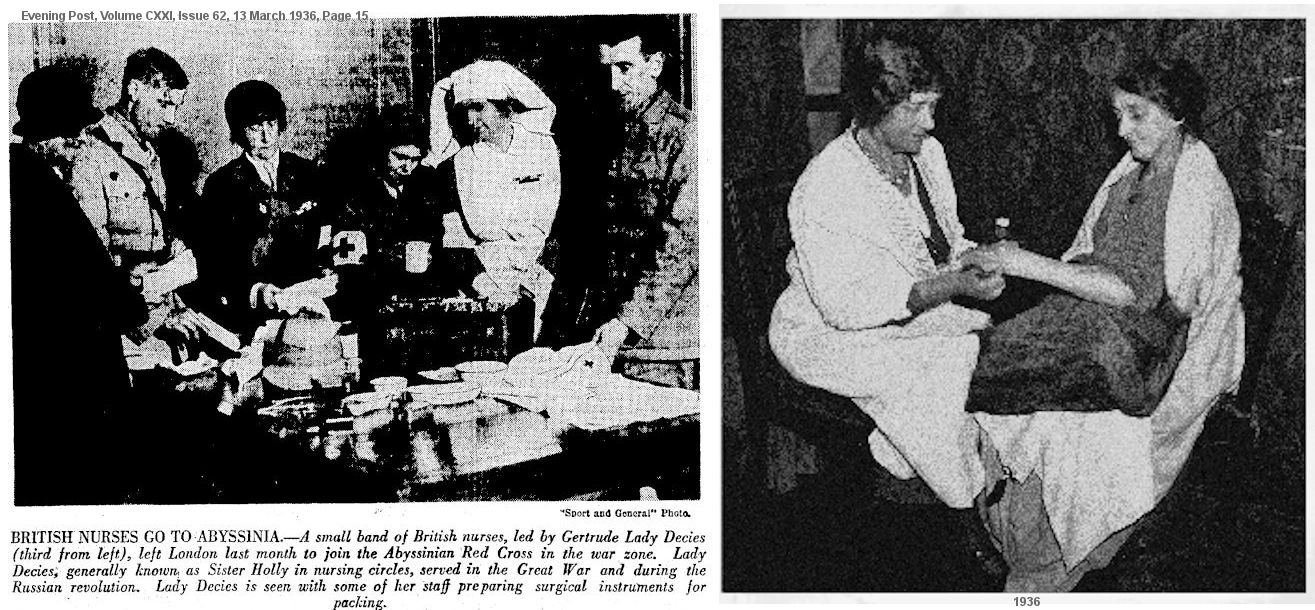
Aid For Ethiopian Wounded. The British Journal of Nursing, Page 50, Vol 84, February 1936: To the Editor Madam, - The British public, quite apart from any question of partiality towards either contestant in the present East African tragedy, are deeply concerned about the sorry plight of the Abyssinian wounded, both military and civilian. The undeniable shortage of skilled surgical aid, both in field and base hospitals, is in a measure due to the complete absence of trained women nurses. The British Red Cross have been unwilling to assume the responsibility of sending out women nurses under their aegis, and, while it is not difficult to appreciate their point of view, the lack of skilled aid for the wounded, especially feminine aid, is producing heartrending suffering that might be avoided. Lady Decies, who rendered valuable services to our Own wounded during the War as a Red Cross nurse, has formed a small voluntary unit of skilled women surgical nurses, and the Emperor has gratefully accepted her offer to bring them to his country, where they will serve with the Ethiopian Red Cross under the Empress and Lady Barton, wife of the British Minister, Their arrival is now most eagerly awaited.
For the purpose of equipping and transporting the Lady Decies unit a fund is being created out of donations from the sympathetic public, and I have the honour to be chairman of the fund. I feel that the existence of the fund and its objects are matters worthy of the notice of the public, and I write hoping that you may draw the attention of your readers to it. We have succeeded in raising £200 towards the £12,000 minimum required to enable the unit to leave England, but further sums are most urgently needed. I would gratefully acknowledge any donations towards completing the balance. Lady Decies and her band of nurses are ready to start as soon as the fund is complete.
The sufferings of the animals must surpass imagination, and I am glad to say that the unit will include a qualified veterinary surgeon and will take out veterinary equipment, including humane killers, The Animal Defence Society has opened a subscription list for this purpose.
I am, &c., Nina Hamilton and Brandon, Lynsted, 25, St. Edmund's Terrace, Regent's Park, N.W.8.
British Nurses For Abyssinia. (Townsville Daily Bulletin (Queensland, Australia), Wednesday 18 March 1936: Undaunted by the Kalian bombing of ambulance units (Gertrude Lady Decies) accompanied by several women nurses, will shortly leave London for Abyssinia on a 'Florence Nightingale' mission. It will be the first European unit of women nurses to brave the perils of the war zone and conditions which only heroines could endure. Special permission for the entry of the unit into Abyssinia has been granted by the Emperor, who cabled that he was 'deeply touched' by this voluntary after of service. 'There is a desperate need for nurses In Abyssinia [modern-day Ethiopia], and one of the tasks to be undertaken by the unit will be the training of native nurses.'
A committee for raising the necessary funds (£1000 being fixed as the minimum) has been formed with the Duchess of Hamilton as the chair The Duchess who wishes to mitigate the sufferings of mules and horses, wounded in battle, is to provide the unit with humane killers, and a veterinary surgeon will also travel with the unit.
Lady Decies has been besieged during the past few days by British women offering their services for the unit, a Sunday Referee representative was told. 'Many of the women have volunteered In order to experience adventure, but Lady Decies has stressed that there would be no adventure only hard work for trained nurses. She has also had to reject the application of a number of nurses because they were too young. When the unit arrives at Addis Ababa It will be placed at the disposal of the Ethiopian Red Cross and will be prepared to go anywhere. A special uniform is to be devised for the members of the units, so that they will be able to ride on horseback and rough it generally.'
Lady Decies' War Record. Lady Decies has a distinguished record in the nursing service. During the war when she served In France, Belgium and Russia, she was widely known as 'Sister Holly.' Her courage was such that she was mentioned three times In despatches and was awarded a French decoration equivalent to the V.C. During the Russian Revolution she endured terrible hardships which, she feels, could not be equalled by those she is about to face in Abyssinia.
Obituary
OBITUARY. Gertrude Lady Decies. (The Glasgow Herald - Apr 5, 1939):
Gertrude Lady Decies died yesterday in a London nursing home after a long illness. She was over 70. Lady Decies was the wife of the late and sister-in-law of the present Lord Decies. She was awarded the French equivalent of the V.C. for her nursing work in the Great War. She also served during the Russian Revolution. In February 1936, she was to have led a band of British nurses and veterinary surgeons to Abyssinia, but a few days before the departure she fractured a leg. For her splendid nursing work she had gained nearly a dozen medals. Known as the modern Florence Nightingale, she was the widow of the fourth Baron, whom she married in 1901. He died in 1910.